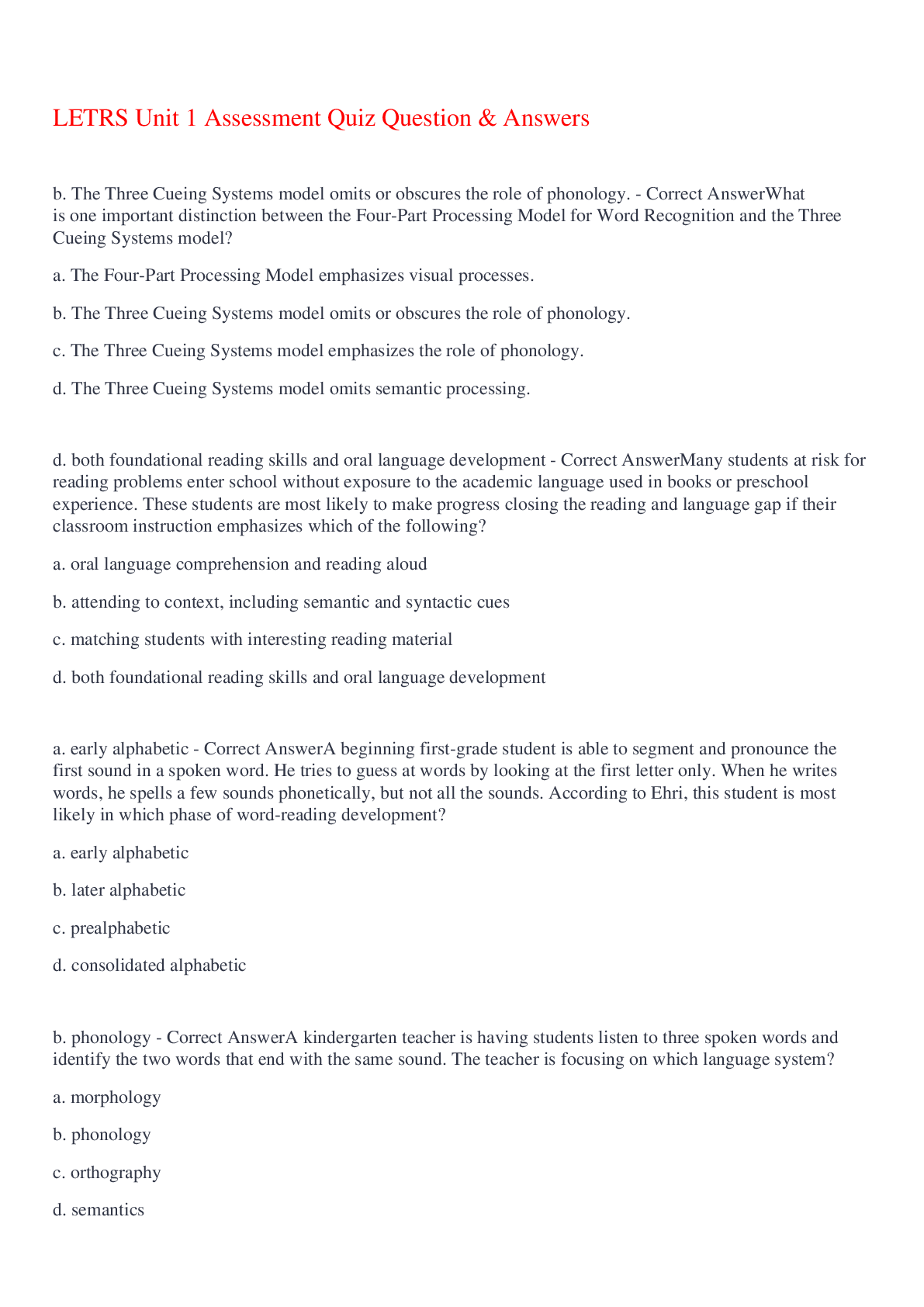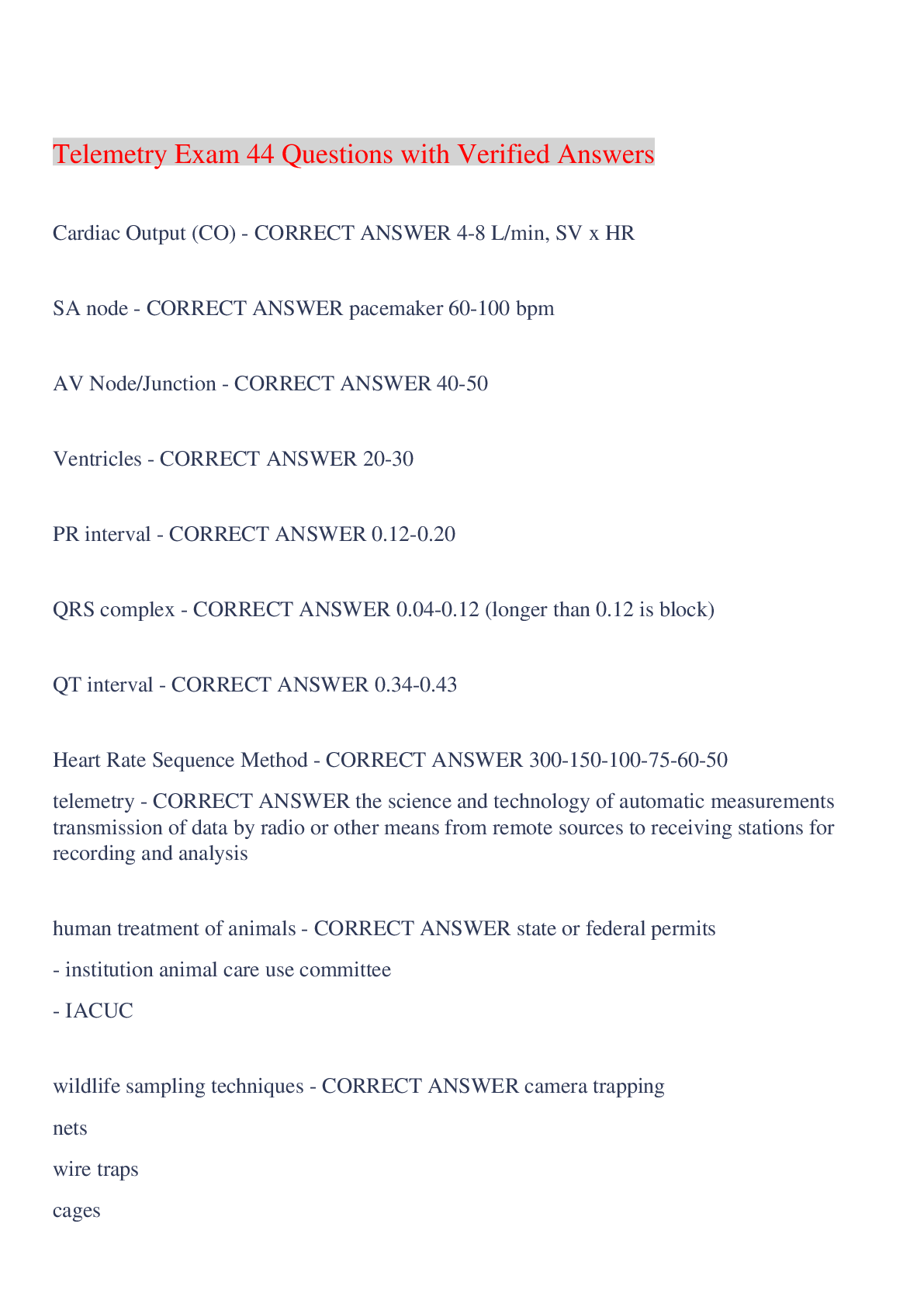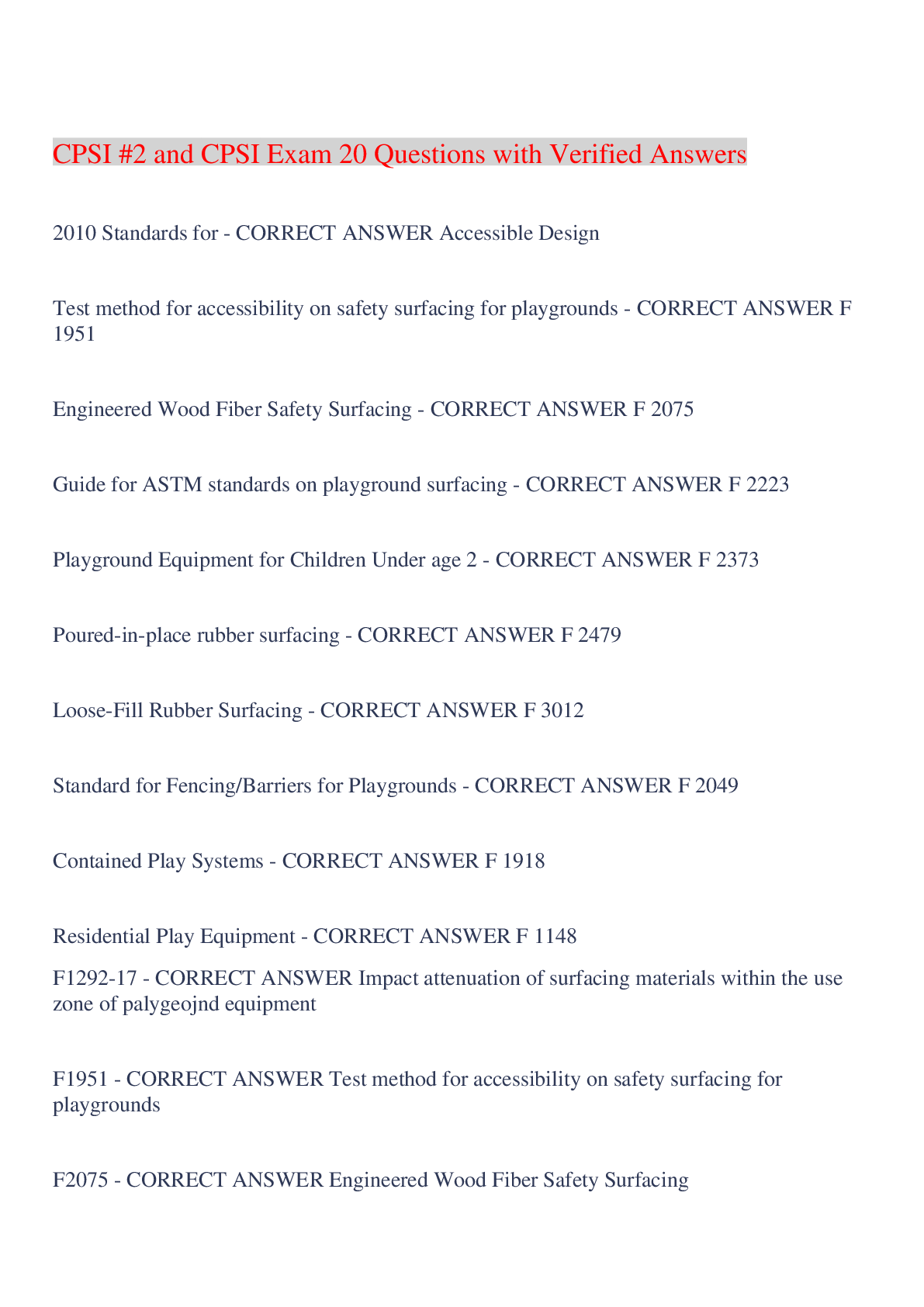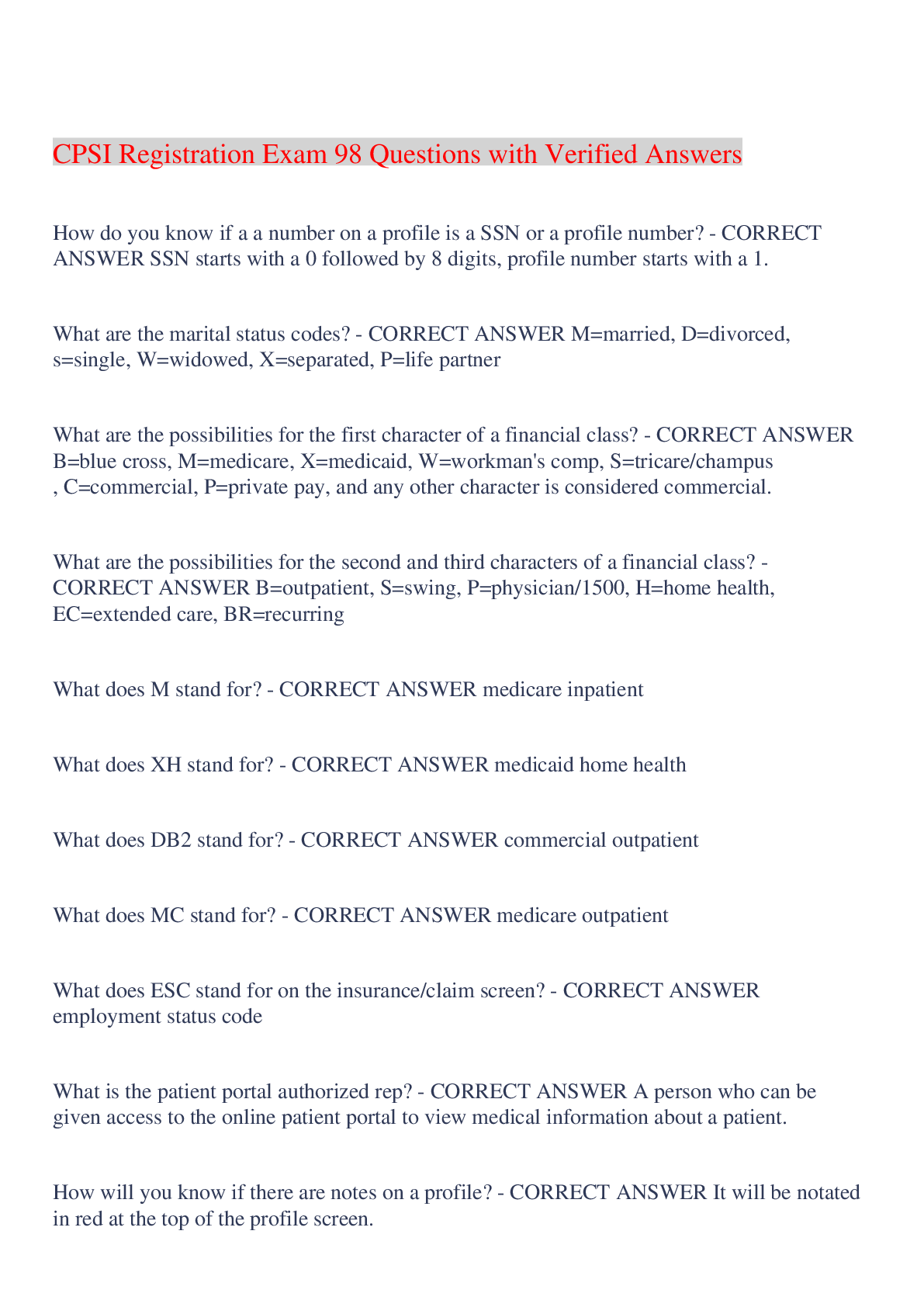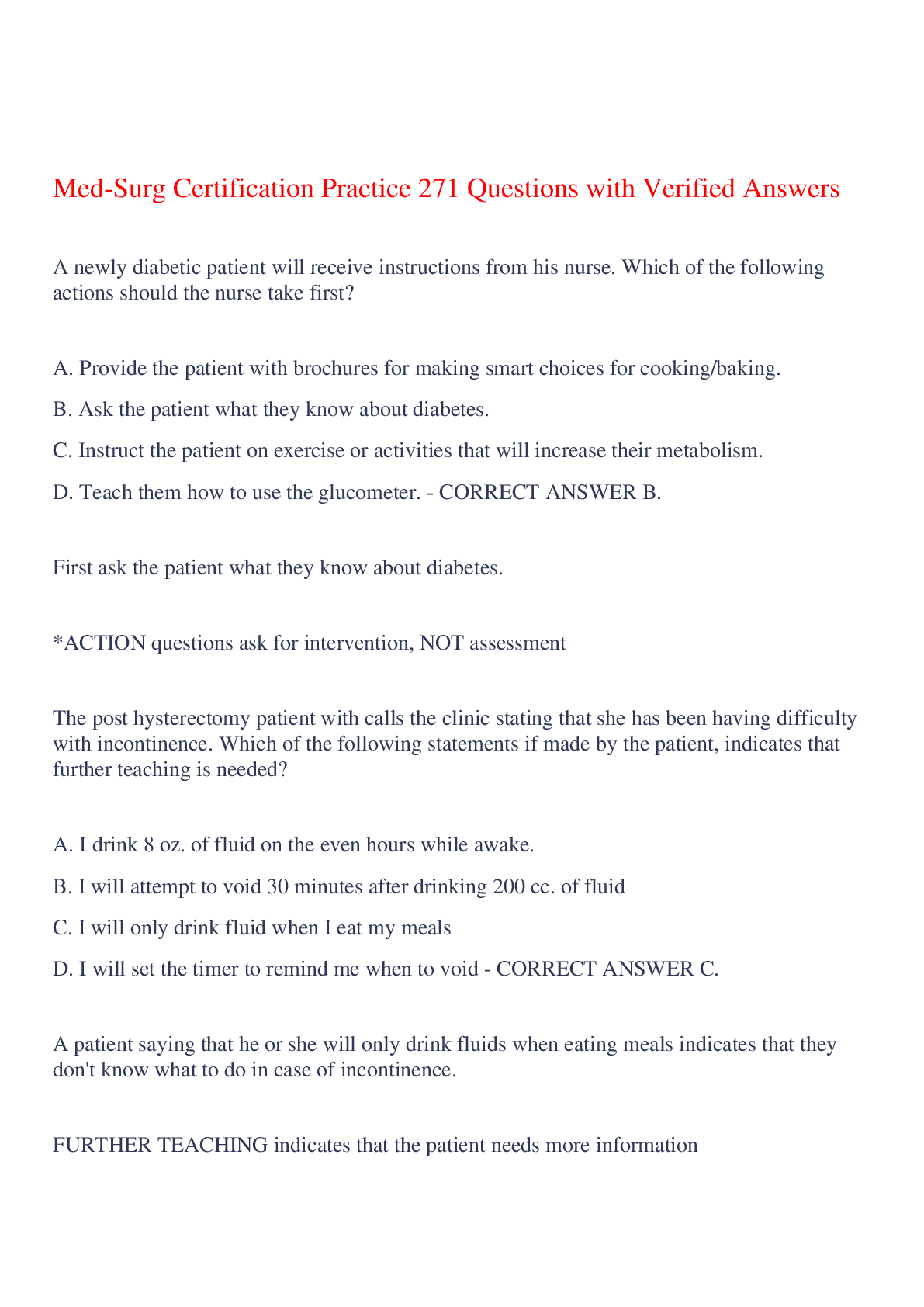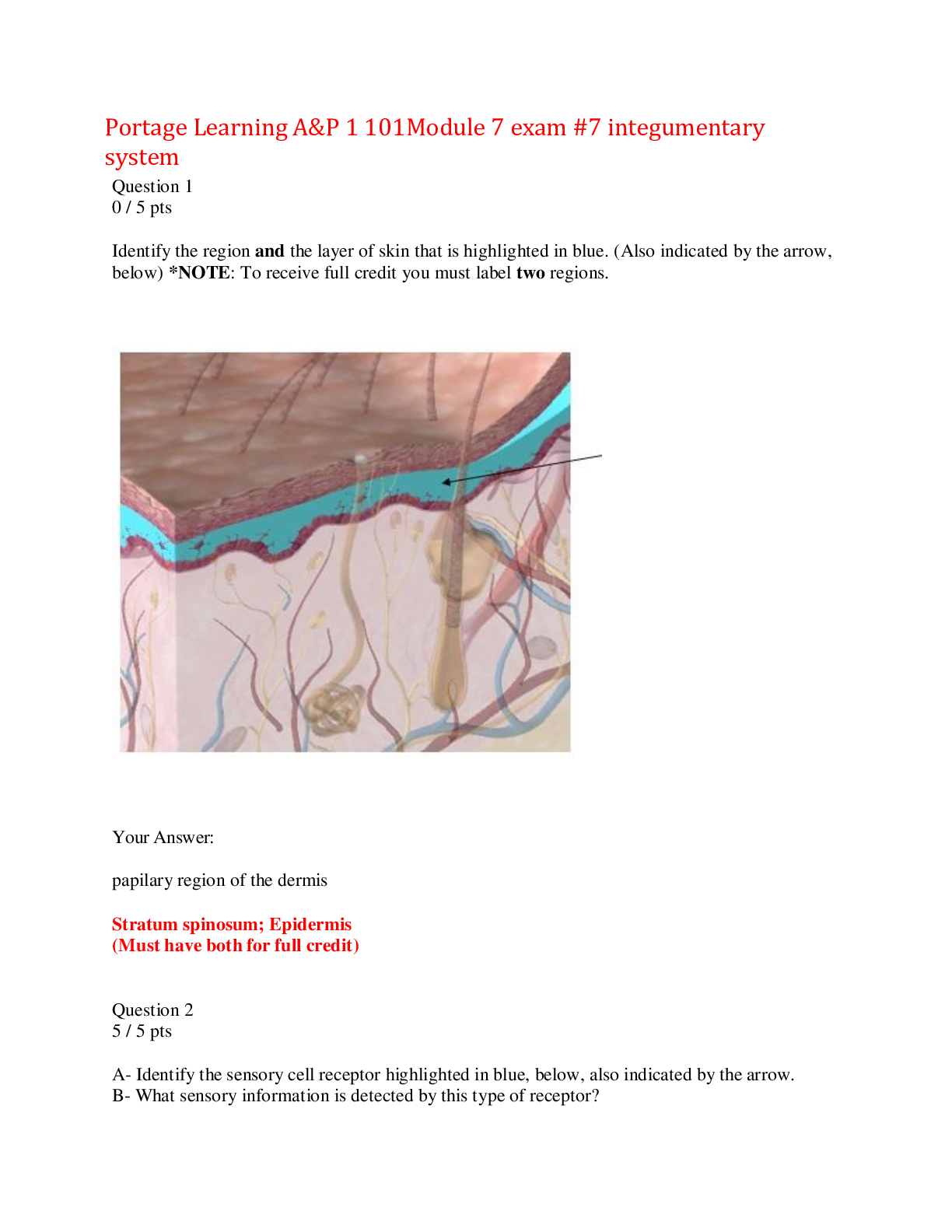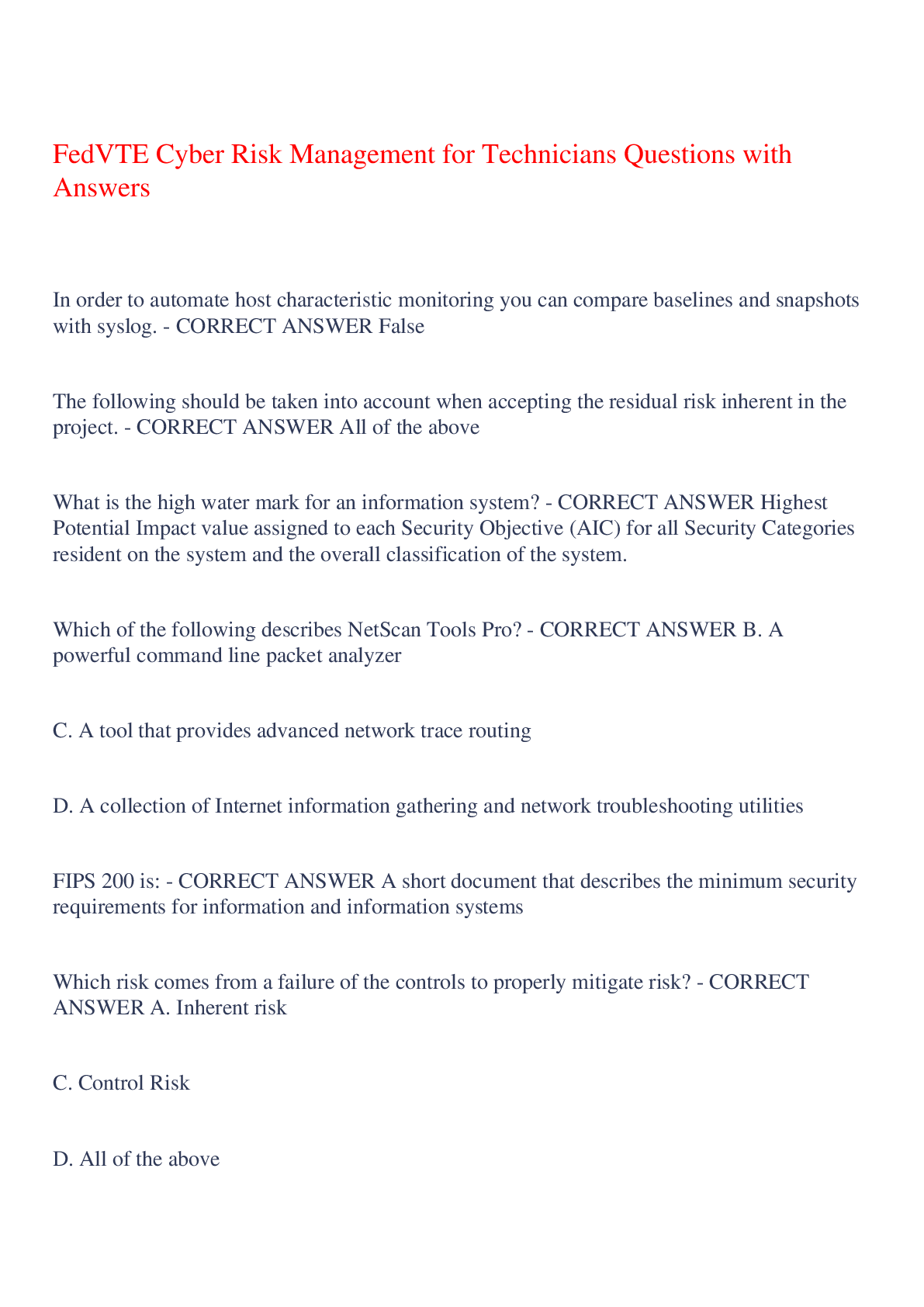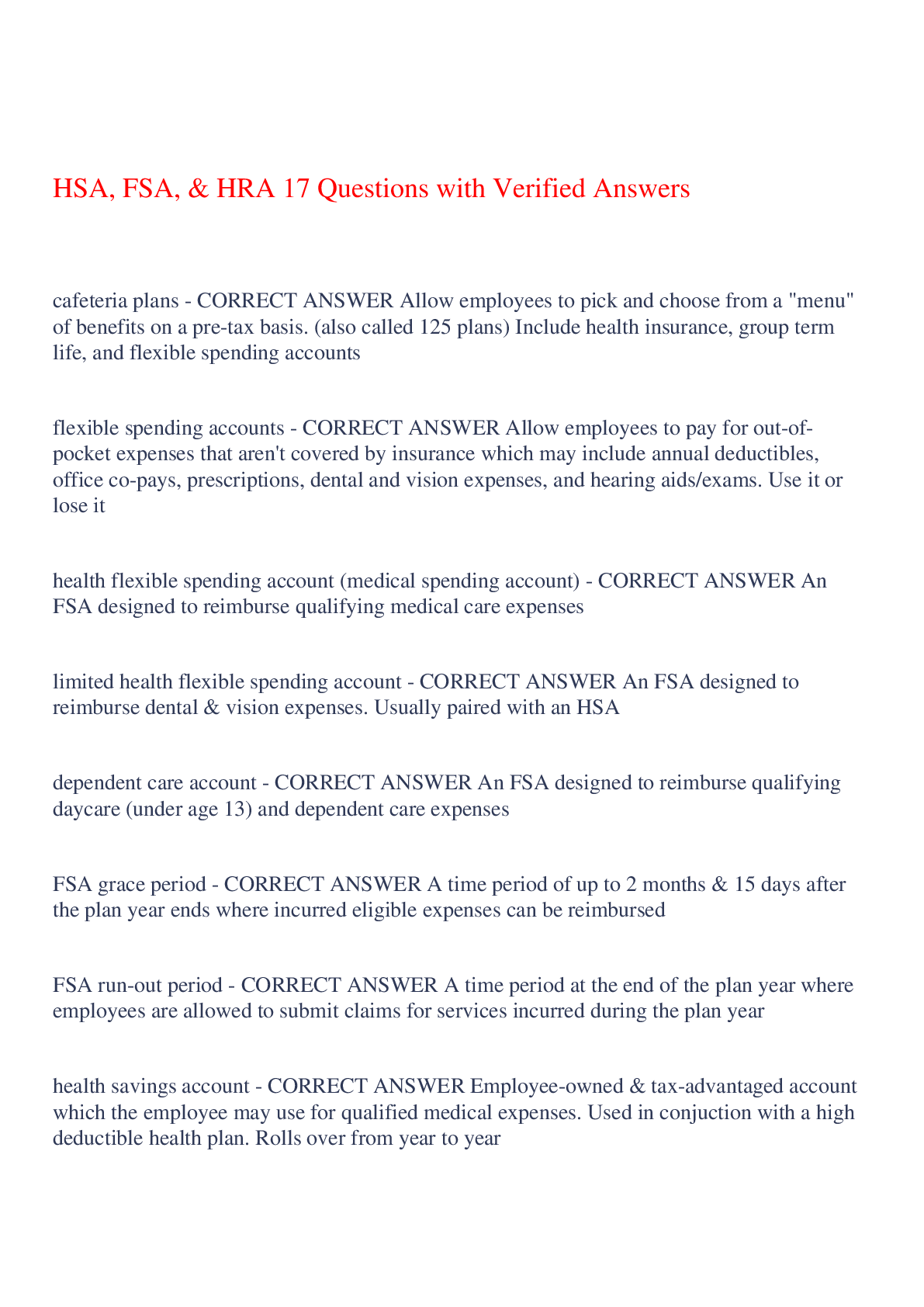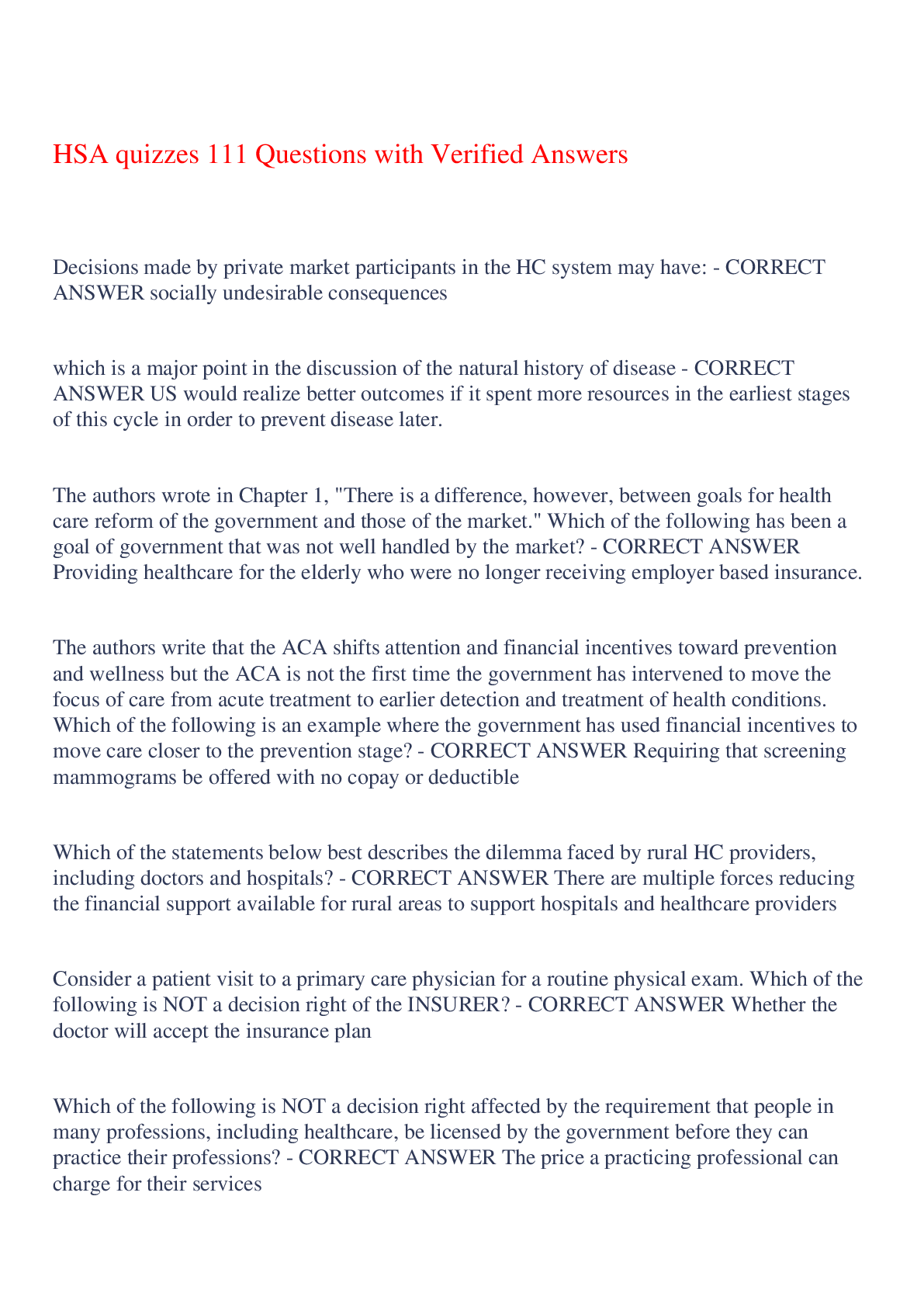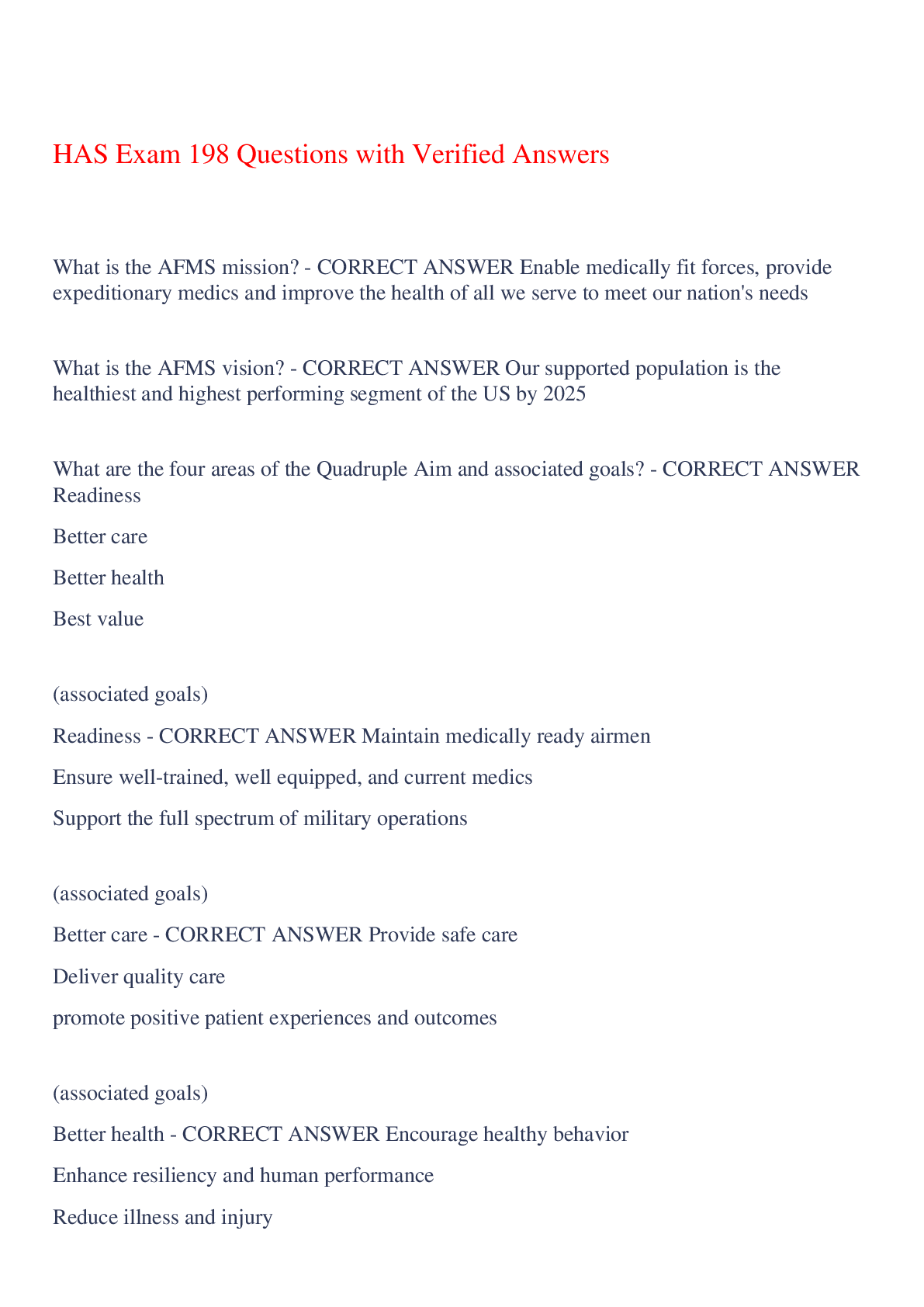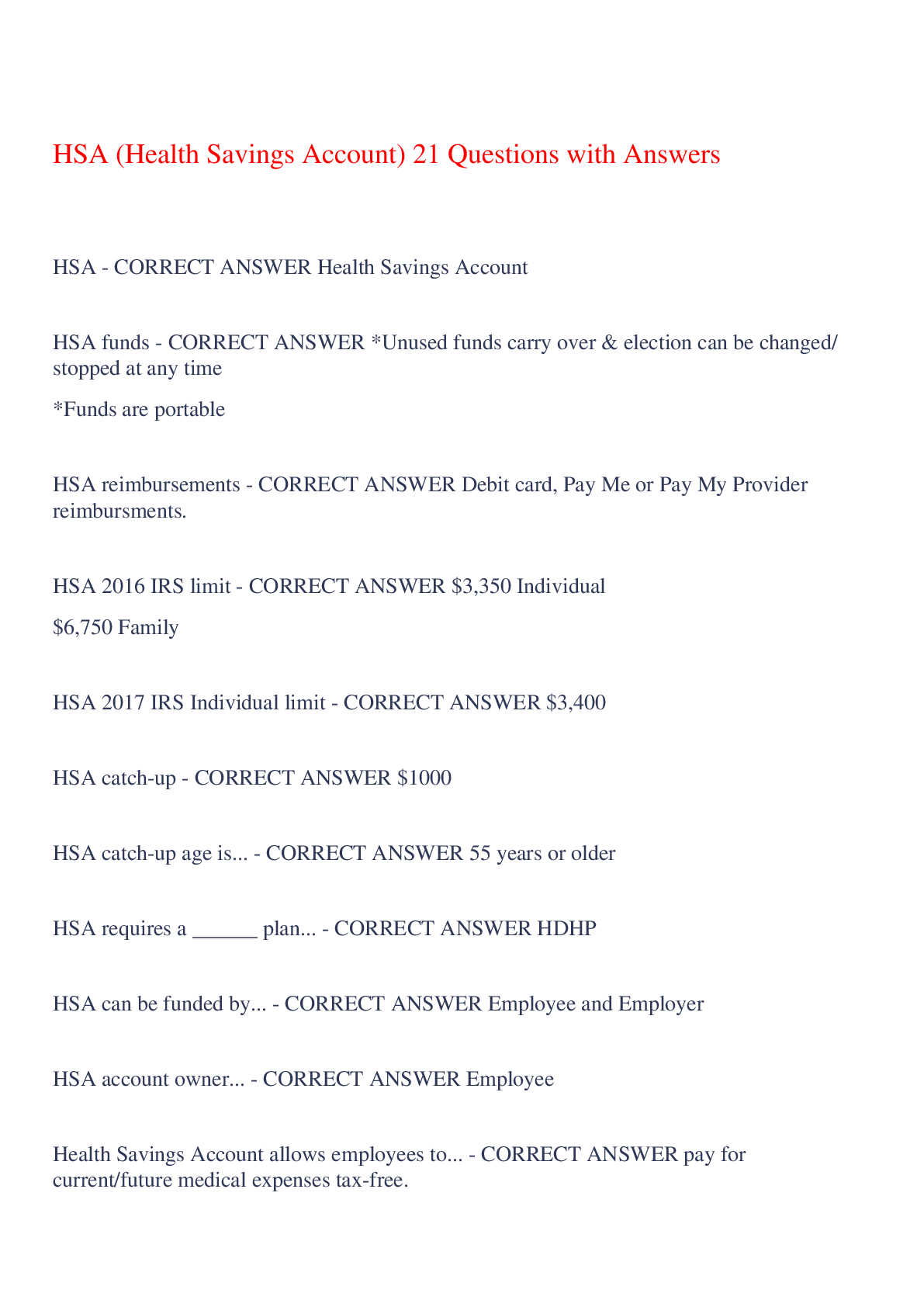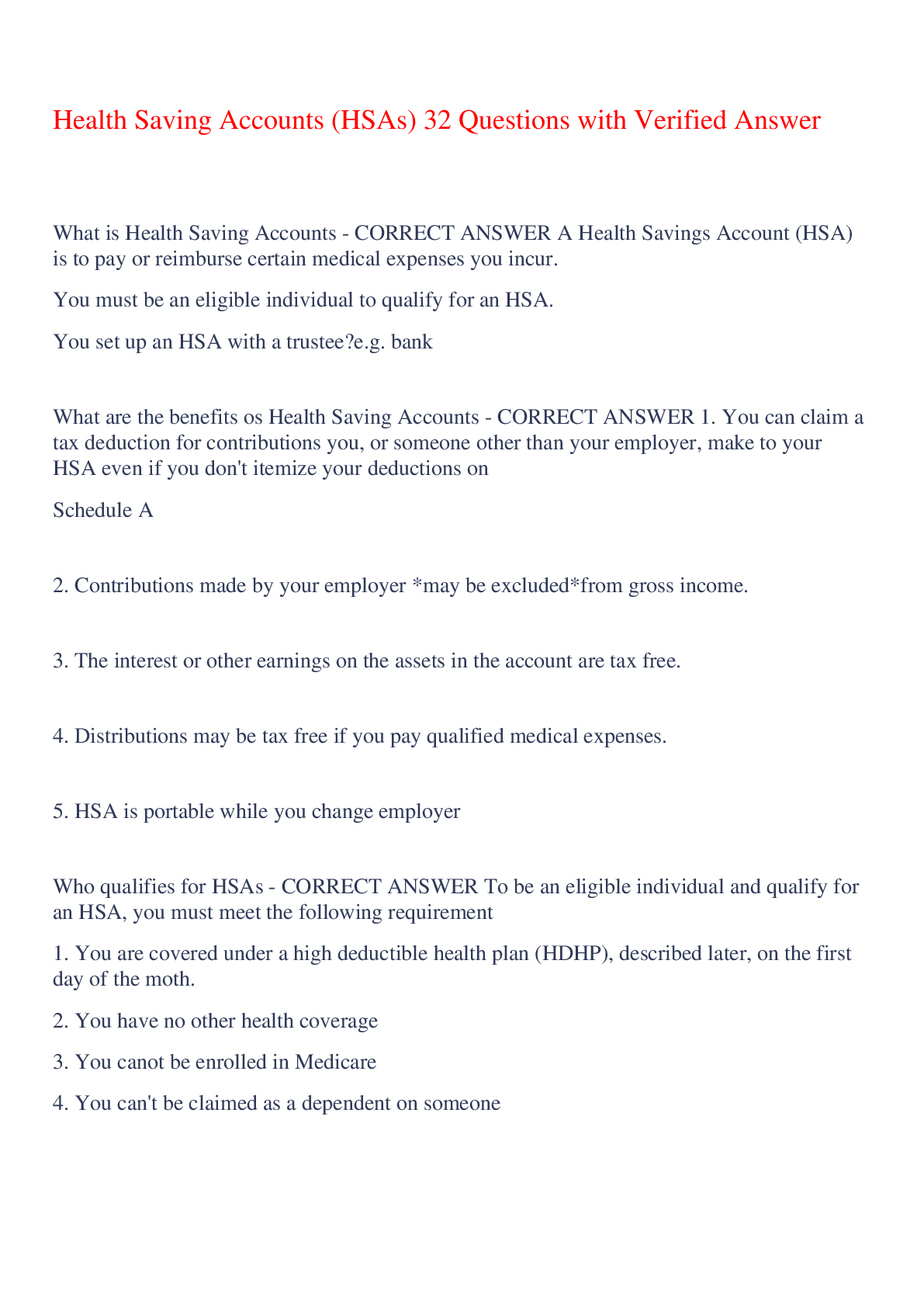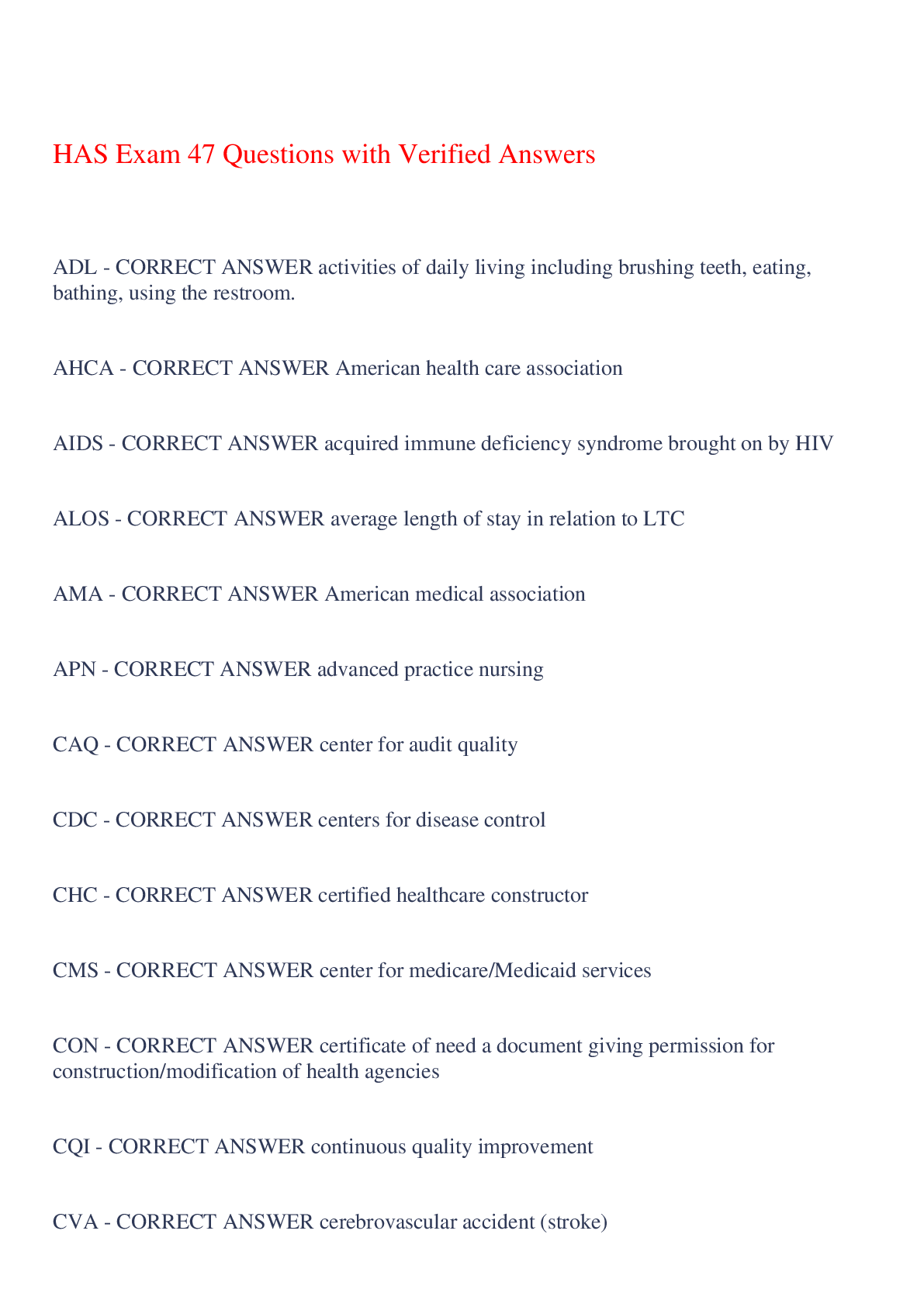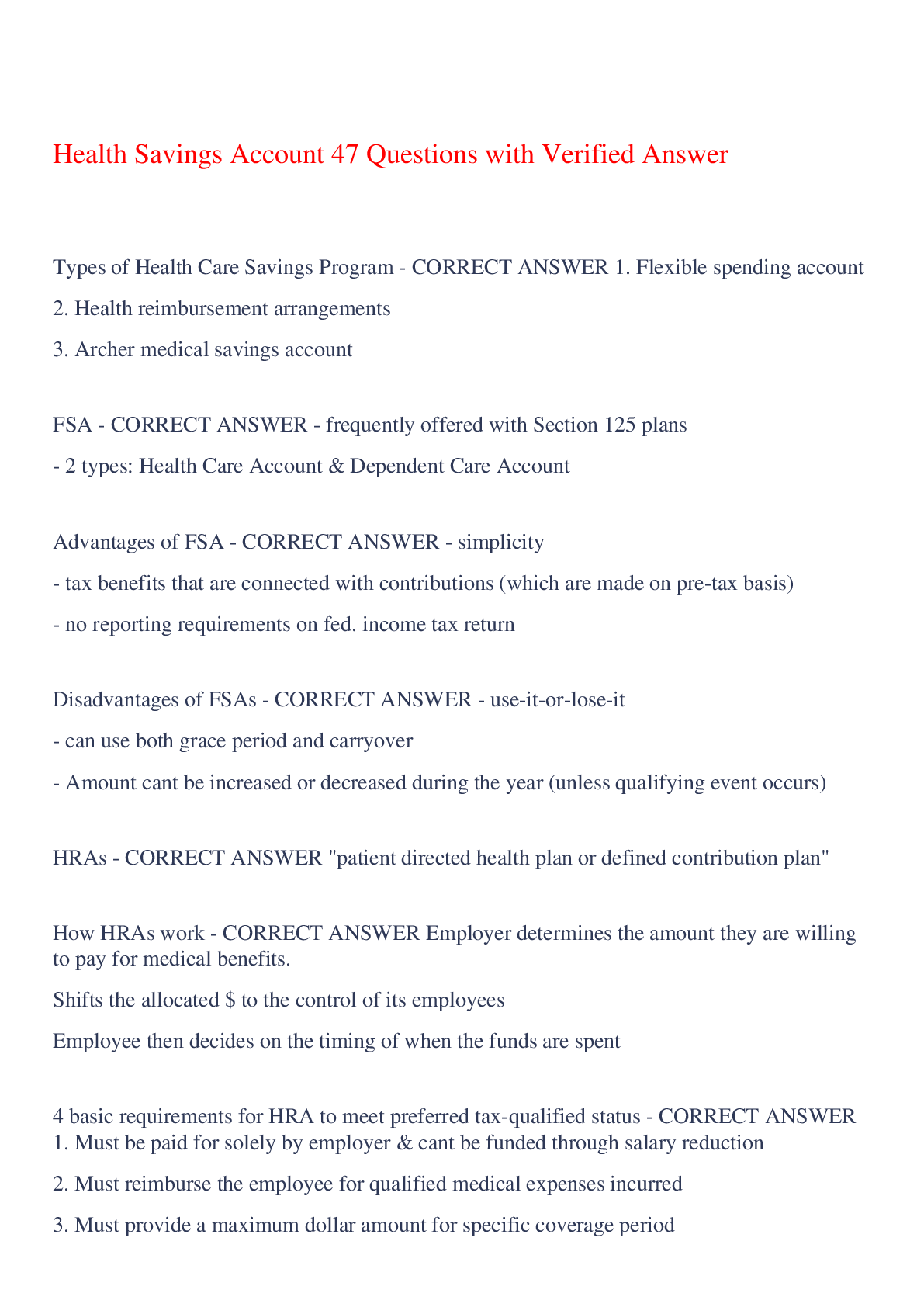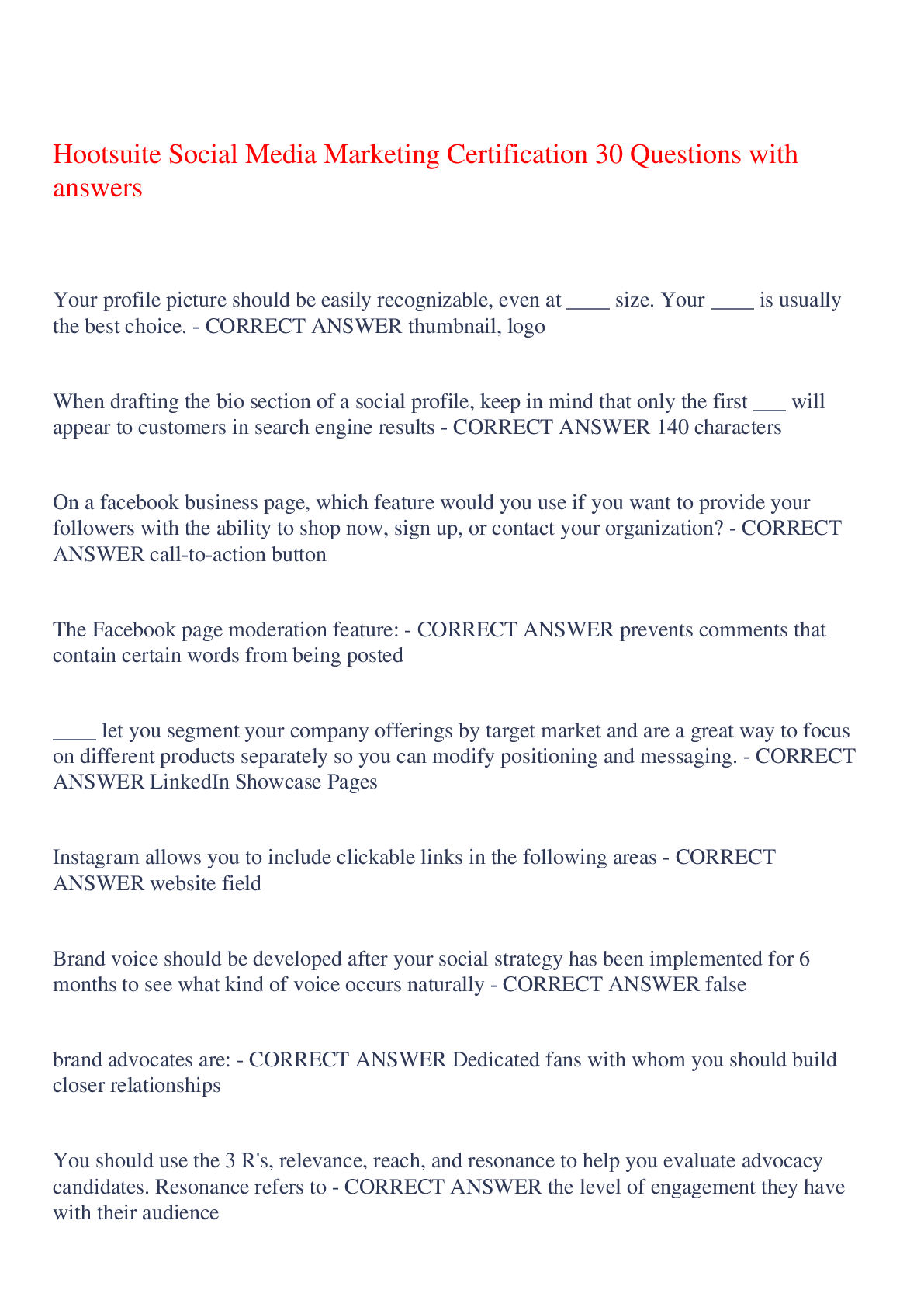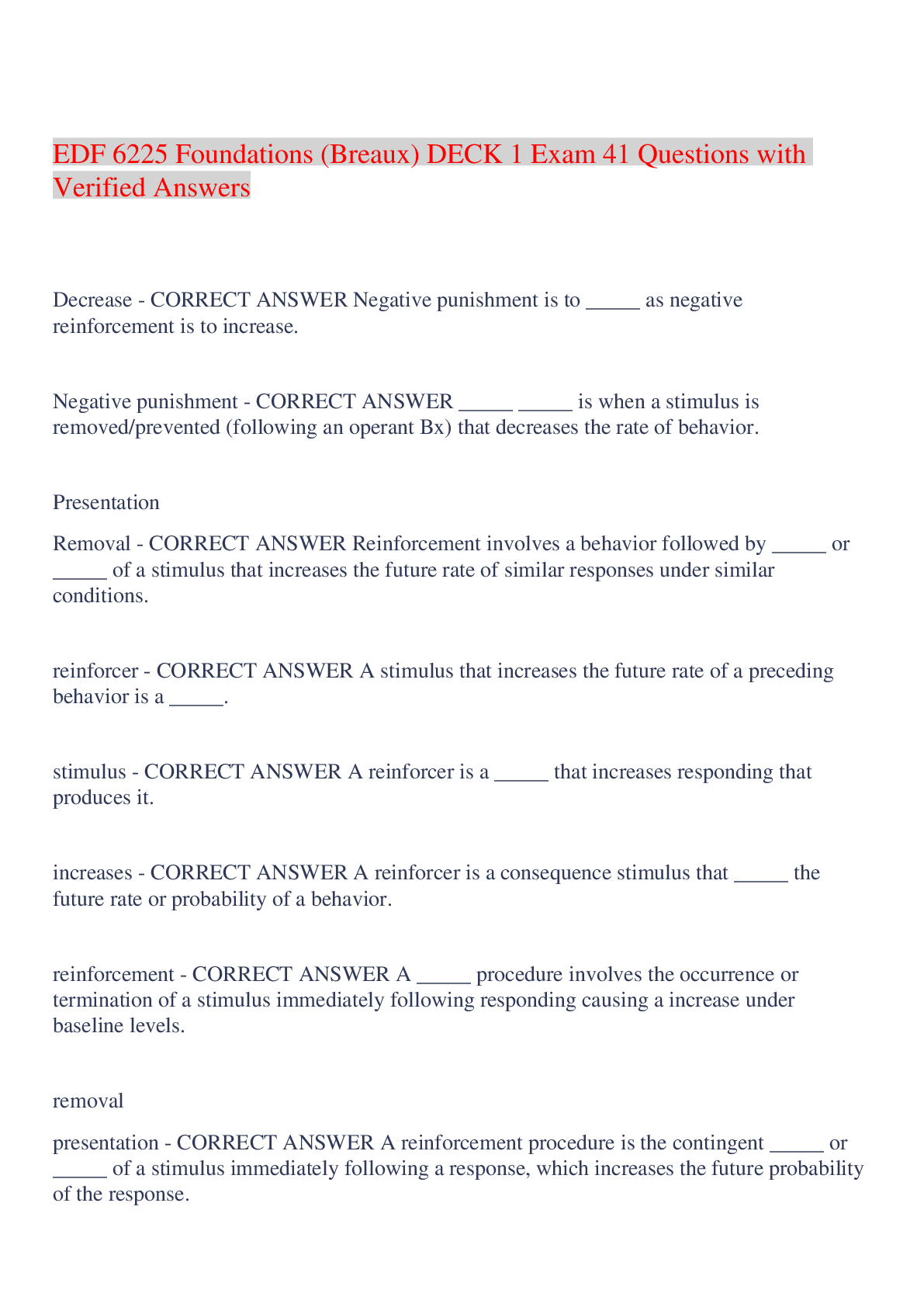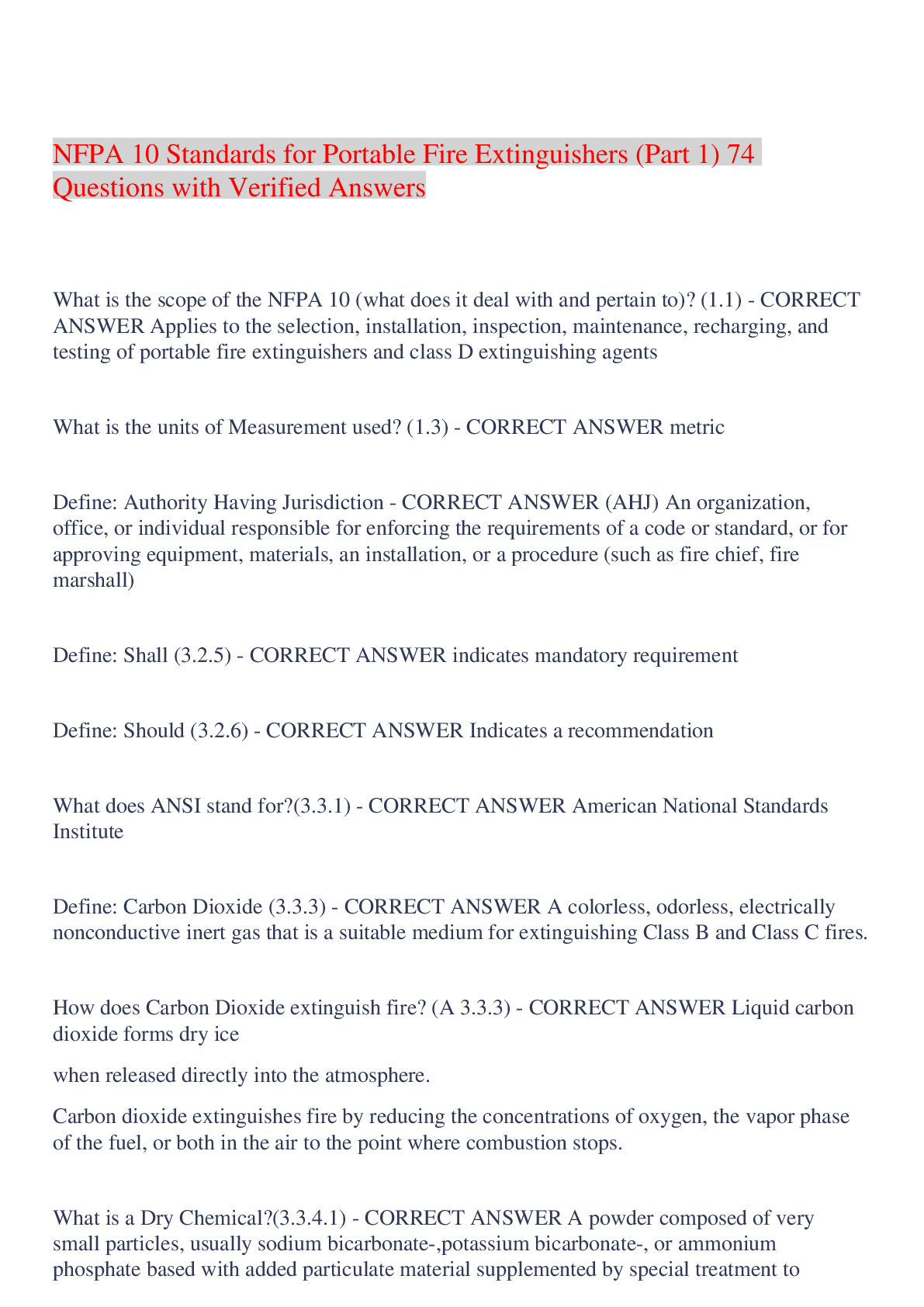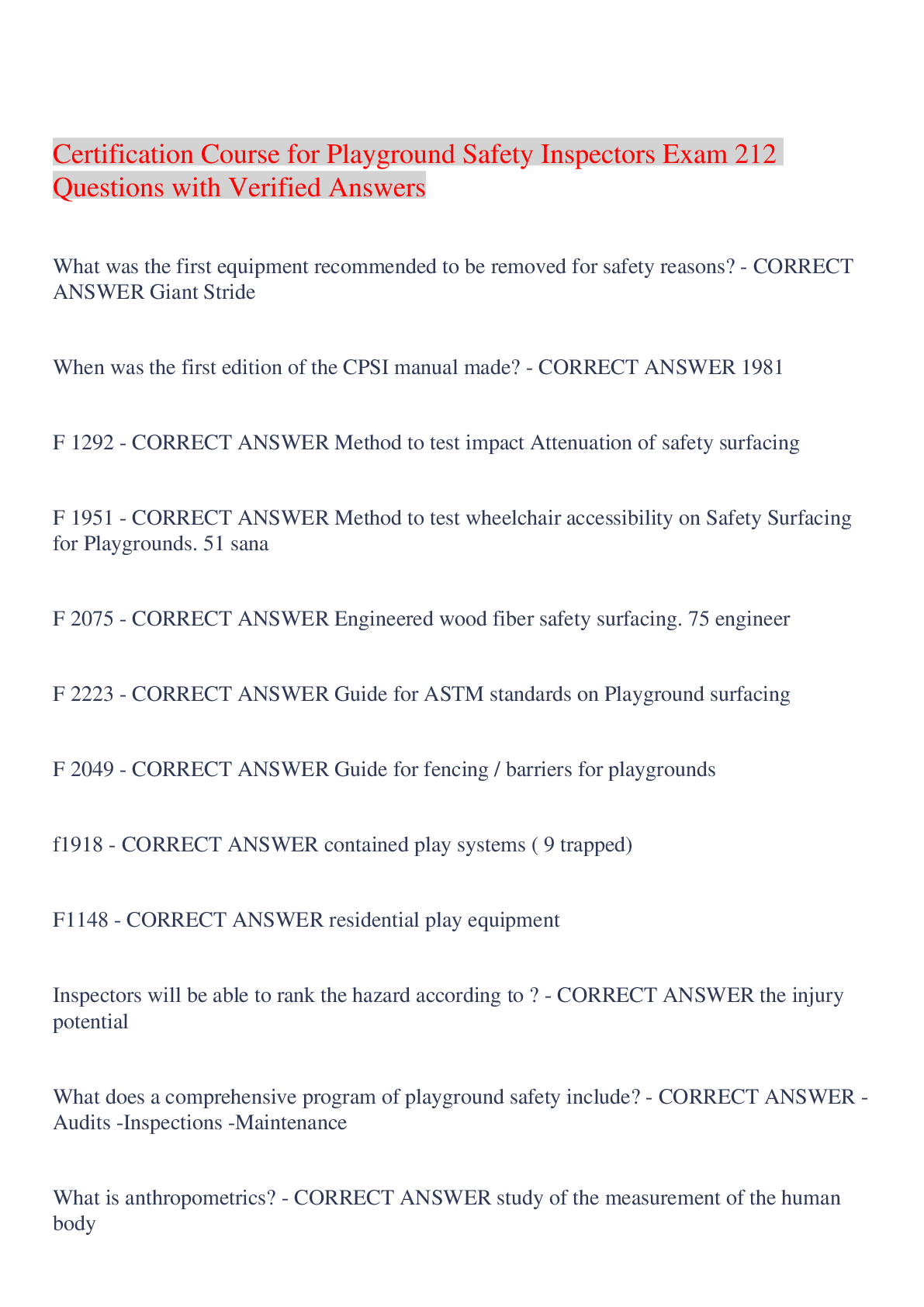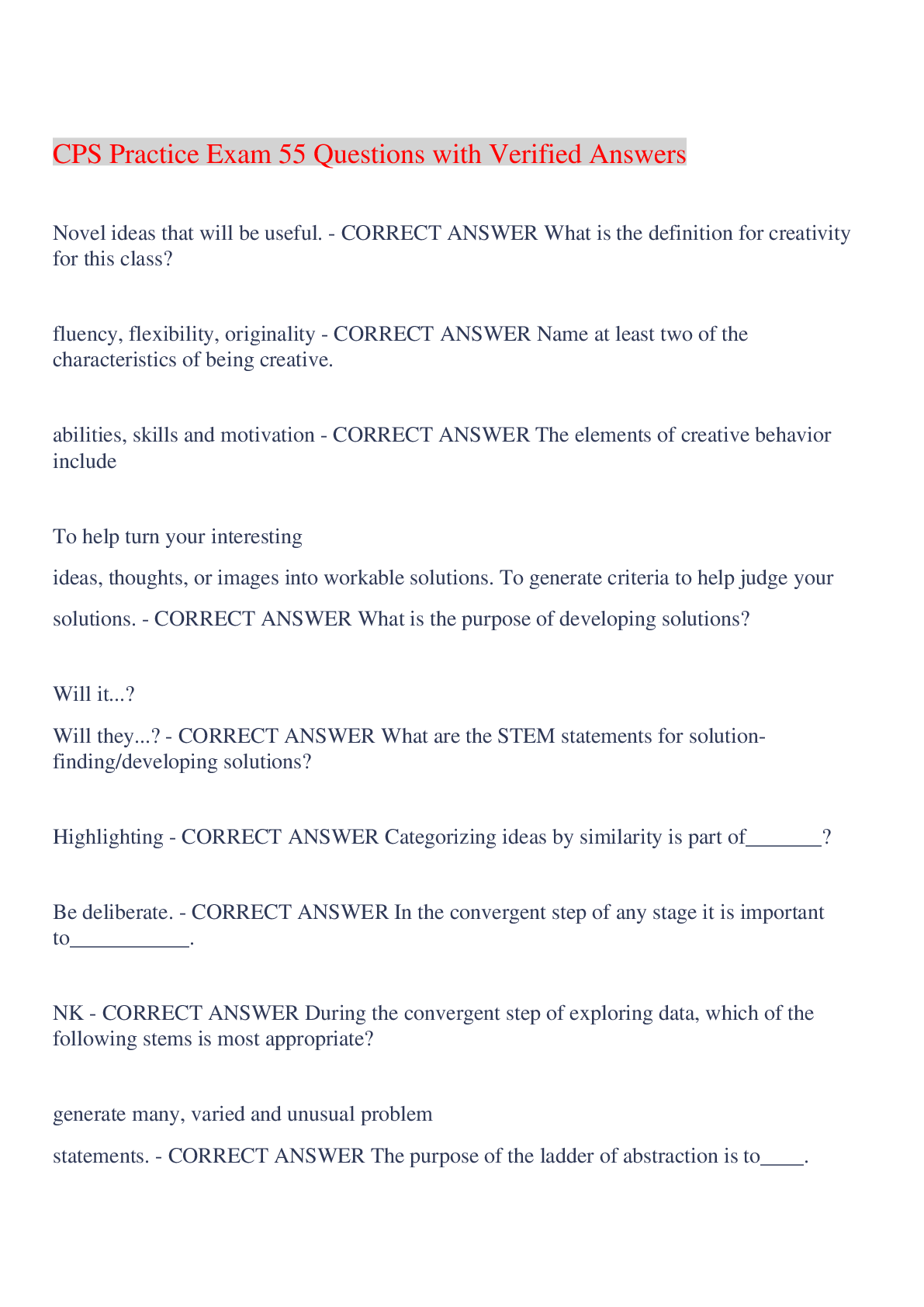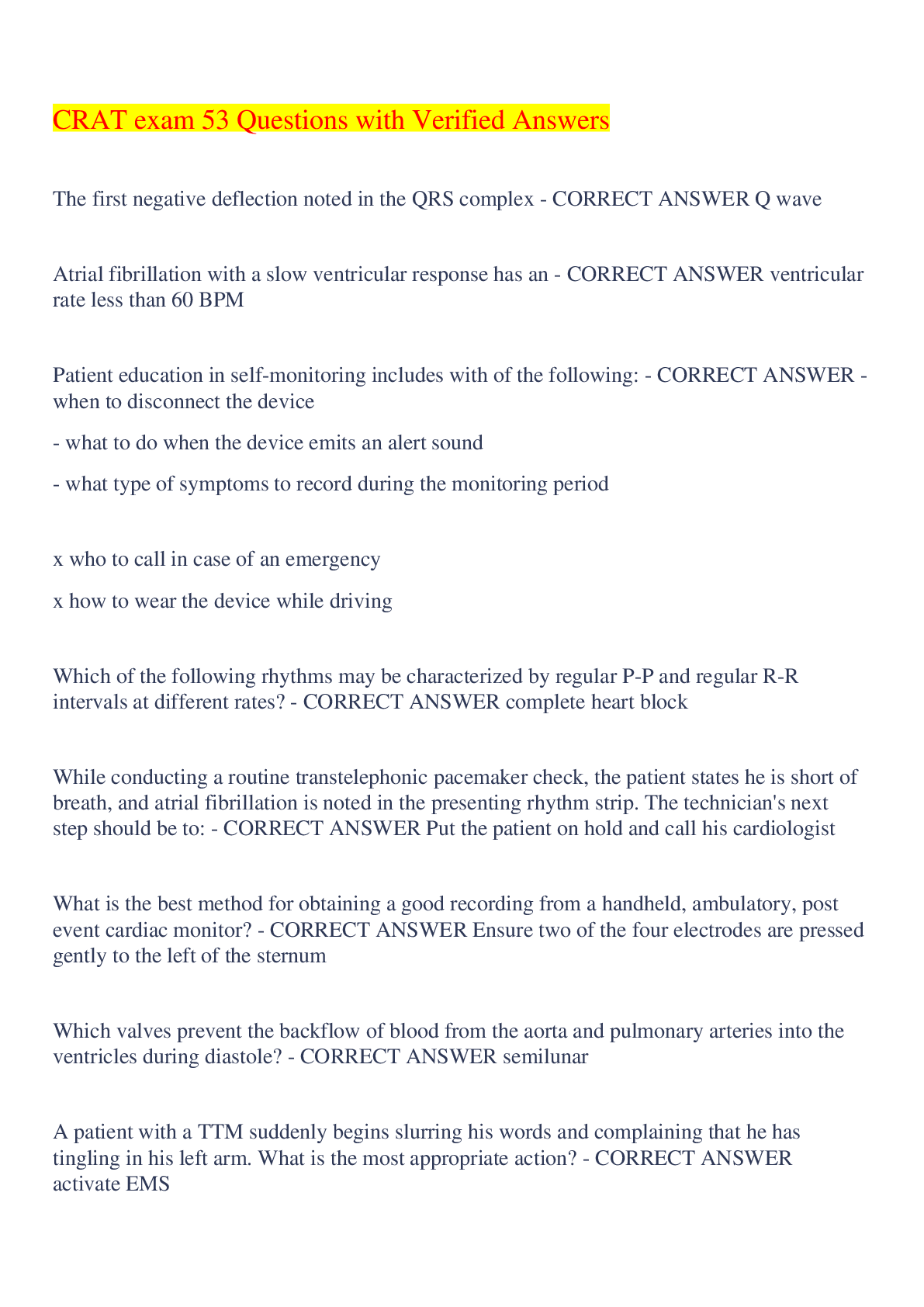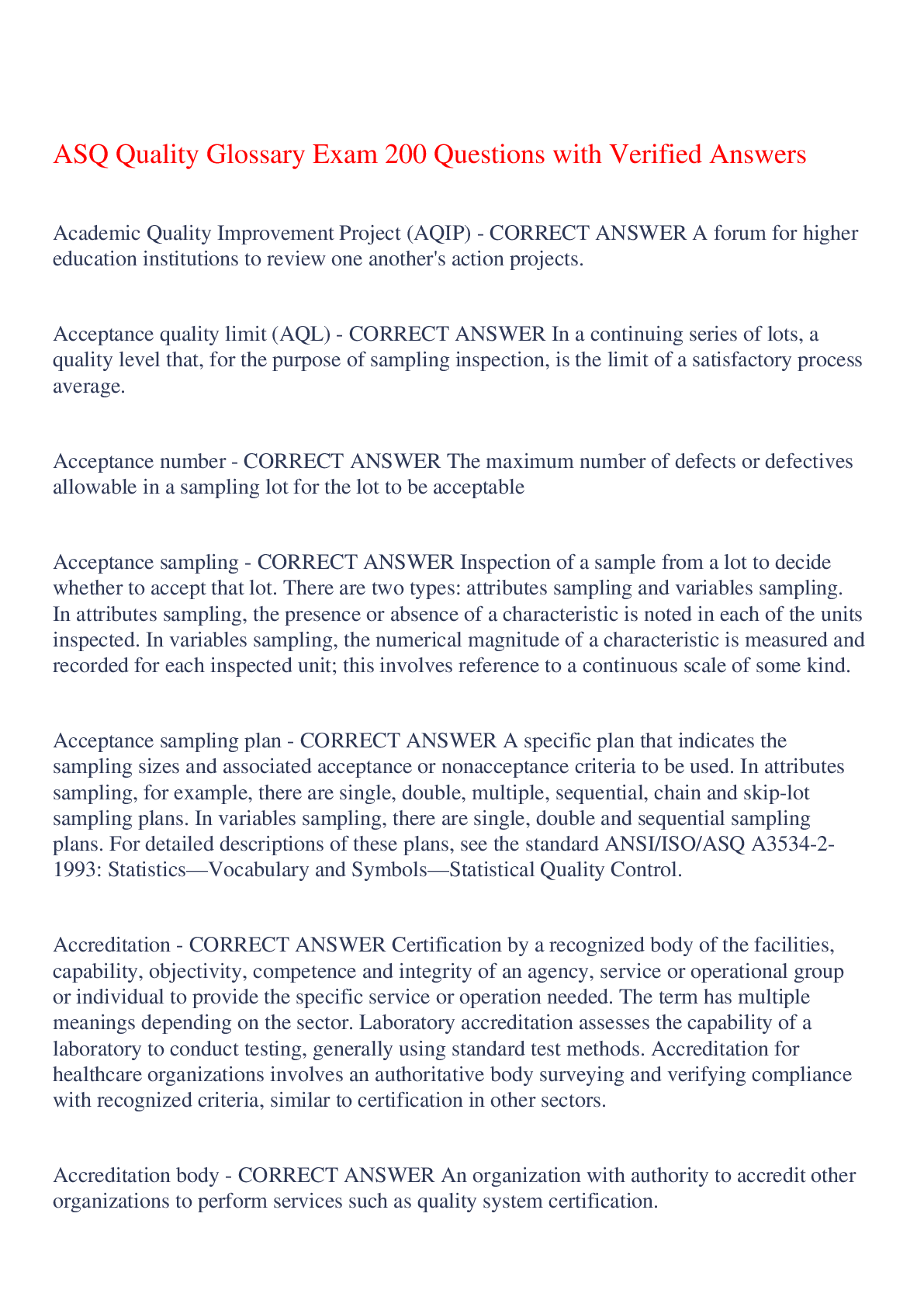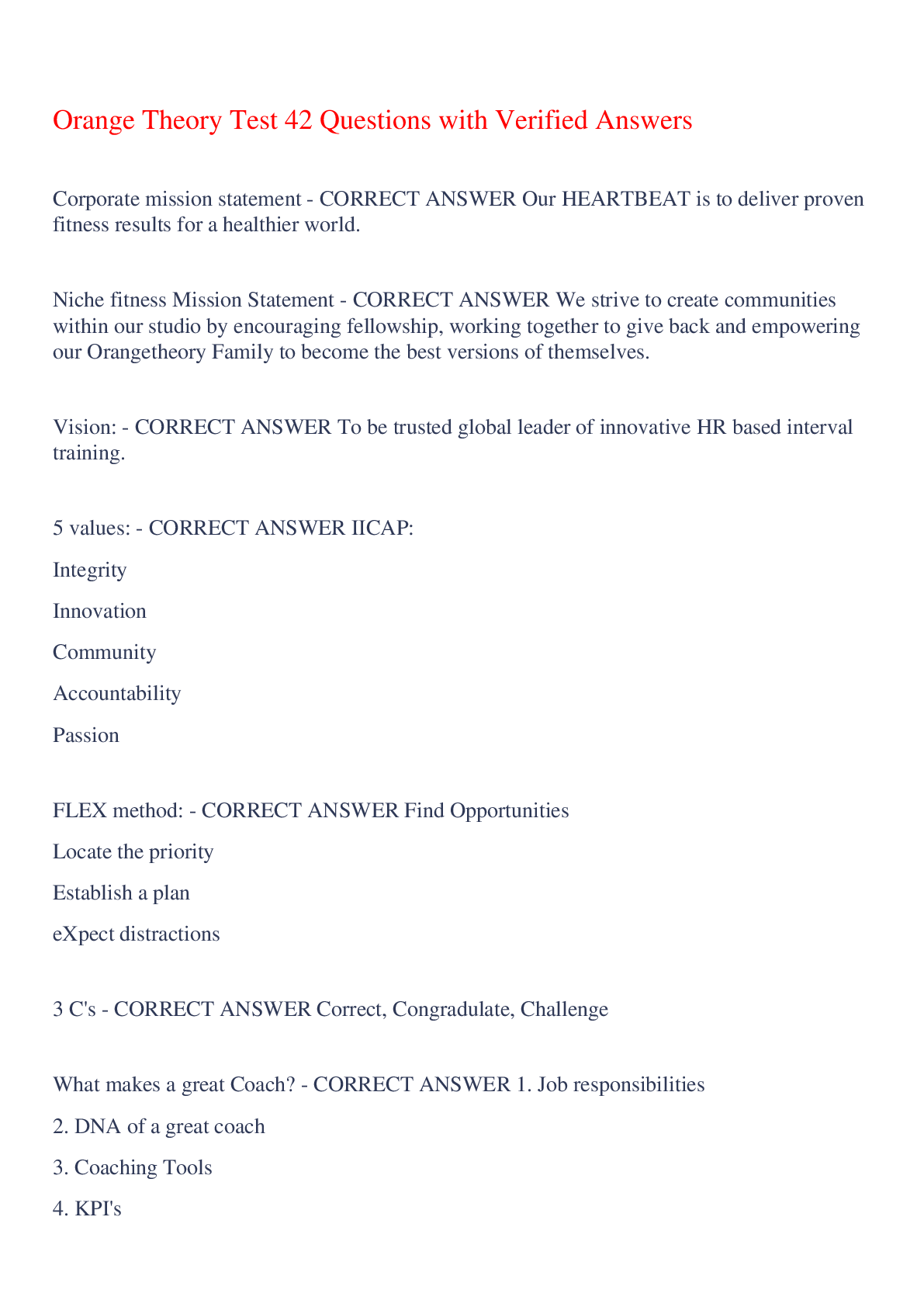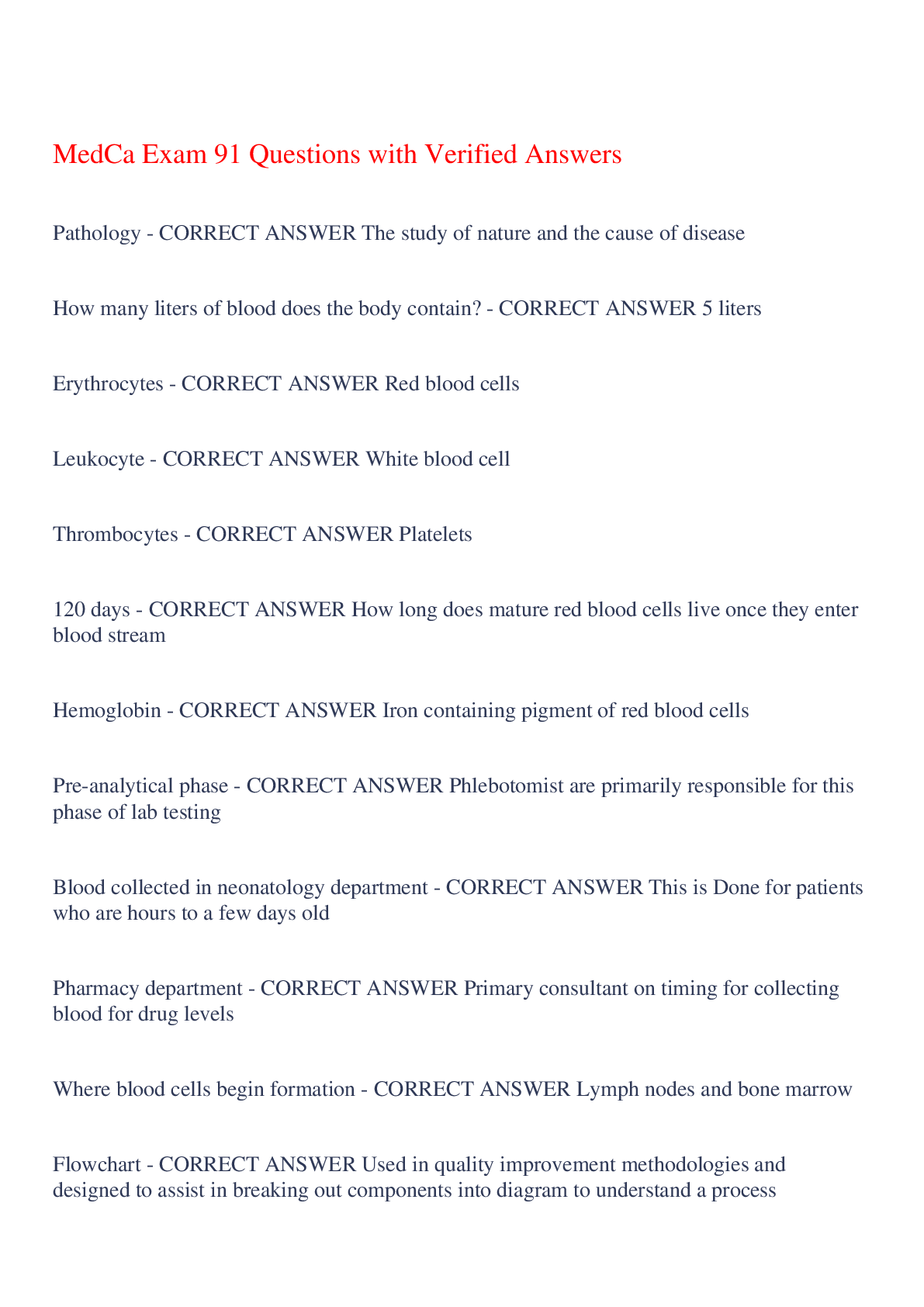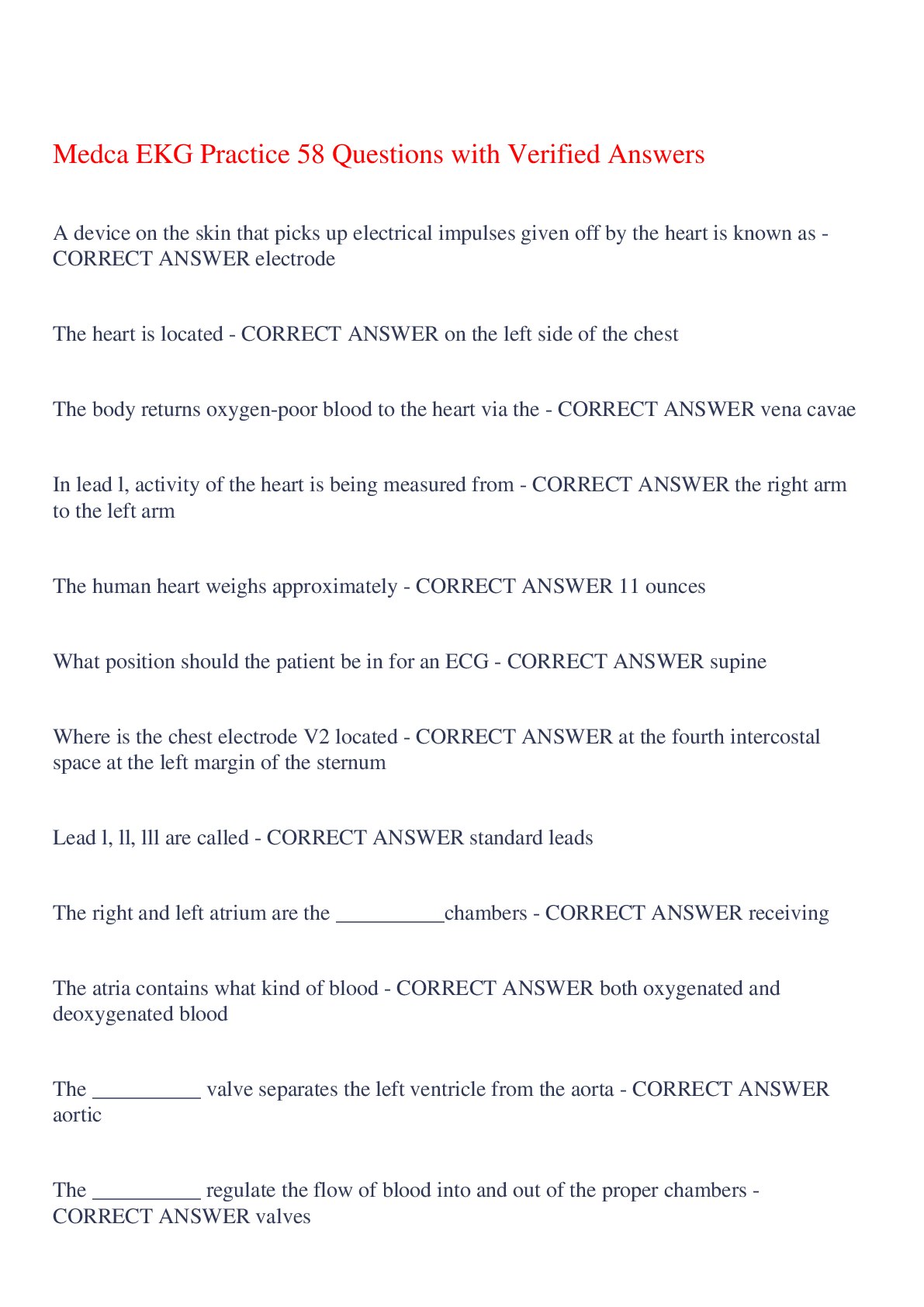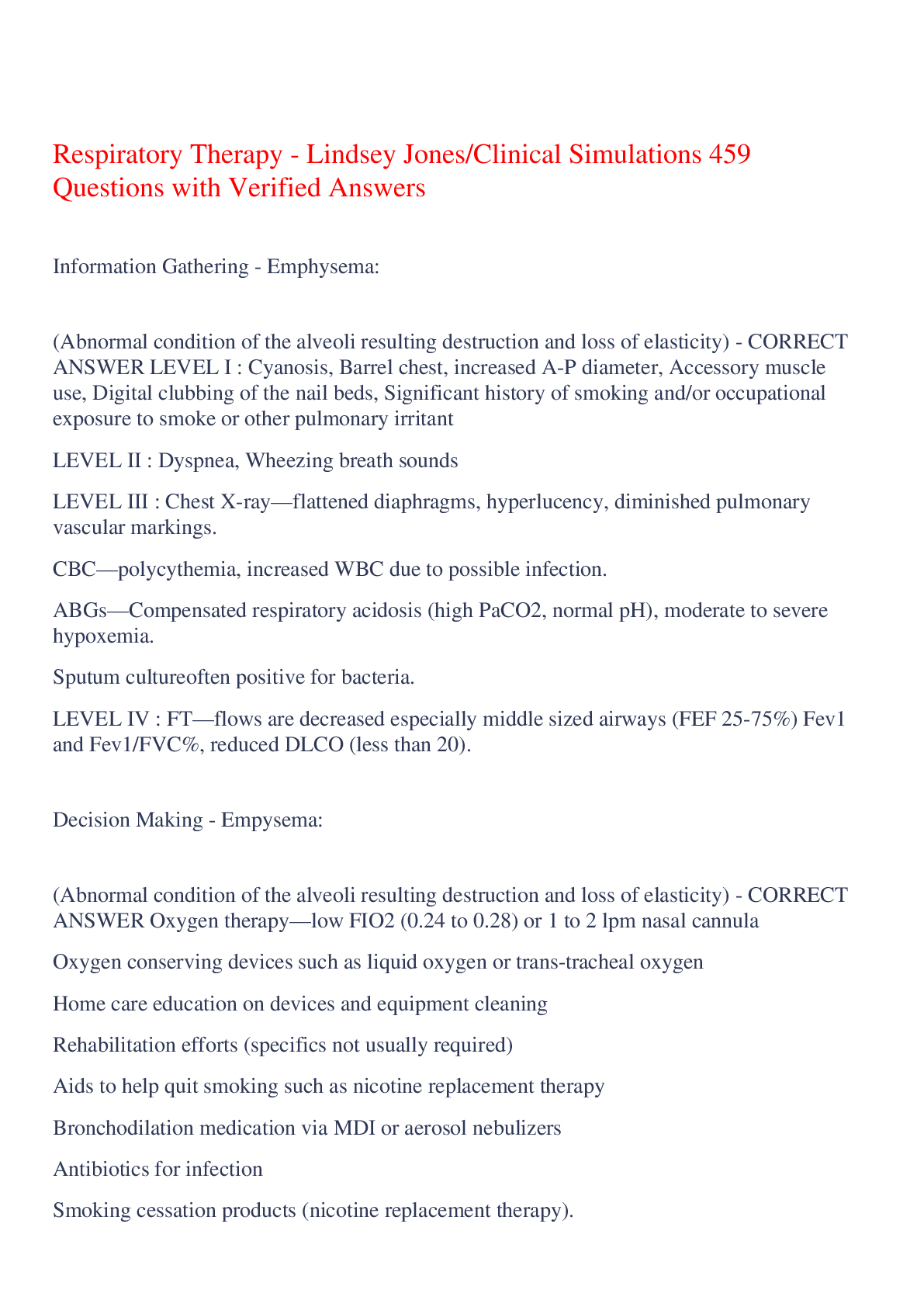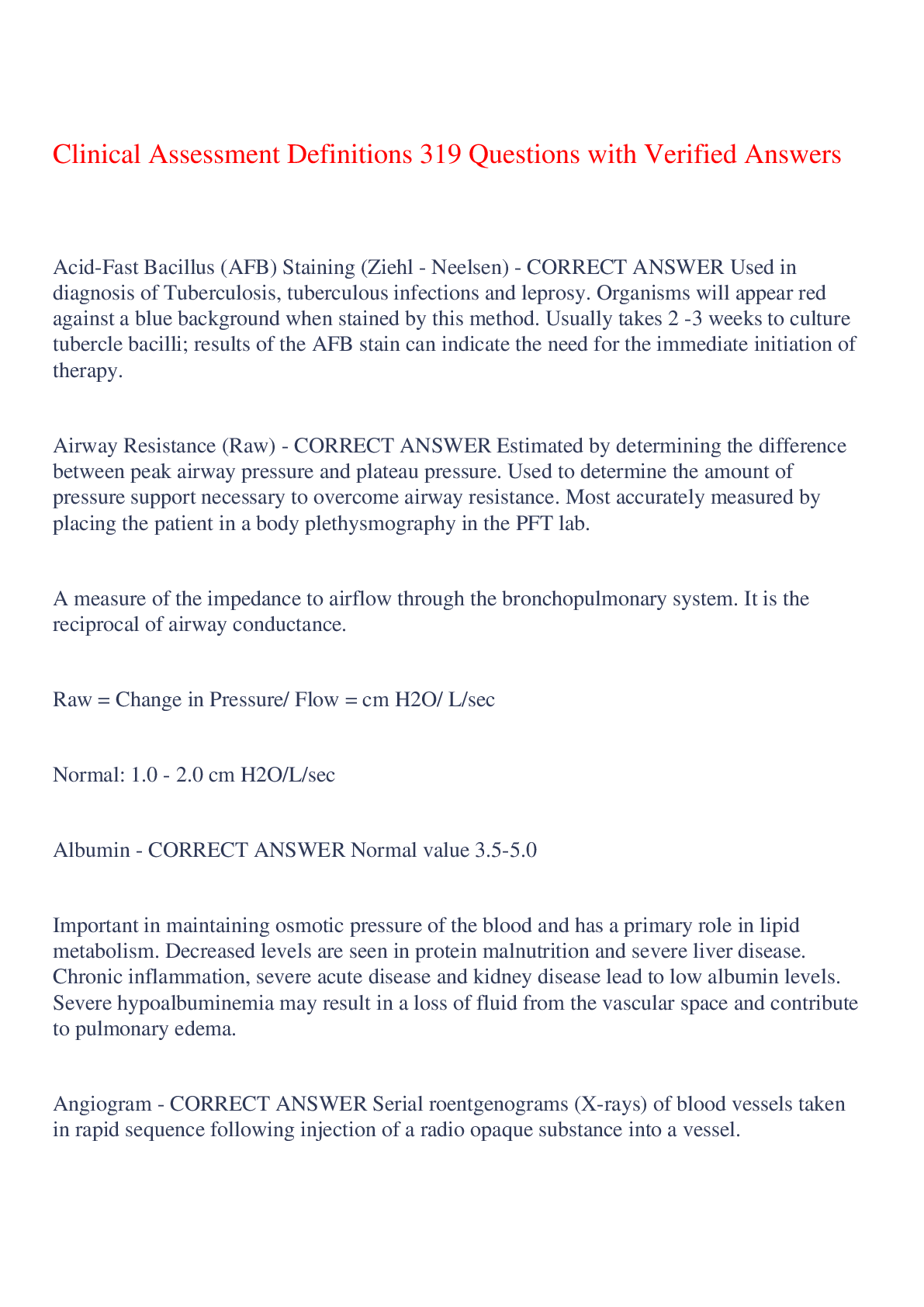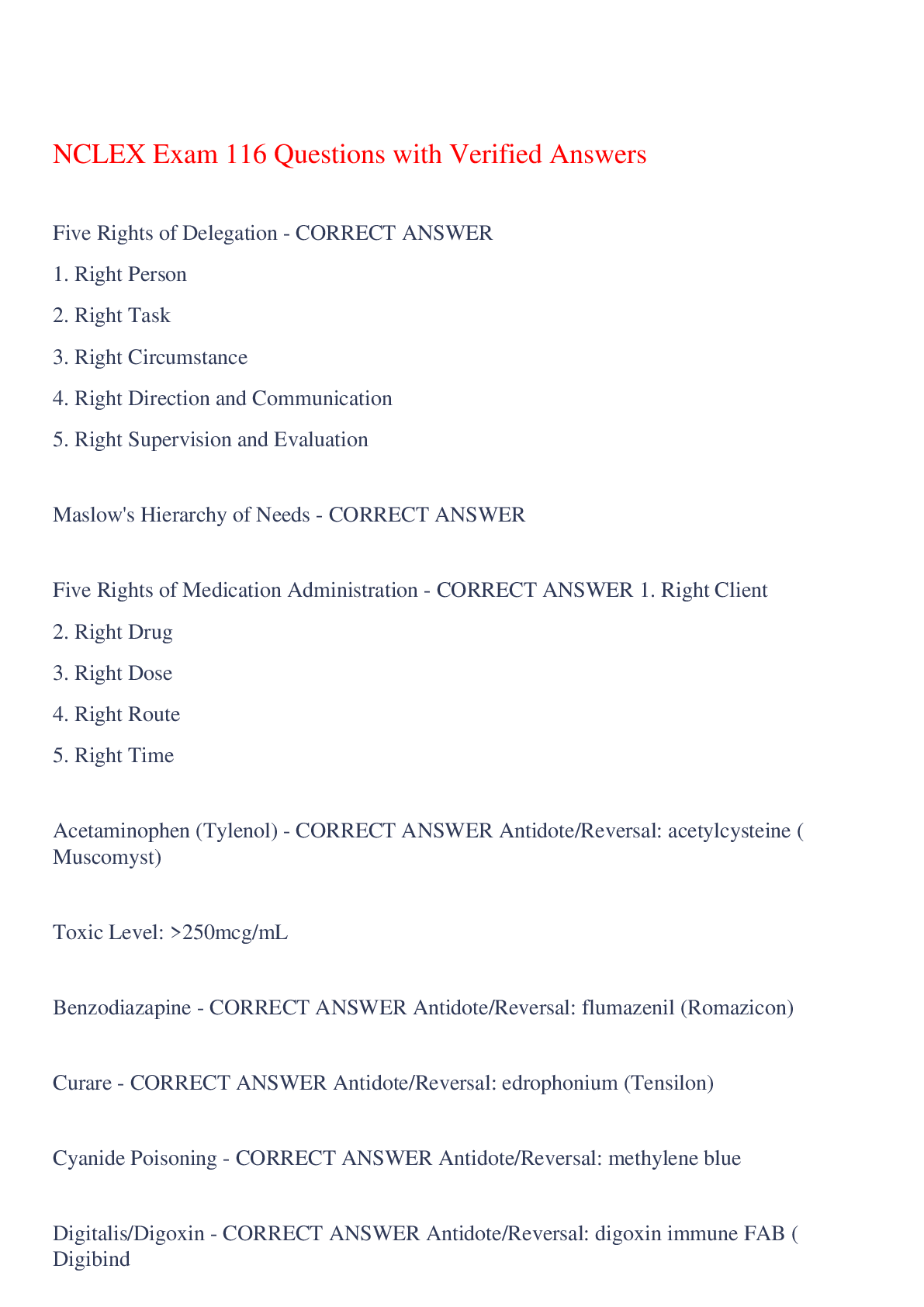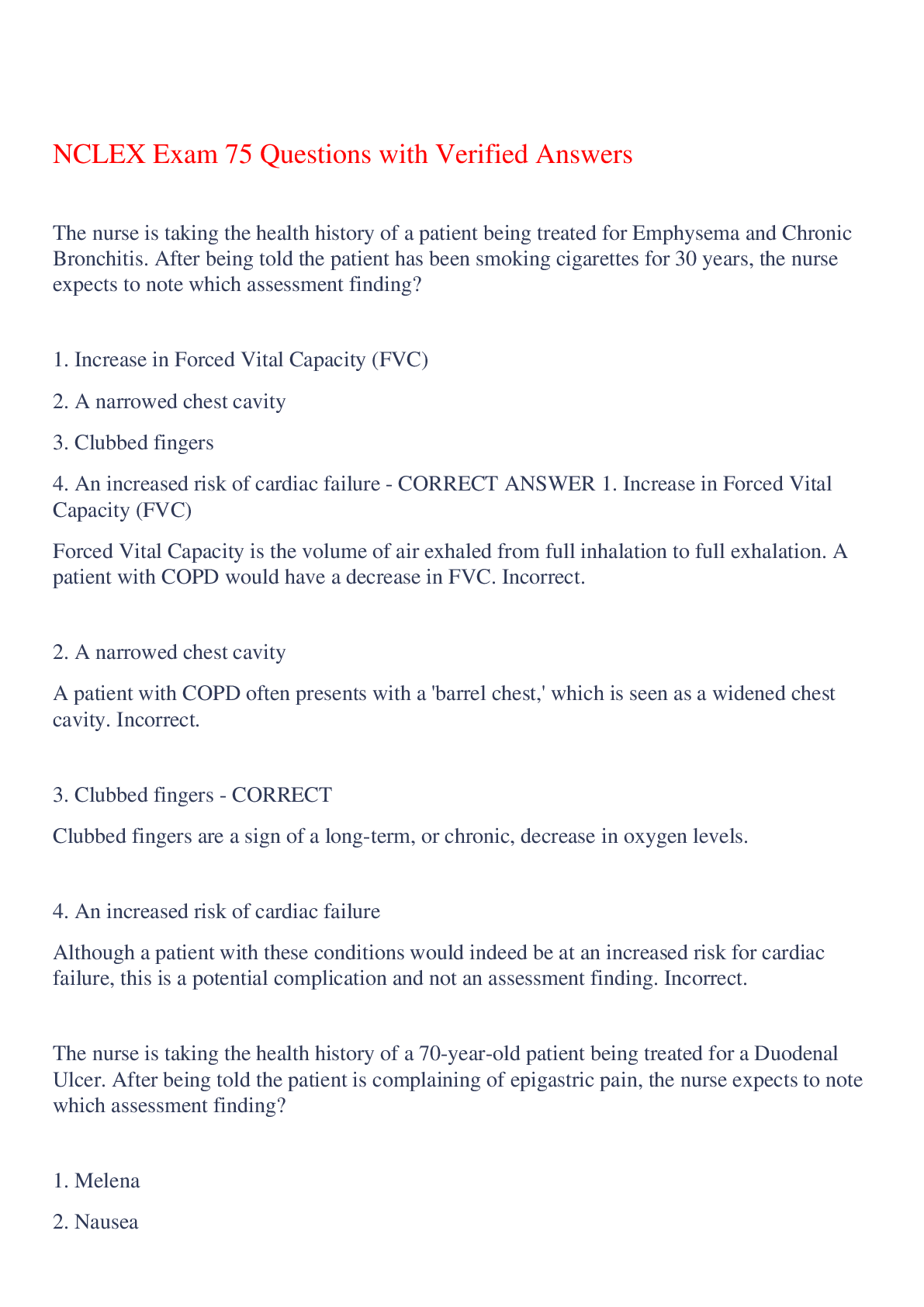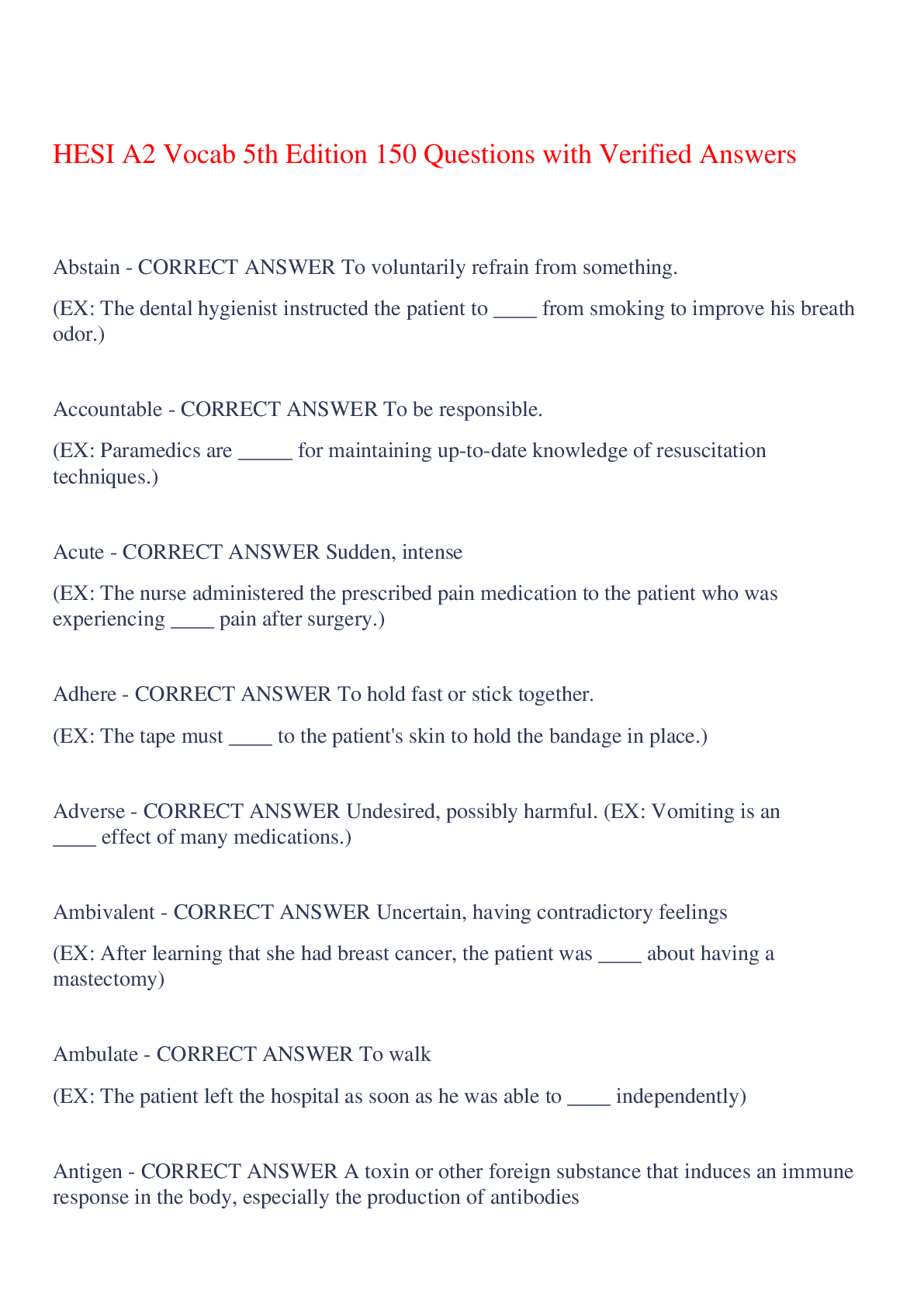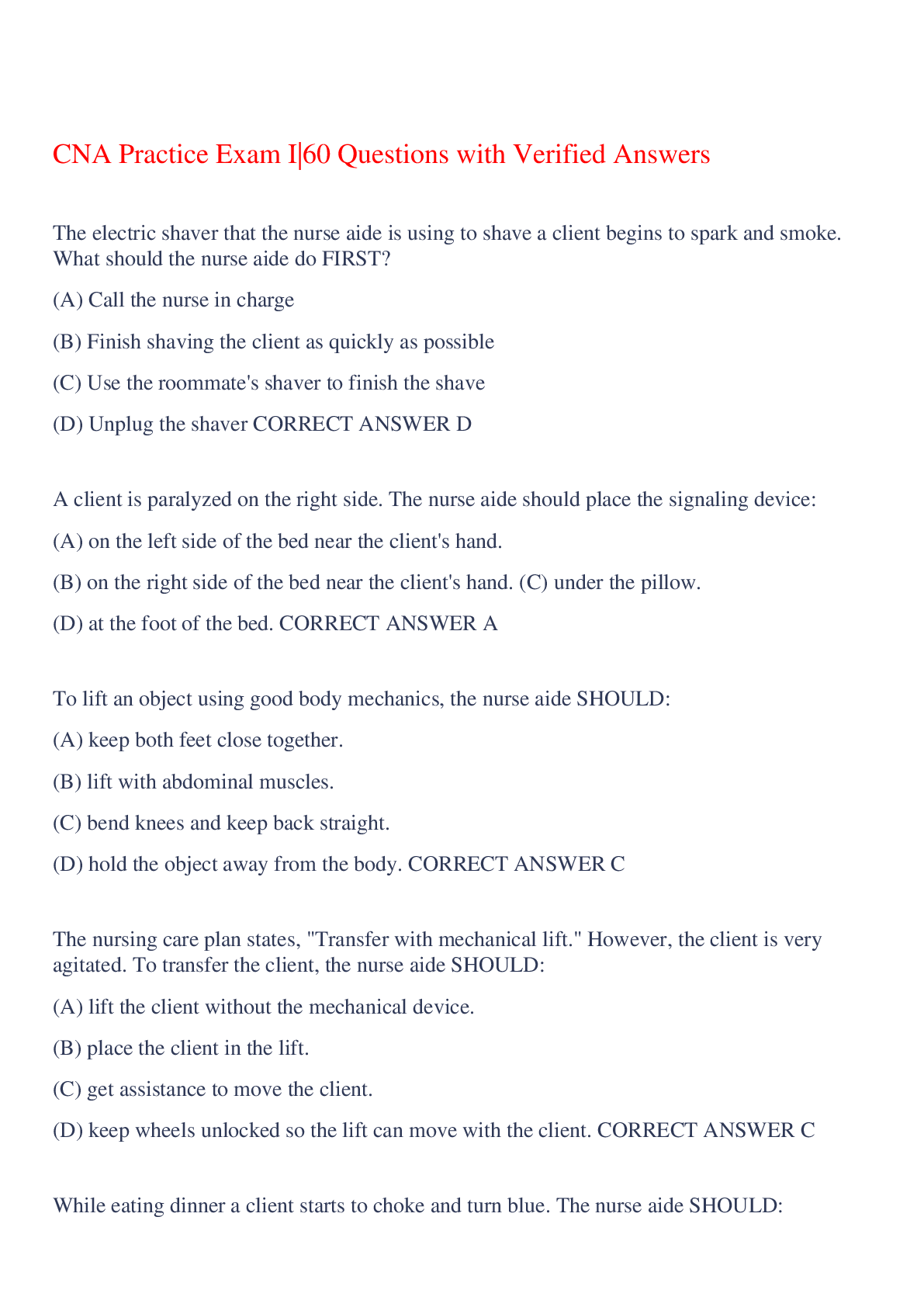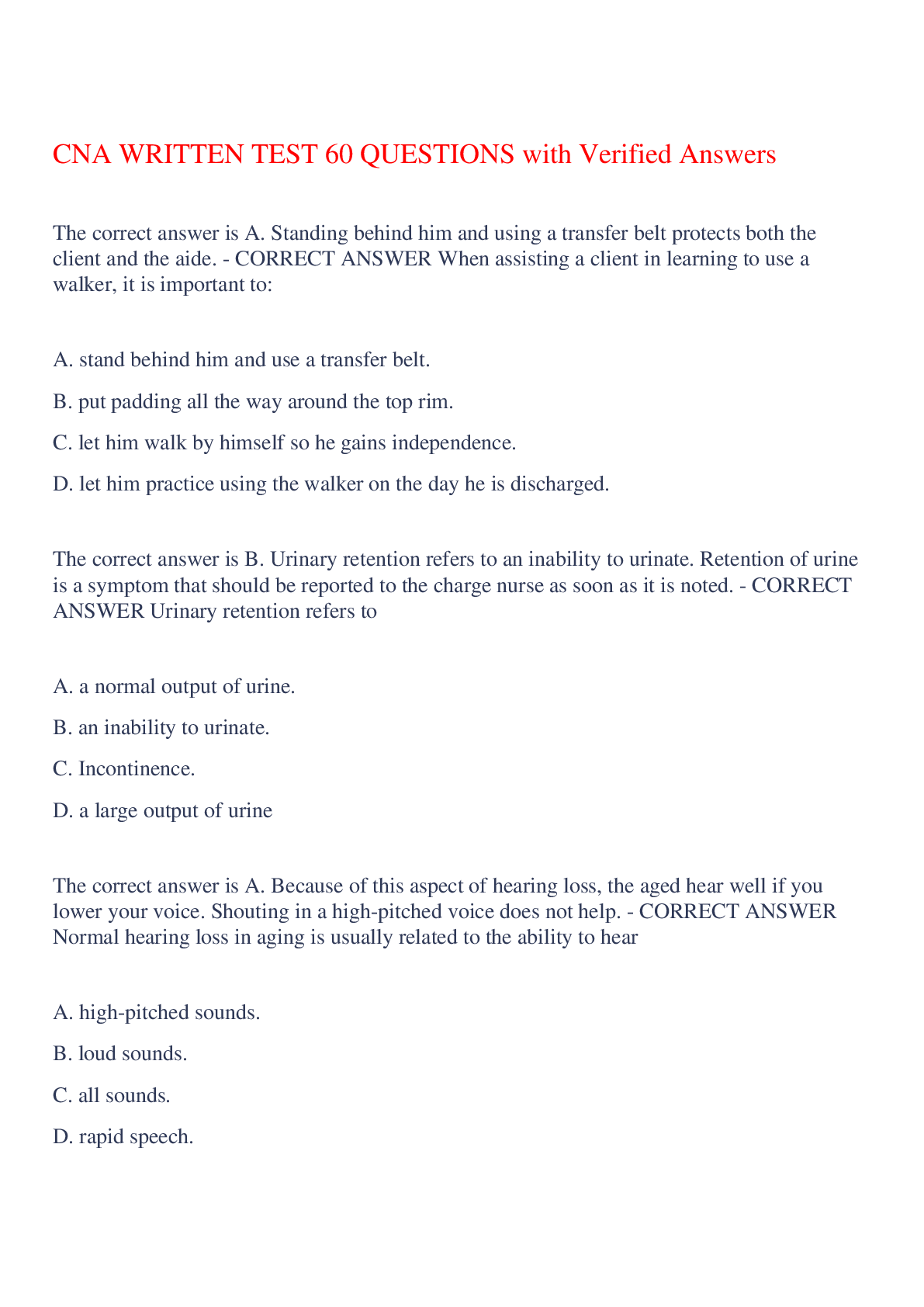CFRN Exam 609 Questions with Verified Answers,100% CORRECT
Document Content and Description Below
CFRN Exam 609 Questions with Verified Answers What is atmospheric pressure at sea level? - CORRECT ANSWER 760mmHg (or 760 torr) T/F: Atmospheric pressure and barometric pressure are essentiall... y the same thing, just using a different unit of measure. - CORRECT ANSWER True (think measuring same item in inches and then measuring it in cm) How many atmospheres (or ATMs) are at sea level? - CORRECT ANSWER 1 atmosphere/ATM at sea level What is barometric pressure? - CORRECT ANSWER The combined weight of all atmospheric gases creating a force upon the surface of the earth. What is barometric pressure at sea level? - CORRECT ANSWER 29.92Hg According to Boyle's law, as altitude increases, barometric pressure ____, and gas in an enclosed space ____ as long as temperature remains ____. - CORRECT ANSWER decreases, expands, constant T/F: As altitude increases, the measurement of Atmospheres (ATMs) also increases. - CORRECT ANSWER False - decreases Quick math for calculating drop in ATMs until appx 5000/6000 feet altitude is that for every ____ increase in altitude, ATM goes down 5%. - CORRECT ANSWER 1500 feet What do the values of P1V1=P2V2 for Boyles law mean? - CORRECT ANSWER P1 = starting ATM at the lowest altitude V1 = starting volume (ETT cuff, epigastrum, etc.) P2 = highest ATM based on highest altitude V2 = ending volume as impacted by highest altitude *constant temperature* Due to Boyle's law, what type of physiologic process/pain may you experience on descent? - CORRECT ANSWER barotitus media - can't equalize ears (for test: only clinical issue that occurs on descent, sinusitis ascent) In barobariatrauma, according to boyles law, as altitude increases and atmospheric pressure drops - the drop causes ____ to be displaced off of phospholipids and ____ narcosis can occur. - CORRECT ANSWER nitrogen, nitrogen T/F: Barobariatrauma acts like a decompression sickness, such as a scuba diver who rapidly ascends. - CORRECT ANSWER True (would also be seen on ascent phase of flight) Barobariatrauma is more common in what type of population of patients? - CORRECT ANSWER morbidly obese How is nitrogen narcosis from barobariatrauma treated? - CORRECT ANSWER High flow O2 (preferably appx 15 minutes before flight if concerned this may present - morbidly obese, significant altitude changes) Barodentalgia (think boyles law) occurs in which phase of flight? - CORRECT ANSWER ascent According to Charles's law, if pressure is constant, what is the relationship of volume and temperature? - CORRECT ANSWER directly proportional (temp up = volume up, temp down = volume down) (*think car tires*) For every 1000' increase in altitude, how much will the temperature decrease? - CORRECT ANSWER 2 degrees celsius (if in meters - 150 meters ascent = 1 degree celsius temp decrease) Which gas law states the following: At a given mass and constant volume of gas, the pressure exerted on the sides of its container is directly proportional to its absolutely temperature. - CORRECT ANSWER Gay-Lusaac's law How many gases make up atmospheric air? - CORRECT ANSWER 5 (nitrogen being the most, oxygen second) What gas law states the sum of the partial pressure in a mixture of gases will equal the total pressure? - CORRECT ANSWER Dalton's law A mix of Dalton's and Boyle's law concepts would conclude that as altitude ______, atmospheric pressure decreases. Even though the pressure changes, the gas stays at the ____ proportions. Therefore, if increasing altitude, the partial pressure of oxygen (amount available in atmosphere) will ___. - CORRECT ANSWER increases, same, decrease How do you calculate a partial pressure of oxygen? - CORRECT ANSWER Oxygen in mmHg x oxygen concentration Ex: 760mmHg (sea level) x 0.21 (normal O2 % in air) = 159.6mmHg (partial pressure aka available amount of oxygen in atmosphere) Normal paO2 on ABG? - CORRECT ANSWER 80-100 (partial pressure of oxygen or amount of oxygen measured/available in arterial blood) What gas law states that the amount of gas dissolved in a solution is directly proportional to the pressure of the gas on the surface of the solution? - CORRECT ANSWER Henry's law (think if you turn up FiO2 and there is more partial pressure of oxygen, more will be dissolved Into the solution - or think pop can, CO2 under pressure in can escapes proportionately when can is opened and pressure released) When the alveoli are perfused with blood as normal, but ventilation/oxygenation fails to supply the perfused region - CORRECT ANSWER Shunting (may often be caused by some sort of blockage - PE, infectious process/fluid) One potential way to optimize gas exchange is to increase surface area of alveoli by adding ____. - CORRECT ANSWER PEEP What is Graham's gas law? - CORRECT ANSWER Gases diffuse from a region of higher concentration (pressure) to lower concentration (pressure) until equilibrium is reached. A patient is at sea level (760 mmHg) and is on 30% O2 (FiO2 of 0.3). What is their partial pressure of oxygen at this altitude? - CORRECT ANSWER 228 (760 x 0.3) Flicker Vertigo is primarily caused by what? - CORRECT ANSWER Sunlight passing through the rotors (lower spinning 5-20Hz - can cause vertigo and seizure activity) For every decrease below sea level (going below water) of ___ feet is equal to additional ATM - CORRECT ANSWER 33 (ex: 99 feet below water is 4 ATMs - using 1 ATM as your "zero") Quick way to estimate patients PaO2 using FiO2? - CORRECT ANSWER FiO2 x 5 Bedside calculation to estimate PaO2? - CORRECT ANSWER (700 torr x FiO2) - 50 ex: (700 x .5) - 50. (*700 = estimated atmospheric pressure, .5 for FiO2 of 50%) You compare your bedside calculation estimate of PaO2 to an actual ABG and notice a large disparity, what physiological process is likely occuring? - CORRECT ANSWER Shunt physiology (alveoli are perfused with blood as normal, but ventilation/oxygenation fails to supply the perfused region) What does the DEATH acronym stand for in regards to stressors of flight? - CORRECT ANSWER Drugs, Exhaustion, Alcohol, Tobacco, Hypoglycemia A period of time from the onset of a decompression until a person is unable to effectively or adequately perform duties due to an insufficient supply of oxygen. - CORRECT ANSWER Time of useful consciousness T/F: In an explosive decompression above 40,000 feet time of useful consciousness will be less than 10 seconds. - CORRECT ANSWER True (*test tip pick shortest amount of time answer*) T/F: The altimeter setting is your barometric pressure. - CORRECT ANSWER True Desired FiO2 based on altitude formula? - CORRECT ANSWER (FiO2 x P1) / P2 *P1 is current barometric pressure *P2 is barometric pressure at highest flight altitude (to maintain same level of oxygen therapy at a higher altitude) PaO2 will decrease by ____________ mmHg for every _____________ feet increase in altitude. - CORRECT ANSWER 5/1000 If the atmospheric pressure at 18,000 ft. MSL is 380 torr, what would the partial pressure of oxygen at that altitude? - CORRECT ANSWER 79 torr (380 x 0.21) A patient suffering from decompression sickness is an example of which gas law? - CORRECT ANSWER Henry's When administering high concentrations of oxygen to alleviate hypoxic hypoxia, you are altering which component of which gas law? - CORRECT ANSWER Henry's (and the solubility of oxygen diffusion into the solution - blood) The inability of getting oxygen molecules down through airways, through alveolar membrane, and onto a red blood cell, ultimately attaching to a hemoglobin molecule. - CORRECT ANSWER Venous admixture or V/Q mismatch (Q stands for cardiac output/flow) Patients with a VQ mismatch, at least early on, will often have what type of ABG? - CORRECT ANSWER uncompensated respiratory alkalosis, PaO2 hypoxemia (patients tachypneic leading to the respiratory alkalosis) dead space ventilation (V/Q mismatch) - CORRECT ANSWER the volume of air inhaled that does not take part in gas exchange because the alveoli are not perfused/poorly perfused (the Q or flow/cardiac output portion of V/Q mismatch) Acute exacerbation in COPD and Asthma leads to ventilatory failure by failure to ___, therefore leading to air ___ and less volume being able to be moved throughout the lungs. - CORRECT ANSWER exhale, trapping T/F: Chronic COPD patients tend to be hypercarbic and hypoxemic on ABGs. - CORRECT ANSWER True (think 50:50 club - PaCO2 >50, PaO2 <50) ATP is a product of what type of metabolism? - CORRECT ANSWER Aerobic For ATP production, the ____ nervous system stimulates ___ 2 receptors, which then cause glycolosis to create more ATP. - CORRECT ANSWER sympathetic, beta Lack of ___ or O2 causes an alteration of ATP production, and the byproduct is ____ acid. - CORRECT ANSWER glucose, lactic T/F: Aerobic metabolism requires oxygen - CORRECT ANSWER True Glycogen is converted to _____ during glycogenesis. - CORRECT ANSWER glucose ___________ is the starting molecule for glycolysis - CORRECT ANSWER Glycogen How many ATP are produced per 1 molecule of glucose during glycolysis process? - CORRECT ANSWER 2 The krebs cycle purpose is multifaceted: 1) Carry ___ ions into the electronic transport chain (via niacin and riboflavin bonds) 2) Forms ___ during cellular respiration (as a byproduct of niacin/riboflavin gaining hydrogen ion) 3) Form ___ more additional ATP - CORRECT ANSWER hydrogen, CO2, 2 What B vitamins strongly facilitate the krebs cycle? - CORRECT ANSWER Niacin and Riboflavin When Niacin and Riboflavin, bonded with _____ ions after the krebs cycle, move into the electron tranpsport chain (or oxidative phosphorylation), the hydrogen ions pick up ____ molecules (oxidation) and become ____. - CORRECT ANSWER hydrogen, oxygen, H2O What does ADP stand for? - CORRECT ANSWER adenosine diphosphate What does ATP stand for? - CORRECT ANSWER adenosine triphosphate During phosphorylation, ADP gains one more ____ bond, creating ____. - CORRECT ANSWER phosphorous, ATP (the 3rd phosphorous bond is what the cell pulls off for energy source) During oxidate phosphorylation, how many net ATP are produced? - CORRECT ANSWER 36 (gross 38 but 2 are used during krebs cycle to power it) T/F: both aerobic and anaerobic metabolism start with glycolysis - CORRECT ANSWER true anaerobic metabolism does not require ____ - CORRECT ANSWER oxygen 3 P's of ETCO2 that could explain low ETCO2 besides hyperventilation - CORRECT ANSWER 1) Pulse (do they have one?) 2) Perfusion (what is their MAP?) 3) pH (severe acidosis causing partially compensated metabolic acidosis) What makes up cardiac output? - CORRECT ANSWER stroke volume and heart rate What makes up stroke volume? - CORRECT ANSWER preload, afterload, contractility _____ carries appx 97-98% of oxygen in the body, and ___ carries appx 2-3%. - CORRECT ANSWER Hemoglobin, plasma SvO2 is drawn off of what? - CORRECT ANSWER Distal port of a swan ganz (PA catheter) - blood in pulmonary artery just before it enters the lungs ScVO2 is drawn off of what? - CORRECT ANSWER distal port of central line (central venous oxygen saturation - 5-8% higher than an SvO2) Each gram of Hgb carries how much O2? - CORRECT ANSWER 1.34 mL How is Hgb measured? - CORRECT ANSWER g/dL [(1.34mL x Hgb x SaO2)] + (PaO2 x 0.003) is the formula for what? - CORRECT ANSWER CaO2 (the amount of oxygen that we deliver that ultimately attaches to the hemoglobin) - arterial oxygen content How many mLs are in a dL? - CORRECT ANSWER 100 ml per decilitre 4 types of hypoxia - CORRECT ANSWER 1. Hypoxic 2. Histotoxic 3. Hypemic 4. Stagnant hypoxic hypoxia - CORRECT ANSWER Deficiency in alveolar O2 exchange hypemic hypoxia - CORRECT ANSWER -Reduction in oxygen carrying capacity of the blood. -Anemia, blood loss, cigarettes and carbon monoxide (ABCC) can cause Hypemic Hypoxia. Stagnant Hypoxia - CORRECT ANSWER results from the inability of blood to carry oxygen to tissues fast enough to sustain their needs (heart failure, circulatory shock, obstructive shock, PE) histotoxic hypoxia - CORRECT ANSWER metabolic poisons such as cyanide prevent the tissues from using oxygen delivered to them (ETOH or CO poisoning could also do this) On a normal oxyhemoglobin dissociation curve, you can subtract ___ from your SpO2 and it will give you a reflective rough PaO2. - CORRECT ANSWER 30 When there is a "right shift" on the oxygemoglobin dissociation curve, the body is offloading ____ oxygen into the blood stream. - CORRECT ANSWER more What effect is being described: hemoglobins oxygen binding affinity is inversely related both to acidity and to the concentration of carbon dioxide - CORRECT ANSWER Bohr effect (explains right shift on oxyhemoglobin disassociation curve) (in an acidotic state, hemoglobin isn't very attracted to oxygen, and things like hydrogen and CO will take binding spots on hgb instead of all oxygen - normally 4 "seats at the table" typically filled with oxygen) What is 2,3 DPG? - CORRECT ANSWER a molecule thats attached to every red blood cell and whose job is to offload oxygen from the hemoglobin when needed What type of oxyhemoglobin shift do you have if oxygen and hemoglobin have a high affinity for one another and hgb does not want to release O2 stores? - CORRECT ANSWER left Raised temp, raised acid, raised 2,3 - DPG will cause what type of oxyhemoglobin shift? - CORRECT ANSWER Right shift *raised temp - thyroid storm, fever, drug ingestion, excited delerium, etc. *raised acid - respiratory or metabolic acidosis *raised 2,3 DPG - more chronic, COPD patients (usually polycythemic - overproduction of RBCs), also seen in athletes using blood doping/taking epogen *end result Raised PaO2 T/F: during a right shift the patients SpO2 will be lower, but their PaO2 will be higher - CORRECT ANSWER True - hemoglobin molecules aren't as saturated with O2 (SpO2) but more O2 is being offloaded into bloodstream (hgb low affinity to O2 during right shift) Low temp, low acid, low 2,3-DPG cause what type of shift? - CORRECT ANSWER Left shift *Low temp - hypothermia, sepsis, myxedema coma *Low acid - respiratory or metabolic alkalosis *Low 2,3-DPG - primary problem with PRBC administration (citrate encapsulates 2,3-DPG) - problem with MTP typically (over 6 units) - give calcium to help with this. whole blood lowers this problem *causes low PaO2 as hemoglobin has high affinity to O2 and won't offload stores T/F: In a left shift the SpO2 will be high, but PaO2 will be low - CORRECT ANSWER True (Hgb has high affinity to O2 and doesn't want to offload stores - so it is saturated (SpO2) but not actually offloading to the bloodstream) Anaerobic metabolism only nets ___ ATP. - CORRECT ANSWER 2 (no electron transport change as it doesn't require O2) What are the bodies three main buffering systems? - CORRECT ANSWER 1) carbonic acid-bicarbonate buffering system 2) respiratory buffering system 3) kidneys T/F: The carbonic acid-bicarbonate buffering system is a second by second buffering system of our body metabolizing CO2. - CORRECT ANSWER True T/F: The respiratory buffering system takes hours to days to produce results. - CORRECT ANSWER False - minute to minute CO2 + H2O ↔ H2CO3 ↔ H+ + HCO3- - CORRECT ANSWER Acid-Base Formula In the carbonic buffer system, the first step is the body combines ___ + ___ from the muscles/tissues to create carbonic acid (H2CO3). - CORRECT ANSWER CO2 + H2O T/F: Carbonic acid likes to stay bound together as H2CO3. - CORRECT ANSWER False - volatile compound, likes to break apart After carbonic acid (H2CO3) is formed, it wants to split apart, it breaks apart to create __ + ___ - CORRECT ANSWER Hydrogen and bicarb (H + HCO3) (how we maintain consisten pH in homeostasis) The respiratory buffering system converts H and HCO3 back into CO2 and H2O, where the CO2 can now be ____ and the H2O ___. - CORRECT ANSWER exhaled, evaporated The kidney buffering system works by excreting ____ and ___ ions as needed, and can also make new ___ as needed. - CORRECT ANSWER HCO3, H (hydrogen), HCO3 (bicarb) In an ABG, if HCO3 is <22 it is considered ____. - CORRECT ANSWER Acidotic *think not enough base = acidic In an ABG, if CO2 is <35 it is considered ____. - CORRECT ANSWER Alkalotic *think not enough acid = basic/alkalotic If you have a metabolic acidosis, what would the normal response of the bodies respiratory system be? - CORRECT ANSWER respiratory alkalosis **moving opposite each other is a normal compensatory response** An ABG with a low CO2 and a low HCO3 would be considered ____ compensated. - CORRECT ANSWER Partially (opposites - low CO2 = alkalotic, low bicarb = acidotic) An ABG with with a high CO2 and a low HCO3 would be considered a ____ disturbance. - CORRECT ANSWER Mixed disturbance (verses a compensation) (high CO2 = acidotic, low HCO2 = acidotic - not opposites, not a normal response, not compensating) For every 10mmHg change in PaCO2, the pH will change by ___ in the opposite direction. - CORRECT ANSWER .08 For every 10mEq/L change in HCO3-, the pH will change by ___ in the same direction. - CORRECT ANSWER 0.15 For every change in pH of 0.10, the K+ will change by ___ in the opposite direction. - CORRECT ANSWER 0.6 As pH becomes more acidotic, ___ ions shift into the cell causing ___ to be shifted out of the cell to maintain neutrality. - CORRECT ANSWER Hydrogen, Potassium A patient presents in an acidotic state with associated hyperkalemia. What should be your treatment priority? - CORRECT ANSWER treat the acidosis - not the potassium (unless you are having cardiac related problems like irritability). Treating the acidosis (underlying cause) will cause the Hydrogen ions to shift out of the cell, and K to shift back in allowing the K to drop naturally. List 3 causes of acidosis - CORRECT ANSWER Metabolic - DKA, sepsis, shock, severe diarrhea, renal failure, salicylate overdose Respiratory - Airway obstruction, COPD, chest trauma, drug OD, pulmonary edema (hypoventilation) Gold Mark Acronym for Metabolic Acidosis Identification/Causes: G____ Oxoproline L-______ D-Lactate Methanol ASA R_____ Failure K_____acidosis - CORRECT ANSWER Glycols (ethylene glycol, propylene glycol) Oyxoproline (byproduct of tylenol OD) L-Lactate (lactate production from glycolysis, may also be from something like a metformin OD) D-Lactate (propylene glycol OD, tylenol OD, short bowel syndrome - infection in bowel) (specialty lab) Methanol (ingestion - window washer fluid, solvents) ASA (aspirin overdose/salicylates - will get tachypnic and febrile) Renal Failure (pre/intra/post renal) Ketoacidosis (DKA, Chronic ETOH, Starvation) T/F: Betahydroxybutarate is one of the earliest signs of ketone production. - CORRECT ANSWER True *Also one of the quickest things to trend to see if patient is getting better* If you have a base excess of -16, you could also call this a base ____ of 16. - CORRECT ANSWER Deficit A negative base excess/base deficit (>-2) indicates extra ___. - CORRECT ANSWER Acid How do you calculate a strong ion difference? - CORRECT ANSWER Na - Cl A strong ion difference of <38 indicates ____, and >38 indicates ____. - CORRECT ANSWER Acidosis, alkalosis A perfect chloride level is ____. One common reason for elevated chloride is receiving a lot of normal ____. - CORRECT ANSWER 102, saline What are the 5 things to look at when trying to determine where you are getting negative base excess - before albumin correction? (ex: base excess -18, looking for 16 extra acid molecules) - CORRECT ANSWER 1) Na level 2) Cl level (ex: if normal Cl 102, but Cl is 110 - there is 8 of the extra acids) 3)Lactate (ex: lactate 6, normal is 0-2, there is 4 of the extra acids) 4)Ketones (+ or -, no great way to quantify how many acids) 5)Toxic Alcohols (worst reason to have base excess) To correct base excess for albumin (identify acid factor): 1) [(normal albumin __.__ - patient albumin)]2.5 2) _____ - answer from #1 = corrected BE - CORRECT ANSWER 4.5, base excess (*math tip - a negative minus a negative = a positive - ex: -10 - (-2.5) = is same as -10 + 2.5) ____ is a weak acid that can cause false elevation or false low of base excess. - CORRECT ANSWER Albumin Measurement between cations and anions - CORRECT ANSWER Anion Gap T/F: A corrected anion gap can be an earlier indication of metabolic acidosis than an ABG - CORRECT ANSWER True (could also reflect an uncompensated respiratory alkalosis that hasn't progressed to metabolic yet) [Na+ - (Cl+HCO3-)] + K is the formula for what? - CORRECT ANSWER Corrected anion gap **tip: HCO3- in this case is the serum bicarb which is reflected as the CO2 readout on a comprehensive metabolic panel (CO2 and HCO3 bound together)** What is the normal corrected anion gap? - CORRECT ANSWER 16-20 List 3 causes of alkalosis - CORRECT ANSWER respiratory: anxiety, high altitudes, pregnancy, fever, initial states of PE metabolic: ingestion (OD of antacids), potassium wasting diuretics, gastric fluid loss (vomiting, NG suctioning) What medication is often used to try to treat metabolic alkalosis? - CORRECT ANSWER acetazolamide (diamox) - good at optimizing bicarb elimination **also check and correct electrolytes** A cation has lost valance electron(s), and therefore has a ____ charge. - CORRECT ANSWER Positive An anion has gained valanced electron(s), and therefore has a ____ charge. - CORRECT ANSWER Negative List 3 of the bodies most common cations. - CORRECT ANSWER Na+, K+, Ca++, Mg++, H+ List 2 common anions. - CORRECT ANSWER Cl-, HCO3-, CN- (cyanide) What is the dominant extracellular cation? - CORRECT ANSWER Na+ (90%) What is the dominant intracellular cation? - CORRECT ANSWER Potassium What is the dominant extracellular anion? - CORRECT ANSWER Cl- T/F: The intracellular fluid compartment holds less fluid than the extracellular fluid compartment. - CORRECT ANSWER False - intracellular is dominant at appx 2/3, extracellular 1/3 What is the normal range for sodium? - CORRECT ANSWER 135-145 mEq/L (perfect 140) Sodium is a strong ___ and helps maintain acid-base balance. - CORRECT ANSWER acid ____ is the cation responsible for determining osmotic pressure. - CORRECT ANSWER Sodium *this causes extra-cellular/intra-cellular fluid shifting* What does the ending -remia mean? - CORRECT ANSWER measured in the blood stream *ex: hyponatREMIA What are the 3 generalized categories for hyponatremia? - CORRECT ANSWER *volume depletion (burns, vomiting, diuretics, etc.) *volume overload (kidney injury/failure, CHF, *loss of water (biggest cause - SIADH - causing body to hold onto water) T/F: You can cause an osmotic demyelination by raising Na+ too quickly. - CORRECT ANSWER True - raise 8-10 mEq/day *often irreversible/fatal T/F: A severely hyperglycemic patient will often have a falsely low sodium level. - CORRECT ANSWER True - hyperosmolic state causing shifting leading to falsely low levels -usually DKA When would you calculate a corrected sodium? - CORRECT ANSWER In a severely hyperglycemic patient *Measured Na+ [.016 x (serum glucose - 100)] What are the 3 generalized categories for hypernatremia? - CORRECT ANSWER *volume depletion (sweating, diarrhea) *urine sodium will be <10 *volume overload (too much NS, cushings, too much NaHCO3- like a cardiac arrest) *urine sodium will be >20 *loss of water (huge loss in volume such as DI) What is a normal Cl- level? - CORRECT ANSWER 95-105 (perfect 102) Chloride passively follows ____ and water. - CORRECT ANSWER Na+ A deficiency in chloride will lead to a deficiency in ___ and vice versa. - CORRECT ANSWER Potassium Potassium is regulated by the ____. - CORRECT ANSWER Kidneys T/F: All lab values are a measure of what is in the extracellular volume. - CORRECT ANSWER True - no way to measure intracellular Normal Potassium? - CORRECT ANSWER 3.5-5.0 mEq/L List 3 signs of hyperkalemia. - CORRECT ANSWER parasthesias, generalized fatigue/weakness, metabolic acidosis, paralysis, palpitations, bradycardia, ectopy, new onset 2nd or 3rd degree heart blocks, diminished deep tendon reflexes, edema, peaked T waves Slow Vtach with a QRS >.200ms is always indicative of ____ - CORRECT ANSWER hyperkalemia (amio will kill them - need to shift K) List 4 meds commonly used to treat hyperkalemia - CORRECT ANSWER dextrose, calcium, insulin, albuterol List 3 signs of hypokalemia. - CORRECT ANSWER altered mental status, bradycardia, hypotension, tachycardia, PACs, PVCs, cardiac arrest, ventricular arrhythmias, hypoventilation, decreased muscle strength, tetany, decreased deep tendon reflexes, fasciculations A classic sign of hypokalemia on an EKG is ___ waves. - CORRECT ANSWER U (appears as QT segment prolongation) *also could have T wave flattening, T wave inversion, arrhythmias, ST segment depression For every 10 mEq of potassium replacement how much should it raise the K+ level? - CORRECT ANSWER 0.1 mEq/L Normal BUN? - CORRECT ANSWER 6-23 The ___ lab is a good indicator of overall renal health. - CORRECT ANSWER BUN *shows how well we are getting rid of urea (waste product of liver) List 2 common causes of elevated BUN - CORRECT ANSWER Renal failure, CHF, high protein diets, hypovolemia Serum Bicarbonate normal on a BMP/CMP? - CORRECT ANSWER 26-30 (measuring total CO2 as bicarb is bound to the CO2) What is a normal Cr level? - CORRECT ANSWER 0.6-1.4 What is the lab that helps indicate muscle breakdown and kidneys ability to filter it out? - CORRECT ANSWER Creatinine List 2 causes of elevated Cr - CORRECT ANSWER Hypovolemia, low GFR, poor creatinine clearance (kidney injury, kidney failure, excess muscle breakdown, etc.) What is a normal magnesium level? - CORRECT ANSWER 1.5-2.5 This cation is found appx 50% in bones and 45% in intracellular fluid. - CORRECT ANSWER Mg++ T/F: A common cause of high Mg++ levels is renal failure. - CORRECT ANSWER True - cleared by kidneys A common cause of low Mg++ is ____ imbalance. - CORRECT ANSWER Electrolyte (especially hypokalemia, hypocalcemia) T/F: If a patient is hypocalcemic that will very likely also be hypomagnesemic. - CORRECT ANSWER True (and vice versa) What is a normal phosphorous level? - CORRECT ANSWER 3.0-4.5 If calcium is high, your phosphorous will be ___. - CORRECT ANSWER low - and vice versa Normal calcium levels? - CORRECT ANSWER 8.8-10.4 T/F: Patients with kidney disease always have an increase in Ca++ levels. - CORRECT ANSWER False - decrease List 3 signs of hypocalcemia - CORRECT ANSWER seizures, muscle cramps, dysphagia, numbness and tingling in fingers/toes/perioral *chronic - brittle nails, dry skin, coarse hair, psoriasis, cataracts, chronic itching List 3 signs of hypercalcemia - CORRECT ANSWER confusion, hypotonia/hyporeflexia, paresis, volume depletion, signs of pancreatitis, arrhythmias, shortened QT interval, hypotension Chvostek's sign - CORRECT ANSWER Tap on Cheek, facial spasm when Cheek is tapped (hypocalcemia) Trosseau's sign - CORRECT ANSWER When BP cuff on arm is inflated wrist contracts up (hypocalcemia) Red blood cells are called ____, white blood cells are called ____, and platelets are also called _____. - CORRECT ANSWER erythrocytes, leukocytes, thrombocytes Normal RBC levels for males is 4.7-___, and for females is 4.2-___. - CORRECT ANSWER 6.1, 5.4 List 2 reasons for low RBCs. - CORRECT ANSWER iron deficiency, blood loss, bone marrow suppression (formed within bone marrow), hemolysis List 2 reasons for increased RBCs - CORRECT ANSWER high altitude, dehydration, compensation for hypoxia (common in COPD patients) Normal male hgb is ___-18, and normal female hgb level is __-16_. - CORRECT ANSWER 14, 12 Hemoglobin carries ___ out to the body and ___ back to the lungs as carboxyhemoglobin. - CORRECT ANSWER oxygen, CO2 The % of volume made up of RBCs - CORRECT ANSWER Hematocrit Elevated hct levels are commonly caused by ____. - CORRECT ANSWER Dehydration (lower plasma levels with dehydration = increased % of RBCs being measured) Normal hematocrit in males is ___-52%, and normal hematocrit in females is ___-47%. - CORRECT ANSWER 42, 37 In a normal state, Hct should be ___ x that of Hgb. - CORRECT ANSWER 3 For every unit of PRBCs administered, Hgb should increase by appx ___, and Hct should increase by approximately ____. - CORRECT ANSWER 1 g/dL, 3% T/F: Decreased Hct levels are often due to overhydration. - CORRECT ANSWER True - overhydration, SIADH (also due to anemia) Normal MCV range - CORRECT ANSWER 80-95 *mean corpuscular volume (size of RBC) 80-95 (normocytic), >95 macrocytic, <80 microcytic What is the MCH? - CORRECT ANSWER mean corpuscular hemoglobin *the amount of hgb per RBC What is RDW (red cell distribution width)? - CORRECT ANSWER the measurement of variation of RBC sizes (normal 11-15%, most are same size) What is a normal platelet level? - CORRECT ANSWER 150,000-400,000 Name 2 things that could decrease platelets - CORRECT ANSWER DIC, sepsis, HIT, bone marrow failure/suppression, certain medications, certain viruses(biggest - EBV, chickenpox, AIDS), (and more) Normal WBC levels? - CORRECT ANSWER 4,500-10,500 T/F: Viruses tend to cause a decrease in WBC count. - CORRECT ANSWER True What does the acronym Never Let Monkeys Eat Bananas stand for in regards to types of WBCs? - CORRECT ANSWER Neutrophils, Lymphocytes, Monocytes, Eosinophils, Basophils What is the largest most predominant type of WBC? - CORRECT ANSWER Neutrophils *usually first ones to arrive, job is to ingest and get rid of bacteria What are bands? - CORRECT ANSWER immature neutrophils - suggests acute inflammatory/infectious process When are lymphocytes most commonly elevated? - CORRECT ANSWER Viruses A type of WBC that is phagocytic and elevates towards end of infection/injury - clean up crew. - CORRECT ANSWER Monocytes Type of white blood cell that primarily increases in state of allergic reaction. - CORRECT ANSWER Eosinophils (also in asthma patients, parasite reactions) Type of WBC that often elevates in inflammatory response state. - CORRECT ANSWER Basophil Amount of solute in the serum part of the blood - CORRECT ANSWER Serum Osmolality (275-295) - think "cellular hydration" How is serum osmolality regulated? - CORRECT ANSWER Anti-diuretic hormone Diabetes insipidus would have a ____ serum osmolality, and an SIADH patient would have a ___ serum osmolality. - CORRECT ANSWER high, low Measurement of concentration of the urine, ration of urine density and water density - CORRECT ANSWER Urine Specific Gravity Normal range of urine specific gravity - CORRECT ANSWER 1.005-1.030 T/F: A low specific gravity indicates a dilutional state, and a high specific gravity indicates a hemoconcentrated state. - CORRECT ANSWER True - dilutional state (peeing a lot, not secreting ADH ex: DI); hemoconcentrated state (not peeing, secreting ADH ex: SIADH) Normal Troponin 1? - CORRECT ANSWER <0.04 ng/mL Troponin is a _____ essential for muscle contraction, is also a ____ binding site, and can only start being detected __-__ hours post injury. - CORRECT ANSWER protein, calcium, 2-3 Troponin peaks at ___ hours and can stay in the system for approximately ___ weeks. - CORRECT ANSWER 24, 2 If CK-MB to CK ratio relative index is >2.5-3.0 there is likely ___ muscle damage, if high CK and relative index is <2.5-3.0 there is likely ___ muscle damage. - CORRECT ANSWER cardiac, skeletal ______ is secreted by cardiomyocytes based on ventricular stretch, lab often used in CHF patients. - CORRECT ANSWER BNP (general normal <100) Age differentiated: (0-74yo BNP <125 normal, 75-99+yo BNP >450 indication of signifcant stretch) This lab measures the % of blood volume that is made up of RBCs, it is also the predominant ketone body at the onset of DKA. - CORRECT ANSWER Beta Hydroxybutyrate (0.4-0.5 mmol/L) (Ketones could also be being produced for other reasons than DKA - match to patient presentation) 3 components you want to have in a chest xray to make sure to get a good read are ____, inspiration, and _____. - CORRECT ANSWER rotation, penetration In an ___ Chest Xray view the heart may seem larger than it is due to the particular view. - CORRECT ANSWER AP (projecting from front to back so tends to appear to enlarge heart) What is the preferred view for a chest xray? - CORRECT ANSWER PA (posterior to anterior, xray plate anterior) In the ____ ____ type of COPD, there is no damage to the pulmonary/capillary bed, whereas with the ____ type the pulmonary/capillary bed is damaged. - CORRECT ANSWER chronic bronchitis (problem is excessive tracheo-bronchial secretions and inflammation in the lungs), emphysema Because there is no damage to the pulmonary/capillary bed in the chronic bronchitis type of COPD, the body thinks it is a ___ ___ problem. - CORRECT ANSWER Cardiac Output (decreases ventilations, increases cardiac output - therefore leading to CO2 retention, leading to pulmonary vasculature constriction over time, and then signs of R sided heart failure) To compensate for the emphysema disease process, the body ____ ventilations and ___ cardiac output. - CORRECT ANSWER increases, decreases A shark fin waveform on capnography is consistent with what disease process? - CORRECT ANSWER COPD (due to resistance to expiration) T/F: Bronchodilators help reduce mucus secretions. - CORRECT ANSWER True Bronchodilators work on what receptors? - CORRECT ANSWER beta 2 smooth muscle relaxer - open airways What type of medications can help prevent bronchoconstriction from re-occuring, as well as potentiating bronchodilating effects from bronchodilators? - CORRECT ANSWER Anti-cholinergics (ie: ipratropium) (can also use inhaled atropine/NS mix if no other option, has a max) Phosphodiesterase inhibitors helps to improve ____dilation, improve contractility of the ____, and increase stimulation within the ____ center of the brain. - CORRECT ANSWER bronco, diaphragm, respiratory (ex: Theophylline, daliresp, sildenafil) A decrease in systolic blood pressure >10mmHg during inspiration - CORRECT ANSWER Pulsus Paradoxus (can see in asthma, pericardial tamponade, obstructive pulmonary diseases, and more) (In case of asthma/obstructive pulmonary it is due to hyperinflation and/or increased intrathoracic pressure, decreased amount of blood return to L heart) T/F: ARDS is a secondary disease process/syndrome - CORRECT ANSWER True - always secondary to an underlying cause (direct lung injury ex: pneumonia, near-drowning, pulmonary contusion. Indirect lung injury ex: sepsis, CABG, drug overdose) ARDS is primarily caused by a large number of ____ mediators being released as well as a large amount of _____. Together these cause damage to the endothelial lining in the lung between the ____ and surrounding capillaries. - CORRECT ANSWER inflammatory, neutrophils, alveoli When the _____ lining is damaged in ARDS, it allows fluid to leak out and separate the space between the ____ and the _____, causing the issues with gas exchange. It also allows fluid to leak into the ____, leading to the development of pulmonary ____. - CORRECT ANSWER endothelial, alveoli, capillary bed, alveoli, edema A P/F ratio of <___ is part of the definition of ARDS based on the American/European Consensus Conference. - CORRECT ANSWER 200 (P/F ratio: PaO2 divided by FiO2) (Berlin criteria - 200-300= mild ARDS, moderate 100-200, severe <100 *all with PEEP 5+*) How is shock index calculated? - CORRECT ANSWER Pulse rate/Systolic BP Anything over ___ is a high shock index, indicating a higher mortality potential - CORRECT ANSWER 0.9 What is Larson's Maneuver - CORRECT ANSWER In cases of bronchospasm (for ex: related to pushing ketamine too quickly) - place pressure behind the earlobe bilaterally and behind the jaw raising the jaw and helping relax the vocal cords What are two contraindications to etomidate? - CORRECT ANSWER Adrenal insuffiency (inhibits cortisol production) and Sepsis T/F: Succinylcholine and epinephrine are two medications that burn the bodies oxygen supply quicker leading to potentially quicker desaturations. - CORRECT ANSWER True (think RSI scenario) Pregnant women by term have approximately how much of an increase in circulating blood volume? - CORRECT ANSWER 50% (however hgb does not increase proportionally so they will appear anemic on a cbc) In a pregnant woman, BP tends to decrease in ___ trimester but is back to baseline by ___ trimester. - CORRECT ANSWER 2nd, 3rd In a pregnant woman, the HR typically increases by ___-___ beats per minute. - CORRECT ANSWER 10-20 Pregnant woman may need to be placed into what position to help displace the gravid uterus off the IVC and aorta? - CORRECT ANSWER left lateral At ___ weeks the fundal height should be at the umbilicus. - CORRECT ANSWER 20 At ___ weeks the fundal height should be at the xyphoid process. - CORRECT ANSWER 36 Refers to the fetal head in relation to the mothers pubic bone/ischial spines - CORRECT ANSWER Station (measured -3 (further up in birth canal) to +3 (further down in birth canal) *think +4 on the floor* Stage of labor that begins with onset of contractions and ends with complete dilation of the cervix. - CORRECT ANSWER 1st stage Stage of labor that begins with complete effacement and dilation and ends with delivery of baby. - CORRECT ANSWER 2nd stage Stage of labor that begins after delivery of baby and ends after placental delivery. - CORRECT ANSWER 3rd stage At approximately ___-___ weeks of pregnancy and after you should have good fetal heart rate variability. - CORRECT ANSWER 30-32 weeks (before that may be too mature to have the nervous and cardiac systems developed enough to give good variability) List 2 potential causes of decreased fetal heart rate variability - CORRECT ANSWER fetal hypoxia, prematurity, congenital heart anomalies, fetal tachycardia Fetal hypoxia and mechanical cord compression can cause ____ fetal heart rate variability. - CORRECT ANSWER increased (saltatory pattern) Fetal bradycardia is defined as a heart rate <___ sustained for at least ___-___ minutes. - CORRECT ANSWER 120, 5-10 List 3 potential causes of fetal bradycardia - CORRECT ANSWER prolonged cord compression, cord prolapse, tetanic/sustained uterine contractions, epidural/spinal anesthesia, maternal seizures, vigorous vaginal examination (leading to arterial vasospasm within cord), transverse presentations, >40week fetus On fetal monitoring strips, each thick line to thick line is how long? - CORRECT ANSWER 1 minute (every big box - thin line to thin line - is 10 seconds) Fetal tachycardia is defined as a heart rate >___ sustained for at least ___-___ minutes. - CORRECT ANSWER 160, 5-10 (>180 significant tachycardia, >200 likely a fetal anomaly/rhythm not necessarily related to fetal hypoxia) List 3 potential causes of fetal tachycardia - CORRECT ANSWER fetal hypoxia, maternal fever, hyperthyroidism, maternal or fetal anemia, prematurity Accelerations in fetal heart rate is appx ___bpm for ___ seconds and are a sign of well being during labor. - CORRECT ANSWER 15, 15 T/F: Early decelerations mirror contractions and are a common normal labor finding caused by vagal stimulation when the babies head is compressed during labor. - CORRECT ANSWER True *They have a slow onset, shallow dip in heart rate, return to baseline at end of contraction* You are monitoring a fetal heart rate and notice the strip has irregular decelerations with sharp tracings down and back up that generally do not have a pattern with contractions. What is this called? - CORRECT ANSWER Variable decelerations The most common cause of variable deceleration is ___ ___. - CORRECT ANSWER Cord compression *can also be related to premature rupture of membranes or decreased amniotic fluid - which typically are leading to a cord compression state, increase chance of cord prolapse* When monitoring the fetal heart rate you notice smooth shallow dips in heart rate that begin at or after the peak of contraction and dont return to baseline until after the contraction has ended. What is this called? - CORRECT ANSWER Late deceleration - most worrisome! *Think fetal hypoxia, uterine/placental insufficiency* You are monitoring a fetal heart rate strip and notice a sine wave/(atrial flutter looking) type appearance of a heart rate that stays between appx 120-160 but has no variability out of that range and it does not change with contractions. What is this called? - CORRECT ANSWER Sinusoidal (rare) Ominous finding, requires immediate C-section, usually indicates fetal anemia or hypoxia List 3 options to consider for fetal distress management - CORRECT ANSWER Administer oxygen, rule out cord prolapse, left lateral positioning, IV fluid bolus, stop uterotonic agents such as oxytocin, and modifying pushing efforts (pushing every other or every 3rd contraction instead of every contraction) T/F: If a pregnant woman is having regular contractions 5-6 minutes apart prepare for imminent delivery. - CORRECT ANSWER False - typically 1-2 minutes apart What is the typical blood pressure cutoff for HTN in pregnancy? - CORRECT ANSWER 140/90 List 3 signs of pregnancy induced HTN - CORRECT ANSWER headaches, abnormal weight gain, visual disturbances, generalized edema, oliguria, KEY ** does NOT present with proteinuria** T/F: If using a calcium channel blocker it should not be used in conjunction with magnesium sulfate. - CORRECT ANSWER True (consider pregnancy hypertension state where both may be being considered - both block intracellular calcium channels thereby decreasing smooth muscle contractility - concern of oversuppression and cardiac suppression) Preeclampsia will present with very similar symptoms to pregnancy induced hypertension (PIH) but has one key difference - what is it? - CORRECT ANSWER Preeclamptic mothers WILL have proteinuria, PIH mothers will not List 2 medications to consider in pregnancy induced hypertension and preeclampsia. - CORRECT ANSWER IV betablocker (often hydralazine or labetalol), oral immediate release nifedipine *mag if very high risk for seizures or if they start seizing, then can add valium/ativan as well if seizing* What does HELLP syndrome stand for? - CORRECT ANSWER hemolysis, elevated liver enzymes, low platelets List 3 potential signs of HELLP syndrome - CORRECT ANSWER RUQ pain, epigastric pain, headache, nausea, myalgia, DBP >100 (labs increased ALT/AST, Platelets typically <100,000) How is HELLP syndrome treated? - CORRECT ANSWER Typically needs immediate delivery of baby Placental attachment over the opening of the cervix that is associated with *painless* bright red bleeding - CORRECT ANSWER Placenta Previa List 3 considerations for management of placenta previa - CORRECT ANSWER Replace volume loss, prepare for C-section, High flow O2, defer vaginal exams, assess contractions/fetal heart rate/fetal movement, tocolytics Premature separation of placenta from wall of uterus - CORRECT ANSWER Placental abruption List 2 signs/symptoms of placental abruption - CORRECT ANSWER board like abdomen, tenderness to palpation over uterus, dark red bleeding (*can be significant risk to fetus due to placenta being how it gets O2/nutrients*) A pregnant mother presents with decreased fundal height compared to gestational age, decreased fetal heart rate, loss of round shape of pregnant abdomen, and has had a previous C-section. What are you concerned for? - CORRECT ANSWER Uterine rupture (increased risk if previous c-section but not necessary to have had prior - symptoms will depend on degree of rupture and gestational age of fetus) T/F: A patient with uterine rupture needs to get to the OR within 10-30 minutes to reduce morbidity/mortality. - CORRECT ANSWER True - also consider blood products, fluids, oxygen, and oxytocin Umbilical cord around neck at time of baby delivery - CORRECT ANSWER nuchal cord *may see variable decelerations with nuchal cord* What is one way to try to manage a nuchal cord baby? - CORRECT ANSWER 1) If cord is loose enough draw it down over the head *best option* (before delivery) 2) as baby comes out perform somersault maneuver where babies head goes up towards mothers pelvis to prevent extra cord tension 3)*last resort* cut and clamp cord, ideally after shoulders are delivered if needing to be done (can affect fetal transition) A fetal delivery complication where the cord is the presenting part and has a high risk of fetal demise - CORRECT ANSWER Prolapsed cord List 2 things to consider if prolapsed cord delivery - CORRECT ANSWER Put mom in knee to chest or steep trendelenburg, do not have mom push, high flow O2, putting hand in vaginal canal to try to put pressure onto fetus to lift away from cord, c-section! What is the Mauriceau maneuver? - CORRECT ANSWER Applying gental suprapubic pressure with one hand and one pressing baby chin gently into chest to try to facilitate delivery of breech presentation fetal head T/F: If breech presentation and vaginal delivery, once shoulders are delivered rotate baby so back is anterior and apply downward pressure. - CORRECT ANSWER True Postpartum hemorrhage is defined as >___ml of blood loss in vaginal delivery or >___ml in cesarean delivery. - CORRECT ANSWER 500, 1000 List 2 causes of postpartum hemorrhage - CORRECT ANSWER 4 Ts - tone (uterine atony), trauma, tissue, thrombosis List 3 things to consider in management of postpartum hemorrhage - CORRECT ANSWER Fundal massage, blood products, TXA, fluid boluses, oxytocin, methergine (smooth muscle constrictor), cytotec, bimanual uterine compression, O2 T/F: During uterine inversion remove the placenta to help with bleeding. - CORRECT ANSWER False - leave placenta attached or it could make bleeding worse Hypotonic solutions cause H2O to ___ the cells - CORRECT ANSWER Enter List 2 management considerations for SIADH - CORRECT ANSWER Fluid restriction, Lasix (1mg/kg), raising Na 0.5 mEq/L an hour, hypertonic solution 1-2 ml/kg/hr if Na <105, reverse underlying cause T/F: Be cautious of giving D5W to patients with hyponatremia - CORRECT ANSWER True - isotonic in container, but body uses up dextrose quickly leaving essentially free water/hypotonic solution List 4 potential causes of SIADH - CORRECT ANSWER certain types of lung carcinomas, head trauma, brain tumor, meningitis, CVA, encephalitis, hypoxemia, high stress states, medications including: anesthetics, narcotics, TCA, acetaminophen, and anticonvulsants In diabetes insipidus there are low or no levels of ____ causing the kidneys to not retain any fluids. - CORRECT ANSWER ADH List 4 potential causes of DI - CORRECT ANSWER head trauma, high stress states, hypoxemia, infection, tumor, medication induced: dilantin, lithium, amphotericin B List 3 considerations for management of Diabetes Insipidus - CORRECT ANSWER agressive IVF replacement, vasopressin (acts as synthetic ADH), Desmopressin/DDAVP (less vasopressor effects), monitor urine specific gravity, monitor for cardiac changes, monitor for electrolyte imbalances Because DKA patients do not have insulin to carry the glucose into the cell for energy, they instead start breaking down free ___ ___ for energy, causing ____ production and therefore acidosis - CORRECT ANSWER fatty acids, ketones Potassium loss in DKA is due to the body trying to compensate for acidosis by shifting ____ ions into the cell, and due to need for neutrality inside and outside the cell, ____ is shifted out, and then the body gets rid of the excess outside the cells in the ____ - CORRECT ANSWER hydrogen, potassium, urine T/F: Glucose pulls water out of the cell - CORRECT ANSWER true - it is a large hyperosmolar molecule T/F: Corrected sodium measurements should be used in DKA patients - CORRECT ANSWER True (not focusing on sodium state as once DKA state is being corrected sodium will come back up to normal, very diluted) Giving insulin to a DKA patient will cause ____, ____, and ____ to shift back into the cell. - CORRECT ANSWER glucose, potassium, water *hydrate well so there is water to shift into the cell and avoid circulatory collapse* Conservatively, when correcting hyperglycemia try not to lower glucose more than ____ mg/dL per hour - CORRECT ANSWER 100 *lowering too fast can cause a massive fluid shift, which could cause cerebral edema* T/F: HHNK patients do not produce insulin - CORRECT ANSWER False - DO produce insulin (unlike DKA patients) The first line therapy for HHNK is what? - CORRECT ANSWER Agressive IVF replacement (then consider potassium replacement and insulin administration) List 3 s/s of thyroid storm - CORRECT ANSWER Hyperthermia, tachycardia or afib, diaphoresis, confusion, n/v/d, tremulousness & delirium Patients in thyroid storm quickly go into an ____ metabolism state, causing ____ accumulation within the body as well - CORRECT ANSWER anaerobic, lactate Patients in thyroid storm will have ___ levels of free T3 and T4, and _____ levels of TSH - CORRECT ANSWER increased, decreased List 3 considerations for management of thyroid storm - CORRECT ANSWER block formation of new hormones in the thyroid gland, inhibit action of hormones already formed, identify and treat precipitating event, no aspirin (increase amounts of circulating hormone within body), administer glucocorticoid (prevent conversion of T3 to T4, prevents adrenal sufficiency from cortisol depletion), administer beta adrenergic blocking agent (help decrease tachycardia and tremor), give Propylthiouracil and/or methimazole (antithyroid agent) Myxedema coma is an extreme manifestation of _____ - CORRECT ANSWER hypothyroidism List 3 s/s of myxedema coma - CORRECT ANSWER delayed reflexes, dry skin, hypothermia, altered mentation, alopecia, periorbital edema, hypotension, bradycardia Patients with myxedema coma will have ___ levels of free T3 and T4, and _____ levels of TSH - CORRECT ANSWER decreased, increased List 2 considerations of myxedema coma management - CORRECT ANSWER IV thyroid hormone replacement, IVF replacement, vasopressors as needed, glucocorticoid administration, correct hypothermia if present Cushing syndrome causes - CORRECT ANSWER prolonged exposure to glucocorticoids or pituitary tumor List 3 s/s of cushing syndrome - CORRECT ANSWER weight gain, buffalo hump (fat pad at base of neck), hirsutism, skin changes (stretch marks, easy bruising), menstrual irregularities, impotence, osteopenia T/F: DIC is an understimulation of the clotting cascade and is often a primary idiopathic event. - CORRECT ANSWER False - overstimulation of clotting cascade, always occurs as a secondary event to something else Why are heparin and anti-thrombin III a big component of treatment in DIC patients? - CORRECT ANSWER With the overproduction of clotting factors, clots form and float throughout the body, often blocking vessels and causing tissue necrosis. Giving heparin helps to prevent the conversion of clotting factors to active form to try to decrease/prevent formation of clots within the body. When is TXA given in DIC patients? - CORRECT ANSWER Only if they are actively bleeding What are the 3 qSOFA criteria? - CORRECT ANSWER *used for sepsis screening Respiratory rate 22, altered mentation - GCS <15, SBP 100mmHg or less (Some places also adding ETCO2 <25 with initial lactate >4 to help better screen) What causes the capillary leaking in sepsis? - CORRECT ANSWER proinflammatory mediators and cytokines that in large amounts start damaging the endothelial lining, leading to leaking from the vessels What is a main cause of vasodilation in septic patients? - CORRECT ANSWER Large amounts of neutrophils in response to the infection, neutrophils release nitric oxide which is a potent vasodilator Type of intracranial hemorrhage in between cranium and dura mater - CORRECT ANSWER epidural Normal ICP range? - CORRECT ANSWER 0-15 mmHg What is the formula for calculating cerebral perfusion pressure? - CORRECT ANSWER CPP = MAP-ICP What is the formula for pulse pressure? - CORRECT ANSWER SBP-DBP What is the formula to calculate MAP? - CORRECT ANSWER MAP = [(DBPx2) + SBP]/3 Normal CPP range for adult and peds? - CORRECT ANSWER 60-80 (strive for >70 in adults (think MAP 90 using ICP 20 as general guideline in TBI patient), >60 in peds) CPP at ___ or less starts causing brain infarction - CORRECT ANSWER 50 Hypocapnia can cause vaso____ and hypercapnia can cause vaso_____. - CORRECT ANSWER constriction, dilation What are the 3 H's to remember for prevention of secondary brain injury? - CORRECT ANSWER Hypoxia, hypotension, hyperventilation What is the current goal for ETCO2 in a head injury patient? - CORRECT ANSWER 30-40 (some places now going 35-40) What are the 3 signs of cushings triad and what can it indicate? - CORRECT ANSWER widened pulse pressure, bradycardia, cheyne-stokes respirations (erratic/irregular pattern) *can indicate herniation *standard increased ICP patient without herniation typically tachycardic (cardiac centers not being compressed in brain yet) A concave appearing head bleed on a CT scan is always what type of bleed? - CORRECT ANSWER Epidural What type of head bleed occurs between the dura mater and the arachnoid membrane? - CORRECT ANSWER Subdural T/F: Subdural bleeds are always acute. - CORRECT ANSWER False - acute, subacute, or chronic (acute 40-60% mortality rate) A subfalcine herniation is commonly written on CT scans as what? - CORRECT ANSWER Midline Shift T/F: Subdural hematomas are typically venous in nature. - CORRECT ANSWER True On a head CT, fresh blood (typically <36 hours old) appears ___ in color, and older blood appears ___. - CORRECT ANSWER white, black (can see a mix - for example head bleed that stopped and started rebleeding) Type of head bleed that occurs between the cranium and the dura mater - CORRECT ANSWER epidural An epidural hematoma is typically caused by bleeding from what artery? - CORRECT ANSWER middle meningeal A type of head bleed where the classic presentation is LOC, "lucid interval", and then neurological deterioration - CORRECT ANSWER epidural hematoma What type of head bleed would typically be associated with an impact to the pterion region of the skull? - CORRECT ANSWER epidural (junction of the skull bones right around area of the temple, overlies the middle meningeal artery) T/F: Subdural hematomas will have more of a wavy appearance due to blood following the contours of the brain - CORRECT ANSWER True (Epidural will not have the wavy line appearance due to the dura being thick and blood can't follow the contours) Hemorrhage that occurs between the brain and pia mater - CORRECT ANSWER Subarachnoid A hemorrhage from the circle of willis/its branches is what type of bleed? - CORRECT ANSWER Subarachnoid T/F: Subarachoids do not commonly rebleed - CORRECT ANSWER False *high risk of rebleeding due to small vasculature coming off circle of willis under high pressure What is the typical blood pressure goal for subarachnoid hemorrhage patients? - CORRECT ANSWER SBP <140 T/F: Intraventricular hemorrhages are typically secondary - CORRECT ANSWER True - often an extension of another bleed (subarachnoid, parenchymal) *can be primary - trauma (shearing forces), aneurysm, vascular malformation What is the SBP goal in an intraventricular hemorrhage patient? - CORRECT ANSWER 160 A head injury that occurs by coup/contracoup force and causes nerve fibers to be shorn/torn/stretched as a result of the impact - CORRECT ANSWER Diffuse Axonal Injury -also often (maybe always?) results in small petechial hemorrhages as well A spinal cord injury that results in reduced loss of motor function with preserved pain and temperature sensation on side of the lesion, and pain and temperature loss on the opposite side with preserved motor function - CORRECT ANSWER brown sequard syndrome A spinal cord injury that is a hemisection of the cord (usually cervical), very rare - CORRECT ANSWER brown sequard syndrome A spinal cord injury resulting in greater motor weakness in the upper extremities than lower, varying degree of sensory loss - CORRECT ANSWER central cord syndrome The most common type of spinal cord syndrome resulting in complete motor, pain, and temperature loss below the level of injury - CORRECT ANSWER anterior cord syndrome 3 common signs of neurogenic shock (in conjunction with suspected neuro injury)? - CORRECT ANSWER hypotension, bradycardia, peripheral vasodilation (flushed/red skin) (they are being controlled by parasympathetic nervous system, sympathetic isn't working/working correctly) A patient with a spinal cord injury at or above T6 has something causing them discomfort and their blood pressure starts increasing significantly, what is this called and what is the most common cause? - CORRECT ANSWER Autonomic Dysreflexia *most common cause is full bladder as patients cant feel bladder is full - make sure foley isn't kinked if in place What causes the bradycardia in hypothermia? - CORRECT ANSWER decrease of depolarization of pacemaker cells within the heart (because of this wont usually be responsive to initial epi, atropine, etc. since its not vagally mediated) A positive deflection at the J point best seen in lateral leads, v3-v5 - CORRECT ANSWER Osborne (J) wave (can be seen in hypothermia (as hypothermia worsens it gets bigger), hypercalcemia, certain neuro insults, brugada sometimes, normal variant in some individuals) Hypothermia with temps ranging from 32-35 celsius is typically defined as what stage? - CORRECT ANSWER Mild Hypothermia with temps ranging from 28-32 celsius is typically defined as what stage? - CORRECT ANSWER Moderate What stage of hypothermia does the patient lose the ability to shiver? - CORRECT ANSWER Moderate (28-32 celsius) List 3 considerations for hypothermia managment - CORRECT ANSWER rewarming, trial of glucose, thiamine, avoid excess movement, avoid NGT placement, be ready for wide array of dysrhythmias (especially v-fib - most protocols say shock once then just focus BLS if still in vfib until temp >30), defer medications until temp >30 (wont be able to circulate meds and then once warm all will start circulating together and can cause issues), monitor electrolytes, patients likely hypotensive from cold diuresis - will need fluid replacement, likely pressors Resuscitation in a hypothermic patient typically occurs until patient is at least within what temperature range? - CORRECT ANSWER 30-32 C A hyperthermic emergency that can lead to multi-organ system failure and death due to cellular death and damage - CORRECT ANSWER heat stroke (>40C or 104 F) What will the skin of somebody with heat stroke look like? - CORRECT ANSWER hot and dry (can no longer sweat) What medication is malignant hyperthermia most commonly associated with (for cause)? - CORRECT ANSWER succinylcholine In malignant hyperthermia, ____ is released causing sustained muscle contraction and the ____ nervous system is activated. - CORRECT ANSWER calcium, sympathetic (causes an extreme oxygen demand) List 3 s/s of malignant hyperthermia - CORRECT ANSWER trismus (tightening of jaw), increasing ETCO2, mixed acidosis, rhabdomyolisis, hyperkalemia, truncal or extremity rigidity What medication is used to treat malignant hyperthermia? - CORRECT ANSWER Dantrolene Sodium What are the two types of poisonous snakes within the US? - CORRECT ANSWER pit vipers and coral snakes What type of US snake bite causes immediate symptoms? - CORRECT ANSWER pit viper (coral snake bite s/s typically develop over appx 6 hours) List 3 s/s of snake envenomation - CORRECT ANSWER pain, muscle fasciculations, hypotension, petechiae, coagulopathies, diaphoresis or chills, parasthesia, n/v *respiratory depression & dysphagia (with coral snake bites) List 2 management considerations for snake bite - CORRECT ANSWER ABCs, immobilize as much as possible, know how much time elapsed since snake bite, bring somewhere for Antivenin (if moderate/severe especially), monitor for systemic reaction, mark/outline area and time it (no longer doing tourniquets) T/F: There is a universal anitvenin for scorpion envenomation - CORRECT ANSWER False (US concerned about bark scorpions - there is antivenin for this - anascorp) What is the main concern with a brown recluse spider bite? - CORRECT ANSWER Tissue Necrosis (cytotoxic and hemolytic venom) T/F: Brown recluse spider bites have immediate symptoms - CORRECT ANSWER False *significant pain (vasospasm) and itching 6-8 hours later, then edema around bite and red ring, then 24-72 hours later vesicle develops What elctrolytes does the fluoride from hydrofluoric acid combine with when seeped into the tissues? - CORRECT ANSWER calcium and magnesium -check these labs, renders calcium and magnesium ineffective T/F: Alkaline substances tend to have more continued burns while acid substances tend to be shorter lasting. - CORRECT ANSWER True acids - Hydrogen ions cause majority of effects, alkalines - hydroxide ions cause majority of effects List 4 signs and symptoms of an acetaminophen overdose - CORRECT ANSWER RUQ pain, rise in serum transaminase, increased liver enzymes, increased serum bilirubin, oliguria (<<24-72 hours); jaundice, tender hepatic edge, coagulopathy/DIC, hepatic enecphalopathy, death due to fulminate hepatic necrosis (<<72-96 hours) (also n/v, anorexia, tachycardia, hypotension) What medication needs to be given for acetaminophen overdose? - CORRECT ANSWER N-Acetylcysteine (mucomyst) *Binds to acetaminophen metabolite and renders it ineffective Aspiring crosses the ___ ____ ___, triggering the respiratory center of the brain to cause _____ventilation and therefore a respiratory alkalosis. - CORRECT ANSWER blood brain barrier, hyperventilation T/F: Patients with aspirin overdoses start in a respiratory alkalosis early on but progressively evolve to a metabolic acidosis - CORRECT ANSWER True (potassium loss from kidneys excreting K and bicarb, dehydration, helping to cause the progression) List 4 s/s of aspirin overdose - CORRECT ANSWER tinnitus, diaphoresis, n/v, vertigo, hyperventilation, agitation, hallucinations, lethargy, depressed DTRs, profound hypocalcemia (as patients go into metabolic acidosis derangement more of the aspirin will cross blood brain barrier and increase s/s) List 3 considerations of management for an aspirin/salicylate overdose - CORRECT ANSWER ventilator management (matching what patient is doing - hyperventilation), fluid replacement with LR/NS to 1 ml/kg/hr goal, urinary alkalization (with IVF and bicarb) to help kidneys excrete salicylate through urine, monitor potassium level, GI decontamination (activated charcoal) List 3 management considerations in beta blocker toxicity - CORRECT ANSWER fluid resuscitation (20ml/kg), glucagon (5mg - increases myocardial contraction), inotropes/chronotropes (think higher doses, milrinone 300 mcg/kg can work well in these patients), high dose insulin (1-10 U/kg/hr), cardiac pacing 1 amp of calcium chloride equals about how many amps of calcium gluconate? - CORRECT ANSWER 3 List 3 management considerations for calcium channel blocker toxicity - CORRECT ANSWER calcium loading (gluconate or chloride), glucagon, insulin, atropine, pacing, pressors Ingestion of what two plants can mimic digitalis toxicity? - CORRECT ANSWER foxglove and yellow oleander (cardiac glycoside toxicity) Your patient reports visual aberration of yellow-green distortion. What toxicity are you most concerned for? - CORRECT ANSWER digitalis List 3 treatment considerations for digitalis toxicity - CORRECT ANSWER giving digibind, activated charcoal, treatment of arrhythmias (no procainamide, quinidine, bretylium - worsen conductivity within heart), no calcium (already increased cellular calcium level in these patients), use lidocaine/atropine/mag depending on arrhythmias, monitor potassium (often hyperK), temporary pacing, cardiac conversion (try to avoid if possible as cardioversion can send into asystole) How does digitalis work? - CORRECT ANSWER Digitalis medicines strengthen the force of the heartbeat by increasing the amount of calcium in the heart's cells. (Calcium stimulates the heartbeat.) When the medicine reaches the heart muscle, it binds to sodium and potassium receptors. These receptors control the amount of calcium in the heart muscle by stopping the calcium from leaving the cells. As calcium builds up in the cells, it causes a stronger heartbeat. Digitalis medicines control irregular heart rhythms (called arrhythmias) by slowing the signals that start in the sinoatrial (SA) node. This, in turn, reduces the number of signals that travel through the atrioventricular (AV node). Fewer signals mean fewer arrhythmias. A 12 lead reveals a shortened QT interval and a downsloping "scooped" ST segment. What medication do you think the patient may be taking? - CORRECT ANSWER Digoxin (ST segment change referred to as salvador dali sign - scoops like his mustache) What is the antidote for cyanide? - CORRECT ANSWER amyl nitrate, Na thiosulfate What is the antidote for organophosphates? - CORRECT ANSWER atropine, 2-pam What is the antidote for methemoglobinemia? - CORRECT ANSWER Methylene blue What is the antidote for anticholinergics? - CORRECT ANSWER physostigmine What is the antidote for coumadin? - CORRECT ANSWER vitamin k, ffp What is the antidote for heparin? - CORRECT ANSWER protamine sulfate What is the antidote for beta blockers and calcium channel blockers? - CORRECT ANSWER glucagon, calcium (insulin?) What is the formula to calculate a normal BP for pediatrics? - CORRECT ANSWER 90 + (2 x age) (in children >1 yo) What is the formula to calculate a minimum/low end "normal" systolic BP for pediatrics? - CORRECT ANSWER 70 + (2 x age) (< than = hypotension) What trick can be used to estimate ETT size on neonates? - CORRECT ANSWER gestational weeks - move decimal over one ex: 25 weeker - 2.5 ETT, 30 weeker - 3.0 ETT, etc. (can also double ETT size for NG/OG/suction french size) What does the pediatric acronym STABLE stand for? - CORRECT ANSWER Sugar, temperature, airway, blood pressure, lab values, emotional support In a neonate/newborn a blood sugar less than ____ is treatable. Use a bolus of D10 ___ml/kg. - CORRECT ANSWER 40, 1 T/F: Suctioning prophylactically in a neonate/newborn is no longer standard of care. - CORRECT ANSWER True - meconium staining would be indicator for suctioning Where do you place the SPO2 probe on a neonate/newborn to get a pre-ductal SPO2 reading? - CORRECT ANSWER Right hand/right wrist Fluid calculation formula for pediatrics: ___cc for each kg 0-10 ___cc for each kg 11 and above ___cc for each kg 21 and above - CORRECT ANSWER 4, 2, 1 Ex: 26kg peds - 40cc, 20cc, 6cc for a total of 66 ml/hr What is the number one cause of neonatal sepsis? - CORRECT ANSWER vaginal birth with group B positive mother (could also be maternal UTI, premature rupture of membranes, etc.) In a ____ heart defect the patient will not oxygenate with a closed PDA. - CORRECT ANSWER cyanotic Heart defect where this is a single artery that arises from the ventricles instead of having separate aorta and pulmonary artery - CORRECT ANSWER truncus arteriosus If your patient has truncus arteriosis, transposition of the great vessels, tetralogy of fallot, total anomalous pulmonary venous return, coarctation of aorta, hypoplastic left heart, or tricuspid atresia be sure to maintain PDA patency by not giving ____ therapy and starting ____ medication therapy. - CORRECT ANSWER oxygen (PPV RA still ok - O2 can speed up process of closing PDA which needs to remain open), prostaglandin (cyanotic heart defects) If the foramen ovale does not fully close after birth, what will happen? - CORRECT ANSWER blood will continue to mix between right and left atrium What is tricuspid atresia? - CORRECT ANSWER Tricuspid atresia is complete failure of the tricuspid valve to develop, leading to under-developed R ventricle. There is no communication from the R atrium to the R ventricle. Blood flows through an ASD or a patent foramen ovale to the left side of the heart and through a VSD to the R ventricle and out to the lungs. Complete mixing of unoxygenated and oxygenated blood = cyanosis, tachycardia and dyspnea. Congenital heart defect consisting of a large VSD, stenotic pulmonary valve, right ventricular hypertrophy, and rightward displacement of the aorta - CORRECT ANSWER Tetralogy of Fallot Congenital heart defect where pulmonary veins connect and drain into the right atrium instead of left - CORRECT ANSWER total anomalous pulmonary venous return What does on O2 challenge look like for a newborn/neonate? - CORRECT ANSWER Give O2 for 5 minutes, if not improving take oxygen off and assume congenital heart defect (which you likely dont want to give oxygen to) Congenital heart defect with narrowing of the aorta typically just distal of the left subclavian bifurcation - CORRECT ANSWER coarctation of the aorta (many cases where these newborns go home undiagnosed and have sudden cardiorespiratory decompensation when PDA closes as it was acting as a secondary outflow tract) what is a ventricular septal defect? - CORRECT ANSWER VSD is an abnormal opening between the right and left ventricles. It can cause more blood to go into left ventricle than usual, stretching it and putting pressure on the mitral valve, leading to a CHF type of clinical scenario What are the two main issues with a hypoplastic left heart? - CORRECT ANSWER very small LV, very small incompletely formed aorta What is Newton's first law? - CORRECT ANSWER An object at rest stays at rest and an object in motion stays in motion unless acted upon by an outside force. What is Newton's third law? - CORRECT ANSWER For every action there is an equal and opposite reaction What is Newton's second law? - CORRECT ANSWER Force = mass x acceleration What is the scoring for eyes on the glasgow coma scale? - CORRECT ANSWER spontaneous=4 voice=3 pain=2 none=1 What is the scoring for verbal response on the glasgow coma scale? - CORRECT ANSWER oriented=5 confused=4 inappropriate words=3 incomprehensible sounds=2 none=1 What is the scoring for motor response on the glasgow coma scale? - CORRECT ANSWER follows commands=6 localizes pain=5 withdraws=4 flexion=3 extension=2 none=1 What is the modified verbal response GCS scoring for pediatrics? - CORRECT ANSWER coos, babbles=5 irritable=4 cries to pain=3 moans to pain=2 none=1 What are the 3 components of revised trauma score? - CORRECT ANSWER GCS, SBP, Resp Rate What is the GCS scoring for revised trauma score? - CORRECT ANSWER GCS: 13-15 = 4 9-12 = 3 6-8 = 2 4-5 = 1 3 = 0 What is the SBP scoring for revised trauma score? - CORRECT ANSWER SBP: >89 = 4 76-89 = 3 50-75 = 2 1-49 = 1 0 = 0 What is the Respiratory Rate scoring for revised trauma score? - CORRECT ANSWER 10-29 = 4 >29 = 3 6-9 = 2 1-5 = 1 0 = 0 What is the low end MAP you want to achieve for permissive hypotension in a trauma patient? - CORRECT ANSWER 60 (shoot for 60-65, may need higher if TBI also involved to make sure CPP is adequate) What is Beck's triad? - CORRECT ANSWER Narrowing pulse pressures, Muffled Heart Sounds, JVD **Characteristic for Cardiac Tamponade** When would you clamp a chest tube? - CORRECT ANSWER If on initial insertion you have >1500ml of volume loss, or 250cc/hr for 3+ hours (concern for reinflation pulmonary edema) What is the most commonly injured abdominal organ? - CORRECT ANSWER spleen (colon most common for penetrating trauma) What is the most ominous type of pelvic trauma? - CORRECT ANSWER Vertical sheer (can hemorrhage out blood volume into pelvis) T/F: When calculating burn BSA only calculate 2nd and 3rd degree burns. - CORRECT ANSWER True *Look at rule of 9s for adult and peds diagrams* - CORRECT ANSWER * What is the UO goal during fluid resuscitation for an adult without rhabdo for end organ perfusion? - CORRECT ANSWER 0.5-1mL/kg/hr (1-2mL/kg/hr if rhabdo) What the is UO goal during fluid resuscitation for a pediatric patient <10kg for end organ perfusion, and for a pediatric patient >10kg? - CORRECT ANSWER <10kg: 2mL/kg/hr >10kg: 1mL/kg/hr What is the Parkland Formula for initial resuscitation of a burn patient? - CORRECT ANSWER Kg x TBSA x4mL = volume/24 hours What is the consensus formula for initial resuscitation of a burn patient? - CORRECT ANSWER Kg x TBSA x 2-4mL = volume/24 hours Adult=2mL/kg Peds=3mL/kg Electrical burns=4mL/kg How is fluid given for burn resuscitation using the consensus formula? - CORRECT ANSWER 1) calculate total volume for 24 hours 2) give half of calculated volume over first 8 hours 3) give 1/4 of total calculated volume over second 8 hours, re-evaluate 4) if needed give last 1/4 of total calculated volume over last 8 hours What is the fluid of choice in burn patients? - CORRECT ANSWER LR In the first phase after a burn (0-36 hours) what type of electrolyte imbalances will you likely see? - CORRECT ANSWER hyponatremia and hyperkalemia (dilutional state - giving fluids, vascular permeability, release of K) In the second phase after a burn (36 hours-7 days) what type of electrolyte imbalances will you likely see? - CORRECT ANSWER hypernatremia, hypokalemia, hypophosphatemia, hypomagnesemia, hypocalcemia (reabsorption of cellular edema, urinary retention - release of ADH) What are the four components of electrical injuries? - CORRECT ANSWER 1) "hidden injury" (injury from the electrical current) 2) injury from arcing 3) flash burn (anything ignite? heated gases inhaled?) 4) trauma from intense muscle spasms from "lock on" or potential fall/secondary trauma when it releases If rhabdo is untreated, what does it lead to? - CORRECT ANSWER Acute Tubular Necrosis Where is the tricuspid valve located? - CORRECT ANSWER The tricuspid valve is located between the right atrium and right ventricle. Where is the mitral valve located? - CORRECT ANSWER between left atrium and left ventricle The two heart valves responsible for letting blood into the ventricles that open/close in tandum - CORRECT ANSWER mitral valve and tricuspid valve The two heart valves responsible for allowing blood out of the ventricles that open/close in tandum - CORRECT ANSWER pulmonic and aortic The heart valve responsible for maintaining diastolic pressure in the pulmonary artery - CORRECT ANSWER pulmonic valve -diastolic pressure in pulmonary artery needs to be higher than pressure in right ventricle What are normal right ventricular diastolic pressures and normal diastolic pulmonary artery pressures? - CORRECT ANSWER right ventricular diastolic: 0-5 pulmonary artery diastolic: 8-15 What portion of the ECG is when the right ventricle is being passively filled? - CORRECT ANSWER PR interval What part of the heart is responsible for slowing down conduction enough to allow time for ventricles to fill? - CORRECT ANSWER AV node Where is the pulmonic valve located? - CORRECT ANSWER bewtween the right ventricle and pulmonary artery What does a dicrotic notch represent? - CORRECT ANSWER valve closure (depends on location which valve - for ex: IABP is aortic valve, PA catheter is pulmonic valve) Patients with a severe anterior MI can infarct what type of muscles that help control the valves? - CORRECT ANSWER papillary muscles -if mitral valve is affected by an infarcted papillary muscle can cause regurg, flash pulmonary edema, cardiogenic shock Normal cardiac output? - CORRECT ANSWER 4-8L/min To help determine sinus tachycardia vs SVT take ___ minus patients ___, and also rule out the 3 Hs: ____, hypovolemia, ____ - CORRECT ANSWER 220-age hypoxia, hyperthermia Diastolic filling is ____ of the MAP - CORRECT ANSWER 2/3 What does the P wave represent on ECG? - CORRECT ANSWER depolarization of the atria (in response to SA node firing) What does the QRS complex represent in the ECG wave tracing? - CORRECT ANSWER depolarization of the ventricles - causes contraction phase What does the ST segment represent on an ECG? - CORRECT ANSWER beginning of ventricular repolarization What does the T wave represent on an ECG? - CORRECT ANSWER ventricular repolarization Where should the dicrotic notch match up with on an ECG tracing? - CORRECT ANSWER end of T wave (diastolic portion) What is the J point? - CORRECT ANSWER where the S wave meets the isoelectric line, the beginning of the ST segment The right and left coronary arteries come off of the base of the ____ right above the ____ valve - CORRECT ANSWER aorta, aortic When the _____ valve closes is when diastole happens and when ____ perfusion is optimized. - CORRECT ANSWER aortic, coronary The SA node, AV node, right atrium, right ventricle, and posterior/inferior wall in 90% off the population are fed by what coronary artery? - CORRECT ANSWER right coronary artery What two main coronary arteries branch off the left main coronary artery? - CORRECT ANSWER left circumflex, left anterior descending A 12 lead showing ST changes in V1-V6, 1, and aVl is concerning for an occlusion where? - CORRECT ANSWER high left main You identify a ____ wall MI. You should now do a V4R 12 lead. - CORRECT ANSWER inferior What does a V4R 12 lead help you identify? - CORRECT ANSWER right ventricular infarction (98-99% accurate for identification) What ECG leads are affected by RCA occlusion? - CORRECT ANSWER 2, 3, aVF What ECG leads are affected by L Circumflex occlusion? - CORRECT ANSWER 1, aVL (both high lateral) V5, V6 (both lateral, could also be left marginal or left diagonal branches) What ECG leads are affected by the left main or LAD? - CORRECT ANSWER V1, V2, V3, V4 2, 3, and aVF have 2 or more ECG lead changes - what type of MI? - CORRECT ANSWER Inferior wall V1, V2, V3, V4 have 2 or more ECG lead changes - what type of MI? - CORRECT ANSWER Anterior wall (V1/V2 used to be separated as septal and V3/V4 anterior - getting away from that terminology now and most places all V1-V4 should be considered contiguous leads) 1, aVL, V5, V6 have 2 or more ECG lead changes - what type of MI? - CORRECT ANSWER lateral wall A pathologic Q wave from prior cardiac muscle death will be >___ seconds in width, >___mm in depth, and >____% of the R wave height. - CORRECT ANSWER 0.04 seconds, 2mm, 25% *Physiologic Q waves will be opposite these parameters. (<0.04 seconds, <2mm, <25%) 2, 3, avF accompanied by V5, V6 changes on an ECG is associated with what type of occlusion? - CORRECT ANSWER Circumflex (10% of population is left dominant and their circumflex wraps around to feed inferior wall instead of RCA) A patient presents with a hyperacute, symmetrical T wave appearance on an ECG - what should there be high index of suspicious of? - CORRECT ANSWER early sign of starting ischemia that will progress to ST elevation What leads only need 1/2mm of ST elevation to determine a STEMI? - CORRECT ANSWER V4R or V7, V8, V9 (rest of leads need 1-2mm based on protocol in 2 or more contiguous leads) What is the normal QRS duration? - CORRECT ANSWER 0.4-0.12 (anything greater indicates BBB) What is the primary type of infarcts where you will see reciprocal changes? - CORRECT ANSWER high lateral wall (1, aVL) and inferior MIs (2, 3, avF) (will see best between aVL and lead 3 - if reciprocal changes will be mirror image of each other) What lead should you look at first in a 12 lead and why? - CORRECT ANSWER V1 - can use to see if you have a BBB if QRS >0.12 as it may change how you read rest of ECG You have ST depression in V2, V3, and V4 either with or without an associated inferior wall MI, what type of other MI should you be suspicious of? - CORRECT ANSWER posterior wall (can do V7, V8 V9 ECG to help determine) What does VMC stand for? - CORRECT ANSWER Visual Meteorological Conditions How often does there have to be communication with dispatch (VFR or IFR) when in flight? - CORRECT ANSWER every 15 minutes (verbal or satellite) Once on the ground, how often does there have to be communication with dispatch? - CORRECT ANSWER every 45 minutes At what time point of no contact with dispatch (verbal or satellite) from an aircraft that was in flight will a search be initiated? - CORRECT ANSWER 30 minutes (15min PAIP will start to activate and get process going but not search until 30 minutes) T/F: Boots or sturdy shoes are a mandatory part of safety equipment for a flight clinican. - CORRECT ANSWER True How many different restraint belts at minimum need to be on the aircraft patient stretcher? - CORRECT ANSWER 3 For CAMTS certification aircraft must have a minimum of ___ oxygen sources, ____ suction sources, defibrillation capibilities, and ____ capnography. - CORRECT ANSWER 2, 2, ETCO2 For CAMTS certification, flight crews either need to have various aspects of clinical training, OR ______ ______ ____ training in the four age categories of _____, _____, ____, and ____ at least one time per year in a testing setting. - CORRECT ANSWER human patient simulation, neonate, pediatric, adult, high risk OB Minimum CAMTS requirements for pilots include them having ____ total flight hours, ____ hours as PIC in which ____ hours have to be night PIC. - CORRECT ANSWER 2000, 1000, 100 For CAMTS, all pilots must have an airline transportation pilot certification with ___ years of hire. - CORRECT ANSWER 5 What are day FAA minimums for a local non-mountainous area? - CORRECT ANSWER 800' - 2 miles What are night FAA minimums for local non-mountainous areas with and without NVGs? - CORRECT ANSWER With NVGs: 800' - 3 miles Without NVGs: 1000' - 3 miles What are day FAA minimums for local mountainous areas? - CORRECT ANSWER 800' - 3 miles What are night FAA minimums for local mountainous areas with and without NVGs? - CORRECT ANSWER With NVGs: 1000' - 3 miles Without NVGs: 1500' - 3 miles What are the old and new emergency frequencies? - CORRECT ANSWER 121.5 (old), 406 (new - 800 MHz system) *if asked on test which one pick 406 A ____ radio has a single channel for transmission. - CORRECT ANSWER simplex A ____ radio system can transmit and receive on different channels. - CORRECT ANSWER duplex A portable radio is an example of a ___ ____ radio system. It can both transmit and receive, but not simultaneously - CORRECT ANSWER half duplex A cell phone is an example of a ___ ___ radio system. It can transmit and receive simultaneously. - CORRECT ANSWER Full duplex If you have a disabled ground ambulance how far in front and behind the ambulance must you have a warning device (cone, flare, etc.)? - CORRECT ANSWER 100 feet (if obstructed by hill activate another warning device 500 feet away) An ambulance needs to have a minimum fuel capacity of ____ miles. - CORRECT ANSWER 175 T/F: CAMTS accreditation is required. - CORRECT ANSWER False What are the two components that make up minute volume (VE)? - CORRECT ANSWER tidal volume x respiratory rate What is the range of a normal minute volume? - CORRECT ANSWER 4-8 L/min (average infant to adult) A patient with an obstructive lung process ( ____ or asthma) should be ventilated focusing on allowing for enough ____ time. Strategies include starting the respiratory rate at ___-___, and an I:E ratio of __:__. These patients should also usually be placed on ___ml/kg IBW for Vt to maintain appropriate minute volume with a lower rate. - CORRECT ANSWER COPD, exhalation, 10-12, 1:4, 8 (rate of 10-12 should put rate at 1:4 automatically) The amount of gas delivered that does not contribute to gas exchange - CORRECT ANSWER anatomical dead space (the volume delivered by the vent that is trapped in the chest and doesn't reach the alveoli) The amount of gas that contributes to gas exchange - CORRECT ANSWER alveolar minute ventilation What is the formula for alveolar minute ventilation? - CORRECT ANSWER What is the formula for normal minute ventilation in adults? - CORRECT ANSWER 60ml/kg/min (peds a little more) (when ventilated need to use more to account for dead space - use 100ml/kg/min) How do you calculate target minute ventilation (accounts for anatomical dead space) - CORRECT ANSWER calculate 100ml/kg/min for patient weight (ex: 80 kg patient = 100x80 = 8000ml) How do you calculate what ventilator rate to use based on target minute ventilation? - CORRECT ANSWER Step 1: Calculate target minute ventilation (100 ml/kg/min x pt weight) ex: 100 x 80 = 8000ml Step 2: Calculate Vt (pt weight x ml/kg wanting to use on vent - 6-8) ex: 80 x 6 = 480ml Step 3: Target VE/Vt = breaths per min ex: 8000ml/480ml = 16.6 breaths per min What is the average mL of anatomical dead space in an adult? - CORRECT ANSWER 150 ml You notice that you have a Vt set for 500mL and are consistently getting back 300mL for Vte. What is the most common cause and first thing you want to check for? - CORRECT ANSWER Leak - leak in the circuit, leak in balloon, back up airway causing leak You are transporting a patient on a ventilator with a Vt setting of 500mL. Over time you notice Vte dropping more and more, eventually significantly. What is likely happening? - CORRECT ANSWER Air trapping (Patient needs more time to exhale/i:e ratio not set correctly for patient, etc.) What is the DOPE mnemonic? - CORRECT ANSWER D - Displacement/dislodgement O - Obstruction: kinks/secretions P - Pneumothorax: high Pplats? (>30? consider) E - Equipment failure: pt detached? vent stop working? The loss in volume during a volume breath in the vent circuit based on expansion - CORRECT ANSWER mechanical deadspace To calculate mechanical deadspace for an adult take ___ x ___, and for a pediatric take ___ x ___. - CORRECT ANSWER adult: 2 x PIP pediatric: 1 x PIP The length of time it takes for our lung units to fill or empty - CORRECT ANSWER time constant (typically in adults want at least a 3x constant (0.3 sec)) On a hamilton t1, to help caluclate what your expiratory time should be, find the _____ number and multiple it by ____. - CORRECT ANSWER RcExp, 3 (hamilton has already done some calculations for you) Measurement given after every breath of the upper airway flow/resistance, will be the highest pressure. - CORRECT ANSWER Peak Inspiratory Pressure For most patients, you will want to keep the PIP at ___ or less. - CORRECT ANSWER 35 (certain types of patients, such as asthmatics may need higher PIPs) A ventilator measurement that tells how much pressure is being exerted against the aveoli - CORRECT ANSWER Plateau pressure (or Pplat) *for a true plateau pressure has to be given with a volume breath, not pressure breath The goal for a plateau pressure is to be <___ - CORRECT ANSWER 30 List 3 potential reasons for increased PIP - CORRECT ANSWER upper airway obstruction, suctioning, kinked ETT tube, kinked vent circuit, patient triggering - coughing, poor sedation, disease process - asthma, COPD, etc. List 3 potential reasons for increased Pplat - CORRECT ANSWER trendelenburg positioning, tension pneumo, abdominal compartment syndrome, pregnancy, pulmonary edema, ARDS, pulmonary effusions, obesity To ventilate a patient at a targeted pressure, the additive combination of ___ and ___ should equal your targeted pressure. - CORRECT ANSWER Inspiratory pressure and PEEP (ex: Target PIP of 30: Pinsp 20, PEEP 10) The amount of pressure needed to open the airways, difference between plateau pressure and PEEP - CORRECT ANSWER Driving pressure (this is ONLY applied on ARDS patient) (conceptually it is the critical opening pressure of the airways) In ARDS patients, you may want to consider a lower driving pressure, for a goal of <___. To do this you will need to either lower the ___ ___, and/or increase the ____. - CORRECT ANSWER 15, tidal volume, PEEP Pressure applied to the airway at the end of expiration to maintain alveolar recruitment - CORRECT ANSWER PEEP What part of the aorta does an IABP sit? - CORRECT ANSWER descending and thoracic The theory of counterpulsation, in which the IABP functions under, states that when the heart is in systole the balloon is ____, and when the heart is in diastole the balloon is _____. - CORRECT ANSWER deflated, inflated 2 main goals of IABP therapy are to increase ____ ____ perfusion and to decrease ___. - CORRECT ANSWER coronary artery, afterload List 3 contraindications for IABP therapy - CORRECT ANSWER severe aortic insufficiency, aortic aneurysm, aortic dissection, limb ischemia, thromboembolism The positioning of the IABP should be approximately 1 to 2 cm below the origin of the ___ ____ artery, and above the ____ arteries. - CORRECT ANSWER left subclavian, renal Where on CXR should you see the radio-opaque marker of the tip of the IABP to confirm correct position? - CORRECT ANSWER 2nd intercostal space L side The IABP inflates immediately after ____ valve closure, represented by the ___ notch on waveform. - CORRECT ANSWER aortic, dicrotic The highest pressure on the timing waveform for an IABP should be what? - CORRECT ANSWER IABP Augmented Peak Diastolic Pressure *after dicrotic notch *inflation of balloon, causing high pressure in central aorta, therefore increasing coronary artery perfusion pressure and myocardial oxygenation List 2 types of triggers for IABP therapy - CORRECT ANSWER ECG (most common), ABP, internal pressure (used only in hospital usually in cardiac OR), or pacer (has to be 100% paced) You must put patient in 1:2 (or higher - 1:3, ,etc.) IABP frequency timing to be able to evaluate assisted vs unassisted pressures. - CORRECT ANSWER True *cannot be 1:1 timing as every beat is assisted in 1:1 When evaluating unassisted vs assisted pressures in IABP therapy, which one should always be higher? - CORRECT ANSWER unassisted (think - reduced afterload in assisted, lower pressures) What does augmentation mean for IABP therapy? - CORRECT ANSWER the level of augmentation means how full the balloon is going to be to help assist patient (ex: if a 40cc balloon gets 40cc during inflation, they are fully augmented) - for weaning IABP decrease augmentation The difference between the assisted diastole and unassisted diastole in an IABP patient is called the ____ ___ and should be __-__mmHg apart, with unassisted diastole always being higher. - CORRECT ANSWER diastolic dip, 5-10mmHg A patient on IABP therapy should have hemodynamic support medications titrated using what? - CORRECT ANSWER the mean pressure from the balloon pump When the IABP timing waveform has a characteristic "V" shape what is your concern? - CORRECT ANSWER early inflation (inflates before dicrotic notch causing V shape) List 2 problems that can be caused by early inflation of an IABP - CORRECT ANSWER increase in LVEDV, increase in LVEDP, premature closure of the aortic valve, aortic regurgitation, increased left ventricular wall stress When the IABP timing waveform has an exposed dicrotic notch, what is your concern? - CORRECT ANSWER late inflation (IAB inflating markedly after aortic valve closure (dicrotic notch)) *only real physiologic effect is sub-optimal perfusion of coronary arteries What is the worst kind of timing error for IABP therapy? - CORRECT ANSWER Late deflation (heart trying to go into systole and contract against the barrier of the balloon, increases myocardial oxygen demand significantly) When the IABP timing waveform shows a plateauing followed by a V shape, as well as possibly having no difference between assisted and unassisted diastolic pressures (or unassisted may be lower than assisted), what is your concern? - CORRECT ANSWER late deflation What do you do if you have an IABP pump failure? - CORRECT ANSWER quickly inflate and deflate balloon every 5 minutes using stopcock and syringe with 10cc less of helium than balloon volume is - this helps disrupt blood and prevent clots/emboli from forming (usually done when ballon is immobile for 30min or more) An auto-purge of helium for an IABP wills/should happen every ____ feet in ascent and every _____ feet in descent. - CORRECT ANSWER 1000, 2000 List 3 reasons for suboptimal diagnostic augmentation of an IABP - CORRECT ANSWER balloon in sheath, balloon not unfolding, poor positioning, catheter kink, helium leak, timing, tachycardia (may need to switch to 1:2 timing), augmentation control Your square wave test on your art line reveals no oscillations after the square wave, delay in returning to baseline waveform, what does this mean and what may be causing it? - CORRECT ANSWER Over damping - often caused by small air bubble or blockage, (too stiff, system is not sensitive enough) Your square wave test on your art line reveals multiple oscillations after the square wave, what does this mean and what may be causing it? - CORRECT ANSWER under damping - caused by too much tubing or increased SVR (system over sensitive) What ports do you avoid touching on a PA catheter? - CORRECT ANSWER red (balloon) and yellow (distal - can transduce if needed) *red and yellow kill a fellow* Why do you use a particular syringe with the balloon port on a PA catheter? - CORRECT ANSWER the balloon only takes a very small amount of air (1-1.5ml), so if you use a big syringe and it ruptures, the plastic balloon pieces can get into the body What are the two things the distal port of a PA catheter is used for? - CORRECT ANSWER to draw a mixed SVO2 sample or to transduce the PA pressure What port do you infuse through primarily for the PA catheter? - CORRECT ANSWER proximal port (could also use inject port - classically blue) What ICS is the phlebostatic axis at? - CORRECT ANSWER 4th/5th List 3 potential reasons for increased CVP - CORRECT ANSWER Right ventricular failure/infarct (back up of fluid into RA) Tricuspid insufficiency (regurg into right atrium) COPD (heightened PA pressures limiting blood flow into PA, back up into RV, back up into RA) Left Sided Heart Failure (volume eventually backs up into RA) Pulmonary HTN Tension pneumo Cardiac Tamponade PEEP List two reasons for decreased CVP - CORRECT ANSWER Vasodilation (less fluid getting back to heart) Hypovolemia (reduced preload) A normal diastolic right ventricular pressure is ___-___, and a normal systolic right ventricular pressure is ___-___. - CORRECT ANSWER 0-5 (relaxation, think similar to CVP), 20-30 (ejection) (this waveform looks almost like Vtach, measured during insertion) What is a normal PA systolic pressure? - CORRECT ANSWER 15-25 (think similar to right ventricular systolic pressure) What is a normal PA diastolic pressure? - CORRECT ANSWER 8-15 The PA diastolic pressure indirectly reflects what other pressure? - CORRECT ANSWER Left Ventricular End Diastolic Pressure What pressure can you use to estimate the wedge pressure? - CORRECT ANSWER PA diastolic pressure - wedge pressure will be 3-4mmHg higher What is a normal pulmonary capillary wedge pressure? - CORRECT ANSWER 8-12mmHg List 2 reasons for decrease in pulmonary artery pressure - CORRECT ANSWER Hypovolemia (low preload coming to R side - meaning low preload coming to L side) Vasodilation Over-dampened waveform (not truly a decrease in PAP) List 3 reasons for an increase in pulmonary artery pressure - CORRECT ANSWER Volume Overload Atrial and Ventricular Defects Pulmonary problems (COPD, asthma, emphysema, etc.) Mitral valve regurg/stenosis (blood volume back up LV -> LA -> PA) LV Failure (volume back up if not mobilizing fluid out) How do you determine a right ventricular pressure waveform vs a pulmonary artery waveform? - CORRECT ANSWER RVP looks a little more lengthened and similar to V-tach with an anacrotic notch (notch on L side of waveform); PAP waveform shorter with dicrotic notch (notch on R side of waveform for closure of pulmonic valve) List two reasons for a decreased pulmonary capillary wedge pressure - CORRECT ANSWER hypovolemia vasodilation List 3 reasons for an increased pulmonary capillary wedge pressure - CORRECT ANSWER LV Failure (fluid backing up) Mitral Valve Disease Cardia Tamponade (CO reduced, not clearing ventricle) Fluid Overload T/F: The one time CVP doesn't mimic PCWP is during right sided heart failure. - CORRECT ANSWER True (CVP is high because of fluid back up from RV to RA, but right heart cant eject well into left side causing PCWP to be low) Normal axis deviation is between ___ and ___ degrees - CORRECT ANSWER 0 and +90 T/F - In larger, taller individuals, a benign physiologic left axis deviation of -1 to -30 may occur. - CORRECT ANSWER True What is axis deviation? - CORRECT ANSWER Gives you a general idea of the movement of electrical activity through the heart (ex: normal SA node towards Apex of heart) -31 to -90 degrees is defined as ____ axis ____ deviation - CORRECT ANSWER left axis pathological deviation Right axis deviation is from ____ to ____ degrees and is only normal in which population? - CORRECT ANSWER +31 to +180, newborn babies (high pressure right side on birth) To help in identifying axis deviation, what are the first few leads you should look at? - CORRECT ANSWER V1 - make sure QRS not > 0.12 Lead 1 - what is the primary impulse? (ex: R) - what direction does it point? Lead 3 - what is the primary impulse? (ex: S) - what direction does it point? *if lead 1 and lead 3 point away - left axis, point together - right axis* If you identify pathological left axis deviation, what things must you look at to determine cause/rule out? - CORRECT ANSWER *LBBB? (already determined when looking at V1 QRS length first step) *LVH *Inferior wall MI *Paced rhythm *Left anterior fascicular block (aka left anterior hemi block) How do you help identify a left anterior fascicular (hemi) block? - CORRECT ANSWER 1) qR complex in lead 1 & aVL 2) rS complex in lead 3 and aVF 3) look for ST elevation (not needed?) List 3 causes of right axis deviation - CORRECT ANSWER chronic COPD, RVH, PE, tricyclic OD, lateral wall MI, left posterior hemiblock A left posterior hemiblock is fairly rare and indicative of global heart disease, why is this? - CORRECT ANSWER that area is supplied by both LAD and right posterior descending - **very sick heart** How do you identify a posterior fascicular block? - CORRECT ANSWER 1) rS complex in lead 1 2) qR complex in lead 2 and 3 3) look for ST elevation (not needed) To determine a bifascicular block you must have both a ____ and _____ - CORRECT ANSWER RBBB and left hemiblock If you have a bifascicular block and the patient goes into vtach/runs of vtach, what must you not treat them with and why? - CORRECT ANSWER sodium channel blockers (lido, amio, procainamide) - only option if needed is cardioversion if absolutely needed To help identify/look for various EKG anomalies, what does the acronym WaLDO SHIP mean? - CORRECT ANSWER W - wellens syndrome a - aVR L - left bundle branch block D - De Winters T waves O - out of hospital ROSC S - subtle inferior or lateral H - hyperacute T waves IP - isolated posterior MI A cardiac finding that notes wither biphasic T waves in V2-V3 or deep symmetric inverted T waves in any precordial leads, no significant ST elevation, patient is pain free, indicative of severe proximal LAD stenosis. - CORRECT ANSWER Wellens' syndrome What criteria would make you concerned for left main insufficiency/3 vessel disease process based on latest research? - CORRECT ANSWER ST elevation in aVR ST elevation in V1 ST elevation in aVR > V1 anterior ST depression What are the 3 Sgarbossa criteria? - CORRECT ANSWER 1) concordant STE >1mm (in any lead with primary R wave) = 5 points 2) STD >1mm in V1-V3 (any of these, don't need all 3) = 3 points 3)discordant STE >5mm = 2 points *need 3 points for probability of associated MI, more points = more probability* How can you identify SVT with aberrancy on a 12 lead? - CORRECT ANSWER 1) correct rate for SVT 2) aVR showing primary QS wave 3) V6 showing primary R wave If you have correct lead placement, what should aVR look like? - CORRECT ANSWER primary QS wave (primary R wave check leads or could be another issue such as Vtach) How can you tell Vtach on a 12 lead (vs SVT with aberrancy)? - CORRECT ANSWER Vtach - aVR will have primary R wave, V6 will have primary QS wave An ECG concern identified by tall symmetrical T-waves, absence of ST elevation in precordial leads, absence or minimal (0.5-1mm) in aVR, upsloping ST segment depression >1mm, and normal ST morphology, can help identify insufficient left main flow - CORRECT ANSWER De Winters T Waves T/F: High lateral wall MIs are often missed. - CORRECT ANSWER True - usually very subtle ST elevation **if you see reciprocal changes in lead III, stop and really analyze lead 1 and aVL** When should you do a posterior 12 lead? - CORRECT ANSWER if you have reciprocal changes V1-V3 do posterior 12 lead - posterior 12 lead only needs 0.5mm or greater of ST elevation T/F: Vtach can be >200ms (0.2 sec) - CORRECT ANSWER False - vtach will never be that wide - what else may it be? A patient presents in wide complex tachycardia at a rate of 150, and QRS duration >200ms, what is this? - CORRECT ANSWER Really, really, wide complex tachycardia! - cause - hyperkalemia *No sodium or calcium channel blockers (amio, lido, procainamide, etc.* - treat with calcium gluconate/chloride, bicarb - QRS should become narrower A cardiac syndrome characterized by normal QT interval, pain free, only detected on ECG, biphasic T waves V1-V2, s/s: dizziness/syncope/labored breathing/palpitations, young sudden cardiac arrest - sodium channel anomaly. - CORRECT ANSWER Brugada Syndrome (more common in young males, asian descent) Drugs that bind with receptors and mimic the true intrinsic action of the receptors - CORRECT ANSWER Agonists ex: epi, norepi Drugs that bind with receptors and block the intrinsic action of the receptors - CORRECT ANSWER antagonist ex: vec, metoprolol T/F: Beta blockers work mostly on beta 2 - CORRECT ANSWER False - beta 1 (can have minimal beta 2) A beta 1 adrenergic antagonist drug that has a rapid onset and short half life, good for use in AAAs. - CORRECT ANSWER Esmolol List two contraindications/precautions to esmolol administration - CORRECT ANSWER reactive airway disease (essentially anybody on a beta agonist), bradycardia, AV blocks, cardiogenic shock, CHF What is the max dose total of IVP labetalol? - CORRECT ANSWER 300mg Dopamine doses >___mcg/kg/min can cause a significant drop in cardiac output due to vasoconstriction and tachycardia from chronotropic effects - CORRECT ANSWER 10 What is the antidote to potassium cyanide poisoning? - CORRECT ANSWER Methylene blue What is the typical first line medication used in pregnancy induced hypertension? - CORRECT ANSWER Hydralazine An intravenous glycoproten IIB/IIIA platelet inhibitor used in ACS/MI (like a super ASA) - CORRECT ANSWER Aggrastat What is the max dose for tPAfor ischemic stroke? - CORRECT ANSWER 90mg [Show More]
Last updated: 6 months ago
Preview 1 out of 68 pages
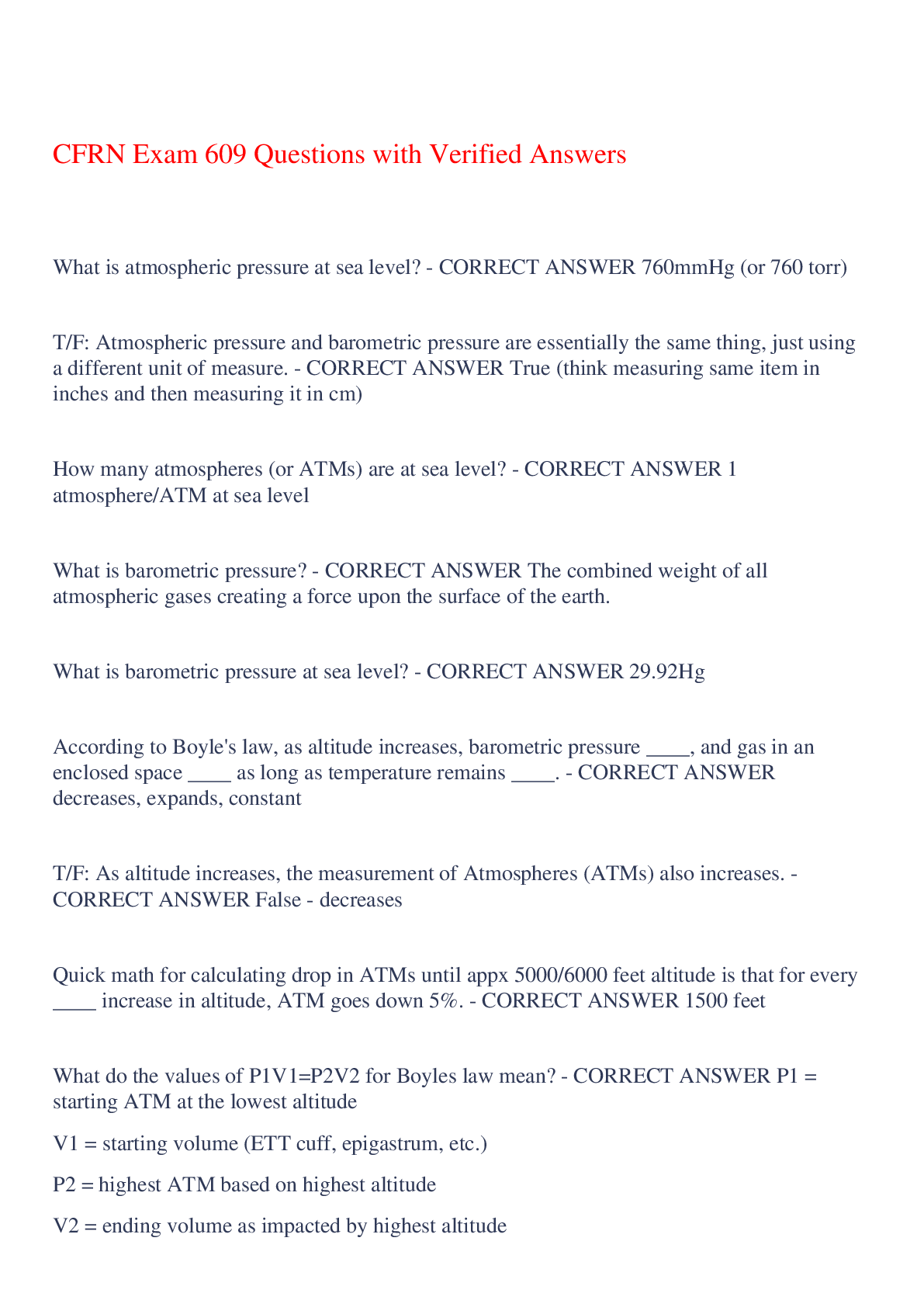
Reviews( 0 )
Document information
Connected school, study & course
About the document
Uploaded On
Nov 07, 2023
Number of pages
68
Written in
Additional information
This document has been written for:
Uploaded
Nov 07, 2023
Downloads
0
Views
100

